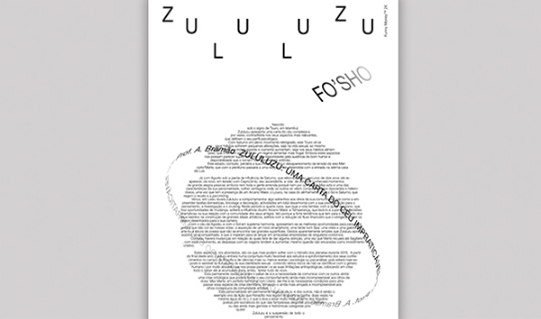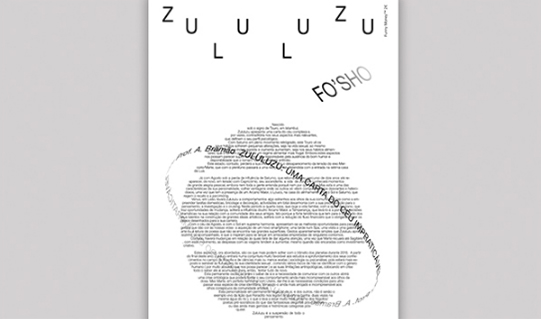After the success of Tropa-Fandanga, Teatro Praga returns to the revista à portuguesa with Bravo 2023! Obliged to follow the principle of permanent updating imposed by traditional revista theatre, in order to be closer to the present, Bravo 2023! makes it its theme. Its tight structure is used to draw an overview of the past year, putting forth a show that is an atlas of the most remarkable events of the year 2023. Performed in the fair theatres of Paris in the early 18th century, the first revista shows consisted of a burlesque and caricatured review of events and figures that had been prominent in the previous twelve months. This is the model that was imported to Portugal. Proving that “it has a soul and it won’t die”, the Teatro Praga’s Bravo 2023! closes the year with a joyful, raucous show to rattle the quietest spirits and stir the audience with a review that leads us sing songs and give life a standing ovation. A show of praise and commendations, of accidents, tragedies, laughter and criticism, that seeks to find the fairer way for troubled times, where pasts and geographies mix. The year is reviewed with a stumbling kick, to the sound of music to lift our spirits and with a text written by several hands, which makes us wish for the impossible, and which speaks of history, of what is near and far. The theatre once again rolls out the red carpet that takes us there. Bravo 2023! is a yearbook at the end of the year where anything can happen.
2024 | Re: Antigone
X
2024 | Re: Antigone
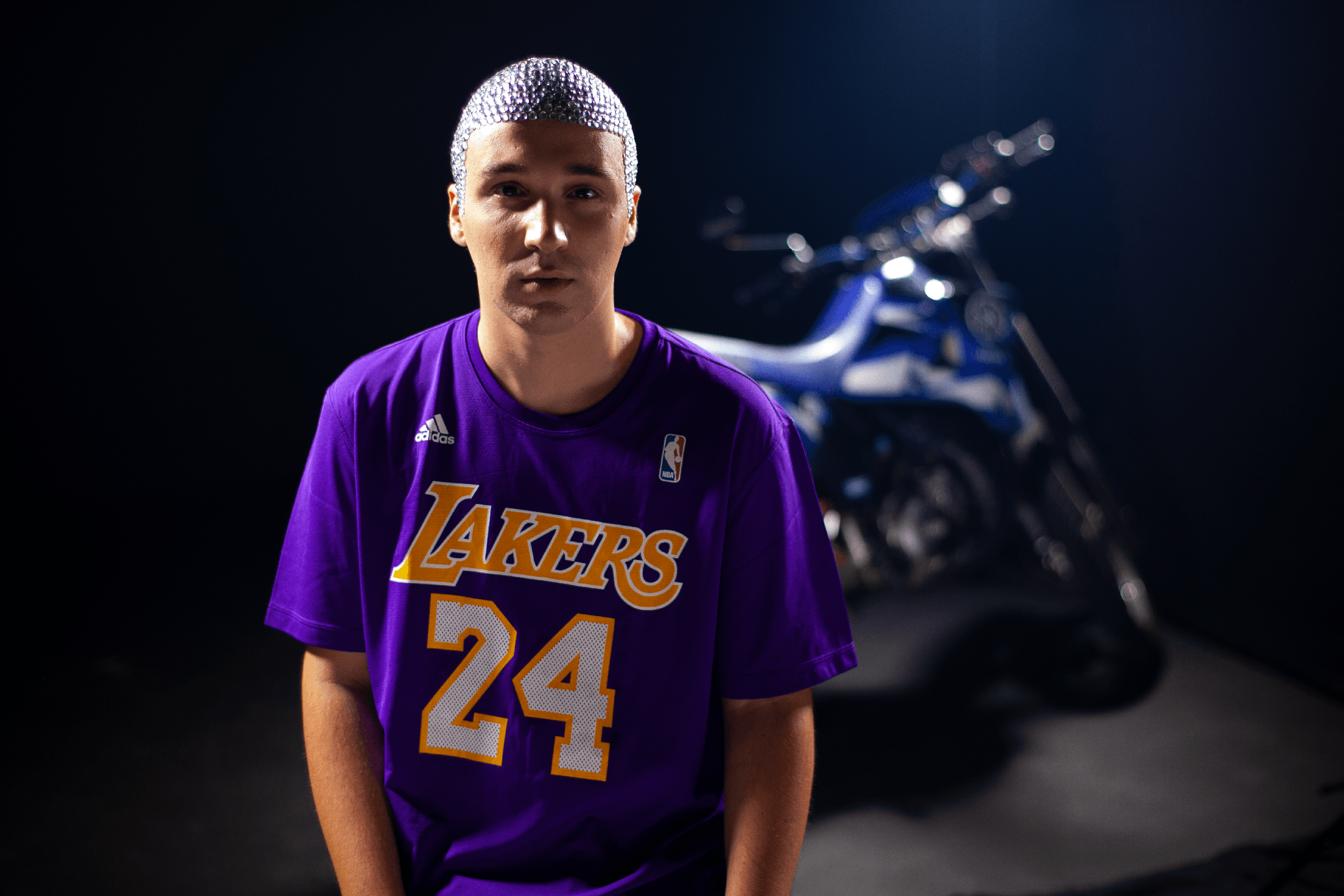
Seriously, I’m dead. I’m really dead.
Dead, dead, dead. I’m dead. I’m dead. I’m dead. I’m dead.
Absolutely dead. Dead from dead.
Deadly dead. Dead dead dead.
Antigone, immortalised by Sophocles, has been the protagonist of dramatic plays for centuries, from Kleist to Anouilh, from Cocteau to Júlio Dantas or António Pedro, as well as an artistic inspiration, from the visual arts to opera, and philosophical (Heidegger, Steiner, Lacan, Butler, Zizek, Kilomba, Honegger, etc.). Loaded with metaphors and categories, Antigone has been massacred by concepts carrying ideas of “good”, “justice”, “emancipation”, “utopia” or “desire”.
Re: Antigone is the opposite of this because it is not a challenge to the past but to the present. Or a reply to a past made up of unanswered questions, like an exchange of emails with no hope of return. A show that doesn’t try to produce anything, but makes its presence felt, saturates and disconcerts, in order to irritate. This means that RE: Antigone reacts to the allegory or the capture of the figure of Antigone for the benefit of updates, but also that it responds to an Art of “messages” and “about” by asking for a little time to be without being.
Re: Antigone kills Antigone, in every way she can think of, to give her the death she never had the right to.
A show by Teatro Praga
Created by: André e. Teodósio, J. M. Vieira Mendes
With: André e. Teodósio, Inês Vaz, Maria João Vaz, Paula Diogo, Paulo Pascoal
Set design: Tiago Alexandre
Light design: Joana Mário
Original Soundtrack: Miguel Lucas Mendes
Executive producer: Rita Pessoa
Production manager: Teresa Miguel
A co-production: São João National Theatre, Belém Cultural Centre Foundation
Acknowledgements: Pedro Faro, Filipe Heath, Isabel Moreira, Joana Sousa, Centro Auto Alfragide
2024 | Let’s Make a Song!
X
2024 | Let’s Make a Song!

Tribute to José Barata Moura by Alex D’Alva Teixeira
What is music made of? Are life and art different things? In 2021, as part of the Filo-Lisboa Festival at Teatro São Luiz, Teatro Praga premiered the children’s show Fazer uma Canção. The premise was simple: to talk about a philosopher, his life and musical work, paying tribute to him and singing his songs. Written by André e. Teodósio and performed by Alex D’Alva Teixeira, the result couldn’t have been more beautiful. We wander through the childhood songbook of the philosopher José Barata Moura, through his life story combined with the life story of Alex D’Alva Teixeira, who, from the Festival da Canção to his local parish, has sung everywhere. In between, we learn how to make a song. What is this fungagá anyway?! We sang ourselves hoarse. Making a song is a lesson in music, philosophy, politics and love. A tribute to a fundamental composer in the history of music for children through a contemporary musician like no other.
Music: Alex D’Alva Teixeira;
Texts: André e. Teodósio;
Set design: Teatro Praga;
Lighting design: Joana Mário
Co-production: Teatro Praga, A Casa da Cultura – Município da Marinha Grande and São Luiz Teatro Municipal
—
Length: 40 min.
M/6
—
Bookings: producao@teatropraga.com
2023 | BRAVO 2023!
X
2023 | BRAVO 2023!
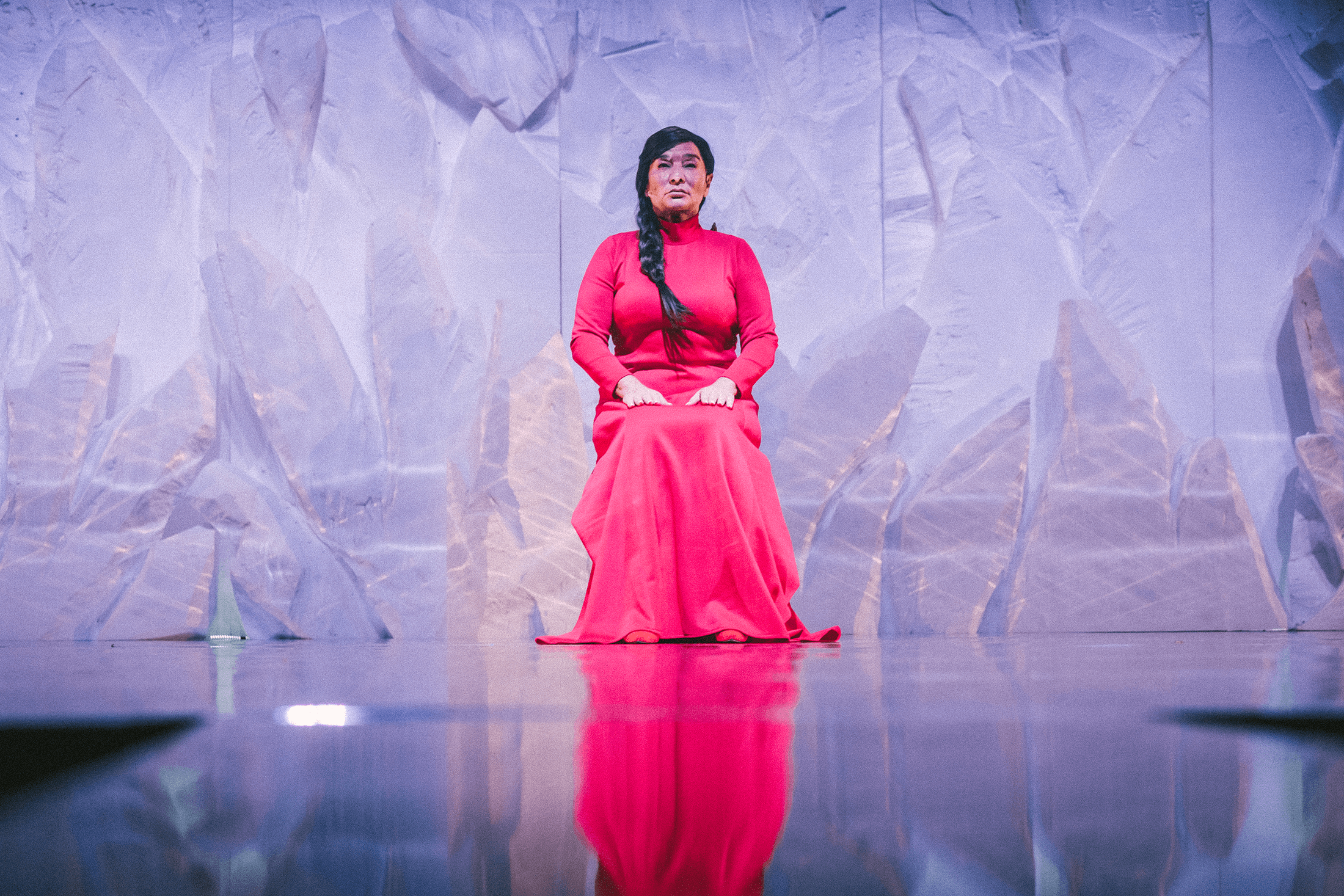
Interpretation and Co-creation: André e. Teodósio, André “Speedy” Garcia, Cláudia Jardim, David Mesquita, Diogo Bento, Guilherme Leal, Jenny Larrue, Joana Barrios, Joana Manuel, J.M. Vieira Mendes, Marina Mota, Sandra Rosado, Simão Telles e Tiago Vieira
Music: Moisés Fernandes (trumpet), João Cabrita (saxophone), Sofia Grácio (piano and synthesizers), Hayden Nóbrega (drums and transverse flute), Bernardo Fesch (bass) e Alex D’Alva Teixeira (voice and guitars)
Set design: João Pedro Vale and Nuno Alexandre Ferreira
Big screens: Adriana Proganó and Eugénia Mussa
Costumes: Joana Barrios
Original music: Pedro Mafama
Conductor, orchestration and musical direction: Alex D’Alva
Light Design: Daniel Worm
Sound design: Miguel Lucas Mendes
Costume making: Rosário Balbi, Paulo Julião, Jenny Larrue e Caio Guedes
Photography: Stage photography
Communication and Graphic Design: Afonso de Matos
Production Direction: Marisa F. Falcón
Executive Production: Rita Pessoa
Support: Copitec, El Corte Inglês, Griffe Hairstyle, Infraestruturas de Portugal (Sala do Rei), Lux, Marcha da Bica, Marcha de São Vicente, N&H Hotels, Studio 8, Teatro Nacional São Carlos
Acknowledgements: Abilio Leitão, Aida Tavares, Aleksandar Protic, Beatriz Carneiro, Bruno Santos, Carlos Malta, Carlos Roque, Cristina Gomes, Dino Alves, Fernanda Silva, Gonçalo Cerá, Helena Vaz Pereira, Jesse James, João Chaves, João Paulo Soares, Lúcia Azevedo, Lux Frágil, Manuel Tomé Romano, Maria Emanuel Albergaria, Milton Pereira, Mischa, Mitra, Nuno Nunes-Ferreira, Tiago Alexandre, Pedro Escara, Pedro Faro, Pedro Rodrigues, Pisão, Tiago Bartolomeu Costa
2023 | ÃO
X
2023 | ÃO

ÃO, a nasal diphthong specific to Portuguese, is a piece featuring choreographer Ana Rita Teodoro, musician João Neves and artist André e. Teodósio, together creating a sonic and sensory experience. Tripping on the sound of a diphthong that doesn’t trip off the tongue for non-native speakers, they intone sounds, words and melodies of original compositions, implicating tongue, lungs, skeleton, objects, images, feelings, and surroundings.
A performance by Teatro Praga
Created by André e. Teodósio com Ana Rita Teodoro and João Neves
Performers Ana Rita Teodoro, André e. Teodósio, Diogo Melo, João Neves
Sound Diogo Melo
Costumes Joana Barrios
Set design Horácio Frutuoso
Light design Joana Mário
Sound design Miguel Lucas Mendes
Communication Afonso Matos
Director of Production Marisa F. Falcón
Production assistant Rita Pessoa
With support from Estúdios Victor Córdon
Acknowledgments Softrock
Coproduced by Teatro do Bairro Alto
Photos by Carlos Pinto and Pedro Jafuno
—
Length | 1h10min
—
Bookings: producao@teatropraga.com
2022 | The Rite of Spring
X
2022 | The Rite of Spring
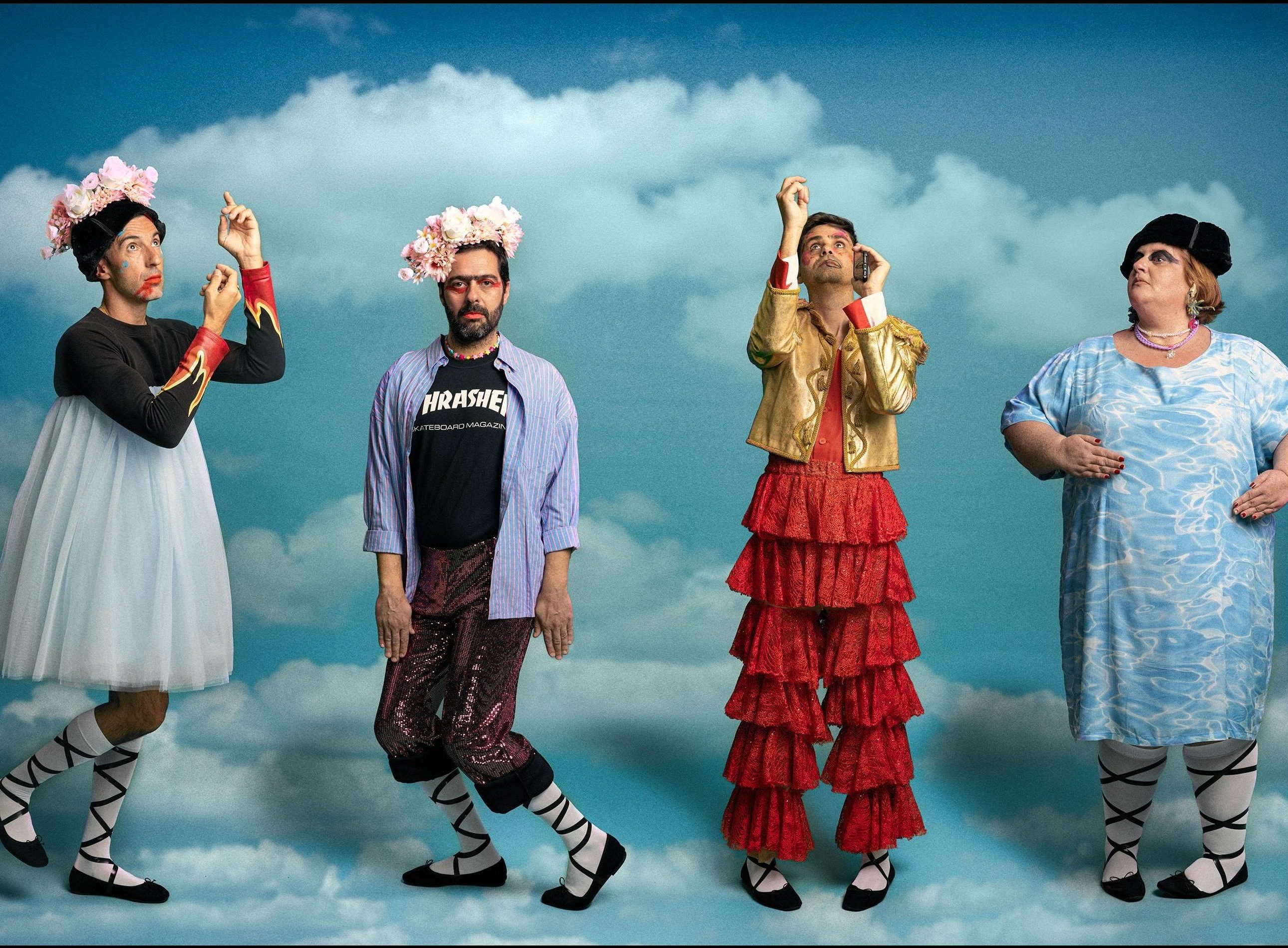
A Teatro Praga’s performance with the collaboration of the Metropolitan Orchestra.
Following the Shakespeare/Purcell trilogy presented between 2010 and 2019, Teatro Praga returns to the large-scale stages in partnership with the Metropolitan Symphonic Orchestra to present Stravinsky’s ballet, The Rite of Spring, originally choreographed by Nijinsky. Given that this piece is a milestone in the history of the performing arts, and bearing in mind its symbolic significance, Teatro Praga’s The Rite of Spring carries on the will to bring history to the stage and to understand its echoes today. A celebration of the planet and the place we inhabit, which degenerates into a sacrificial ritual, will serve as guiding principle to reflect upon the inextricable blend of existence, favouring a history of mutual influences. The strength of life, of spring, is also the strength of abandoning and renouncing to all sorts of bodies.
Teatro Praga | Orquestra Sinfónica Metropolitana (Lisbon) & Percussões da Metropolitana (Oporto)
Stravinsky A Sagração da Primavera
Pedro Neves Conductor
Co-production | Centro Cultural de Belém and Teatro Municipal do Porto
Conception | André e. Teodósio, Cláudia Jardim, Diogo Bento & J.M. Vieira Mendes
Musical Direction | Orquestra Sinfónica Metropolitana
Co-Creators and performers | Ana Tang, André “Speedy” Garcia, Cláudia Jardim, David Mesquita, Diogo Bento, Guilherme Leal, Maria João Vaz, Sani Dubois, Sandra Rosado, Tiago Vieira
Movement Support | Vânia Doutel Vaz
Stage Design | Joana Sousa
Costume Design | Joana Barrios
Set and costume design of the 3rd part | Adriana Proganó
Mask | Skull, by Maria João Vaz
Light Design | Daniel Worm D’Assumpção
Sound Design | Miguel Lucas Mendes
Video Design | André Godinho
3D Animation | S4RA
Video Operation and editing | Tatiana Ramos
Camera Operation | Carolina Abreu and Bárbara Valido Mau
Production Director | Marisa F. Falcón
Executive Production | Rita Pessoa
Communication | Mafalda Miranda Jacinto
Promotional Photography | Carlos Pinto
Stage Photography | Alípio Padilha
Support | Fit to Fit, Unfuel Mobility Solutions
Acknowledgements | Beatriz Carneiro, Carina Avelar, Catarina Sousa, Filipe Carneiro, Filipe Dominguez, Mata Hari, Mariana Sá Nogueira, Patrícia da Silva, Paula Fonseca, Paulo Almeida, Pedro Faro, Pedro Penim, Ricardo Costa, Rafael dos Santos, Vasco Araújo, Vau, Wagner Borges
Teatro Praga is an associated structure of O Espaço do Tempo, Montemor o Novo
Teatro Praga is a structure financed by the Government of Portugal | Direção Geral das Artes
—
Length: 1h40min
M/16
—
Bookings: producao@teatropraga.com
2021 | FATHERS & SONS
X
2021 | FATHERS & SONS
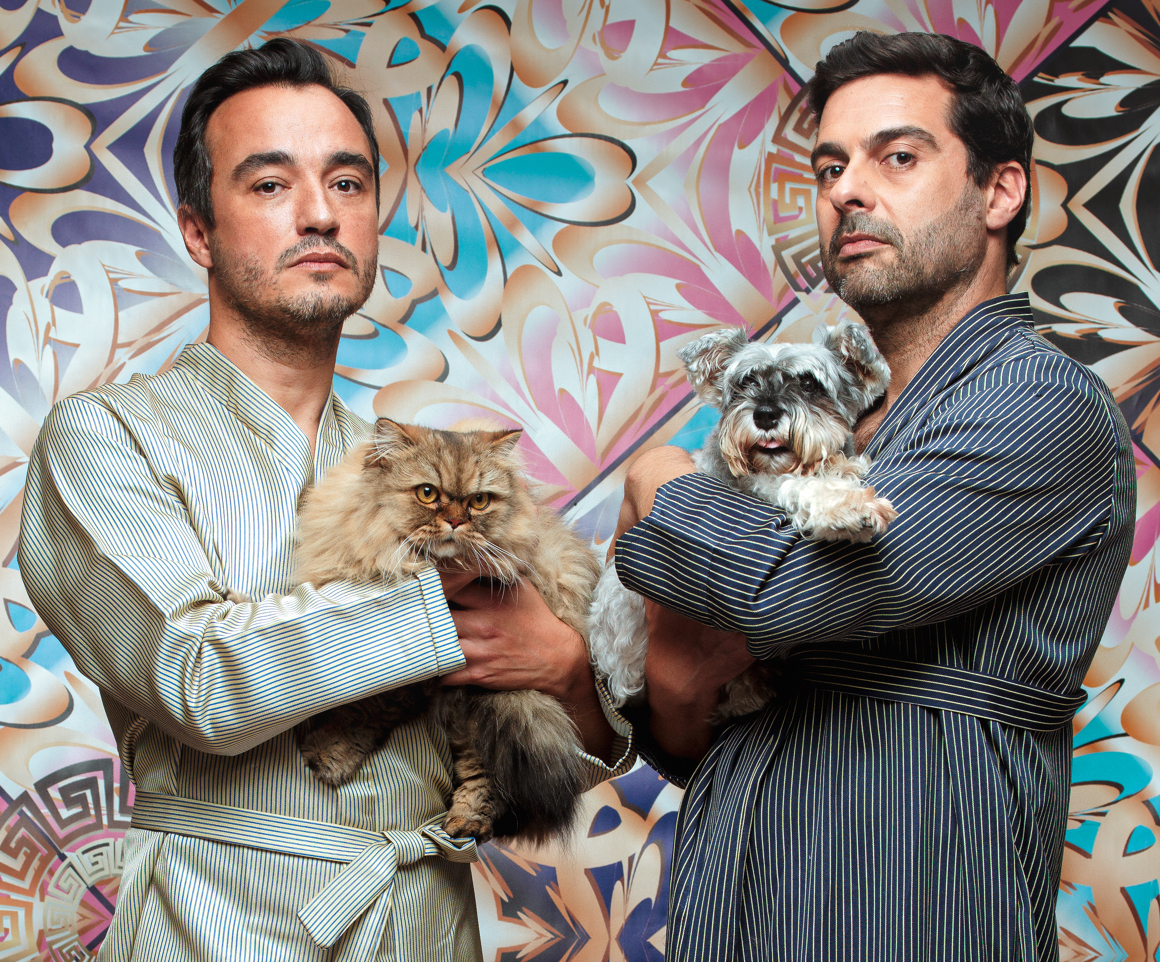
Continuing the dichotomy between autobiography and the creation of a fictional universe, Penim – who is intending to become a parent through the challenging process of surrogacy – seeks to nourish the debate on parenting and family, involving not only theatergoers but also the media, academia and civil society, expanding Fathers & Sons to a dimension that goes beyond the mere personal story.
.
Text and Staging Pedro Penim
Interpretation Ana Tang, Bernardo de Lacerda, David Costa, Diogo Bento, Hugo van der Ding, Joana Barrios, João Abreu, Pedro Penim and Rita Blanco
Trouble Olívia
Staging Assistant Bernardo de Lacerda
Scenario Joana Sousa
Costumes Joana Barrios
Vídeo Jorge Jácome
Light Design Daniel Worm d’Assumpção
Sound Miguel Lucas Mendes
Choreography Support Luiz Antunes
Master seamstress Rosário Balbi
Construction of doll António Vieira Imaginações Reborn
Production Management Daniela Ribeiro
Production Alexandra Baião
Digital Communication Mafalda Jacinto
Promocional photos Carlos Pinto
Co-production Teatro Praga, Teatro Nacional São João and São Luiz Teatro Municipal
Support Griffehairstyle, Hospital de Bonecas
Thanks to Alessandro Valera, André e. Teodósio, Cláudia Jardim, Cláudia Semedo, David Motta, Freddy, Jacinta, Joana Lopes, Joana Manuel, José Maria Vieira Mendes, Lúcia, Mariana Vieira, Mark Lowen, Mimi, Olívia, Pedro Batista, Sophie Lewis, Tiago Bartolomeu Costa e António Vieira / Artista Reborn – Imaginações Reborn
—
Length | 2h15 min.
M/16
—
.
2021 | INFO MANIAC
X
2021 | INFO MANIAC

In 2005, André e. Teodósio and J. M. Vieira Mendes met to create a show they called SUPER GORILA. If in 2005, in that performance, an artist asked the audience to help him blow up everything (the room, history, himself, beginnings, middle and ends), in 2021, the same artist is only interested in an unconditional dismantling.
INFO MANIAC is a remembrance in times of Plague, a voyage that goes from the histrionics who performed in Ancient Rome to the sound of the flute, to the quantum knowledge of our present. A one-man-show with a human who is rethinking his figurative entity in a day that contains every day and time.
An actor on stage speaks about himself, revealing everything, and reveals himself to be everything but him! To do so, he resorts to the repertoire of his experiences: poems, choreographies, recipes, stories and magic potions, as well as a kind of retrospective glossary of Teatro Praga’s work.
Moving on in disorder, INFO MANIAC is a guerrilla manual for modern times, it is an excuse for being-in-relation, a performance that thinks about everything in order to give and occupy space and time. And in the secret, we will know that we know nothing, but that the Everything knows everything about us.
–
Duration: 56 min. aprox.
Age Limit: +16
a performance by André e. Teodósio / Teatro Praga
Text André e. Teodósio e José Maria Vieira Mendes
Light Design Daniel Worm
Soundscape Miguel Lucas Mendes
Installation Bruno Bogarim
Photo by Carlos Pinto
Artistic Residency O Espaço do Tempo, Montemor-o-Novo
Support Polo Cultural das Gaivotas | Boavista / Câmara Municipal de Lisboa
Coproduction A Oficina / Centro Cultural Vila Flor, Teatro Viriato e Centro Cultural de Belém
Thanks to Ana Tang, Jazzy.pt, Joana Barrios, Paula Sá Nogueira, Pedro Faro, Rui Horta, Rita
Bookings: producao@teatropraga.com
2021 | MacBad
X
2021 | MacBad
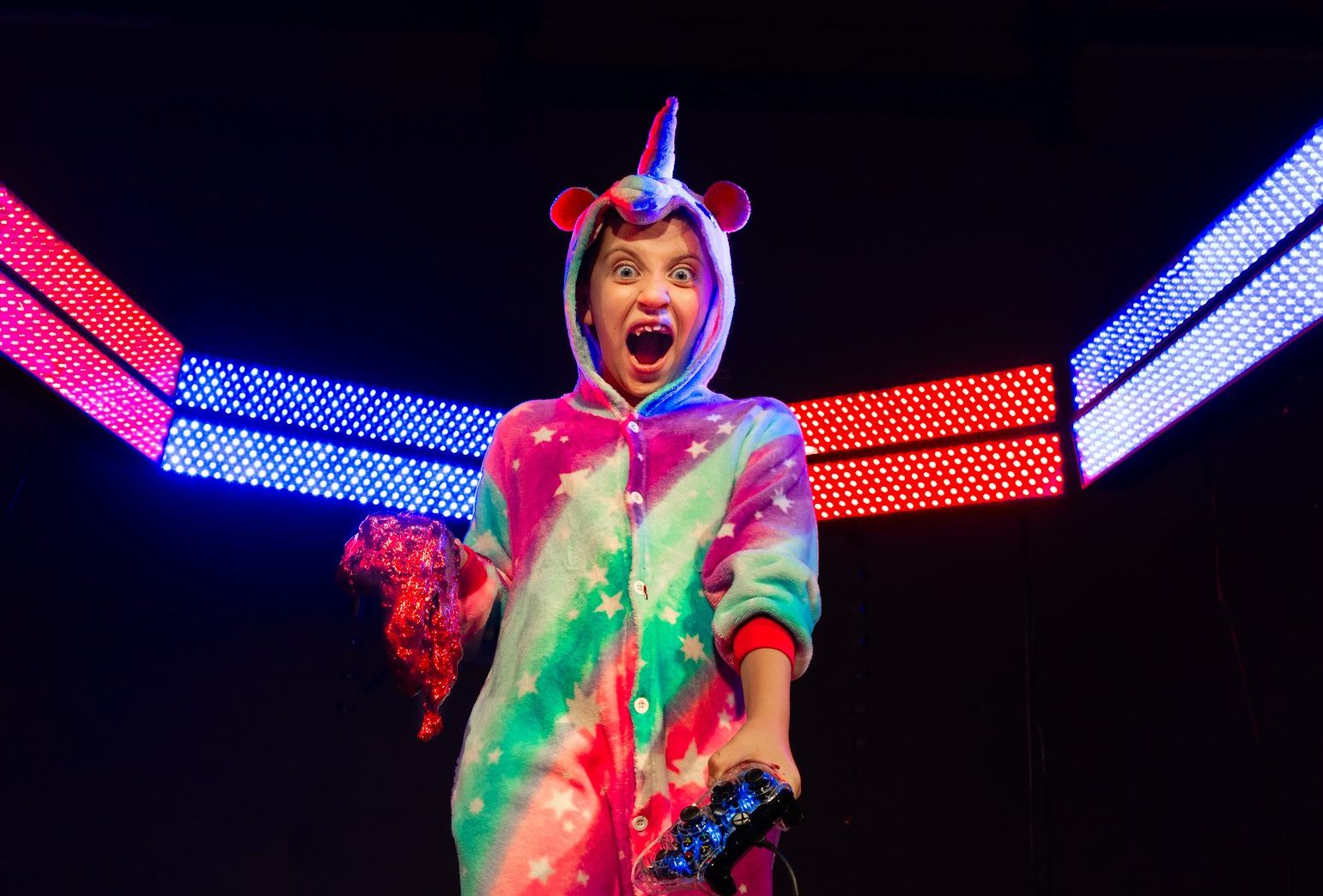
Text and creation Cláudia Jardim, Diogo Bento and Pedro Penim
Cast Cláudia Jardim and Diogo Bento
Game Design Filipe Baptista
Master seamstress Teresa Louro
Promocional Photography Alípio Padilha
Production Management Daniela Ribeiro
Production Alexandra Baião
Co-production LU.CA – Teatro Luís de Camões and Oficina / Centro Cultural Vila Flor
Thanks to Beatriz Carneiro, Catarino Campino, Maria Sequeira Mendes, Mariana Sá Nogueira, Rita Telhada, Ricardo Santos Costa, Ruben Maia
—
Length: 75 min.
M/6
—
Bookings: producao@teatropraga.com
.
2020 | SUPERNATURAL
X
2020 | SUPERNATURAL
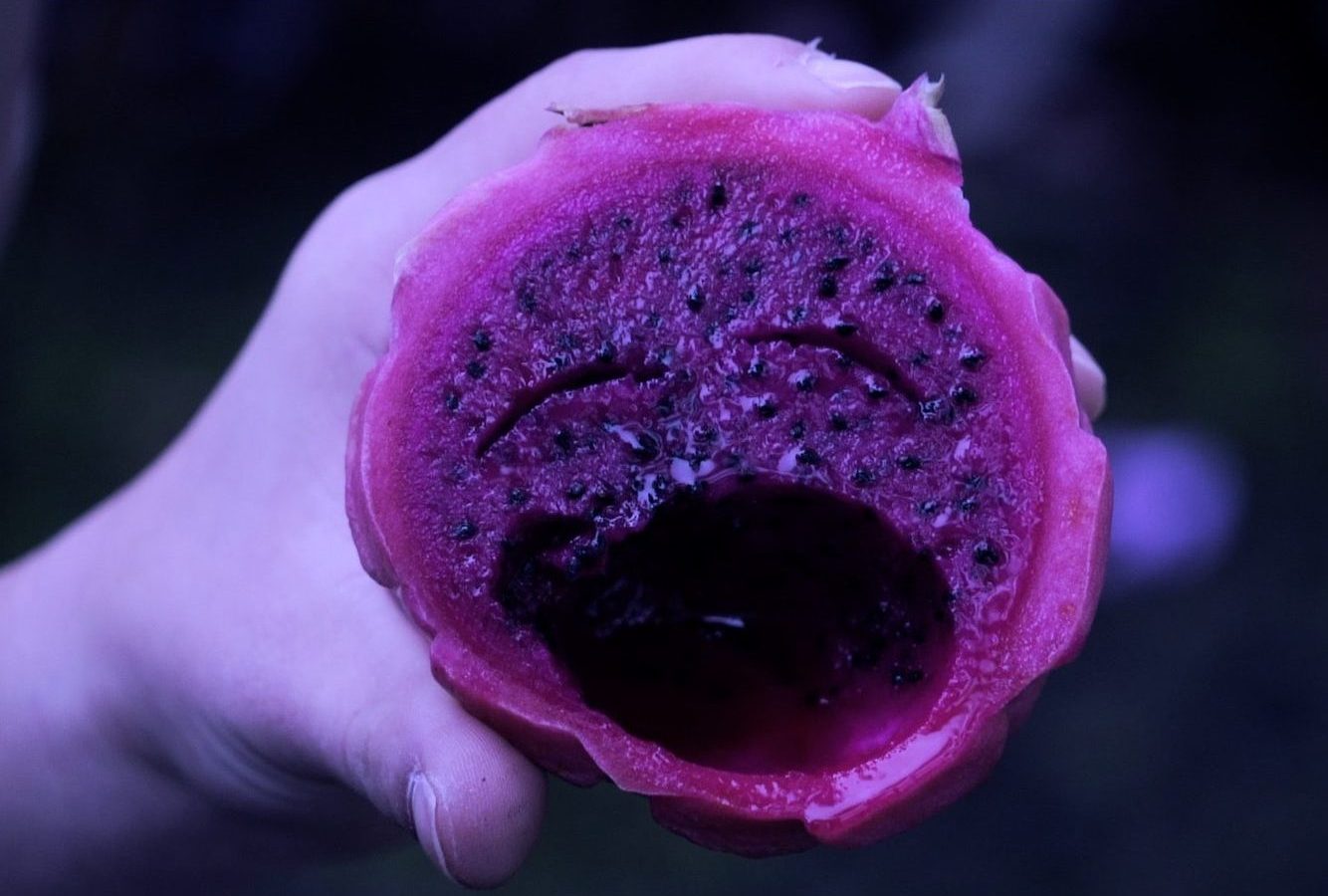
SUPERNATURAL is a performative film that talks and listens, that interferes and seeks out those who are beholding it. Its desire is to abandon the screen, to take a look at those who look at it, and listen to them, but also to be smelled and seen beyond what is being seen. This film is like voice or reason, aesthetics or human cuisine, i.e., it is a way to escape out of the prison of the “natural” contingencies by focusing its attention on the activity of the experience itself.
There are two ways of dealing with the “natural”: refusing it or expanding it. SUPERNATURAL expands, because it wants to occupy and then overcome and hyperbolize. In this expansion, the natural no longer exists, it loses its definition taking the place of the changing image of which the world is made.
SUPERNATURAL is a transcendent experience occurring outside of the body, of all bodies, but particularly of one’s own. It is like a super-power and, in this movement, it focuses on the image, a sensitive existence one intends to speak with. That is why this performative film aspires, in a speculative gesture, to activate an effect, a hypothetical relaxation, a sensory experience for those who are off the screen as if they were on it.
..
—
Residencies
1st – Funchal / Madeira, 25 January to 1 February 2020
2nd – Funchal e Calheta / Madeira, 18 to 31 October 2020
.
—
SUPERNATURAL is a project by Teatro Praga for Dançando com a Diferença, created in collaboration with its interpreters and the film director Jorge Jácome.
.
+ info: Dançando com a Diferença
2020 | INVERTED LANDSPACES
X
2020 | INVERTED LANDSPACES
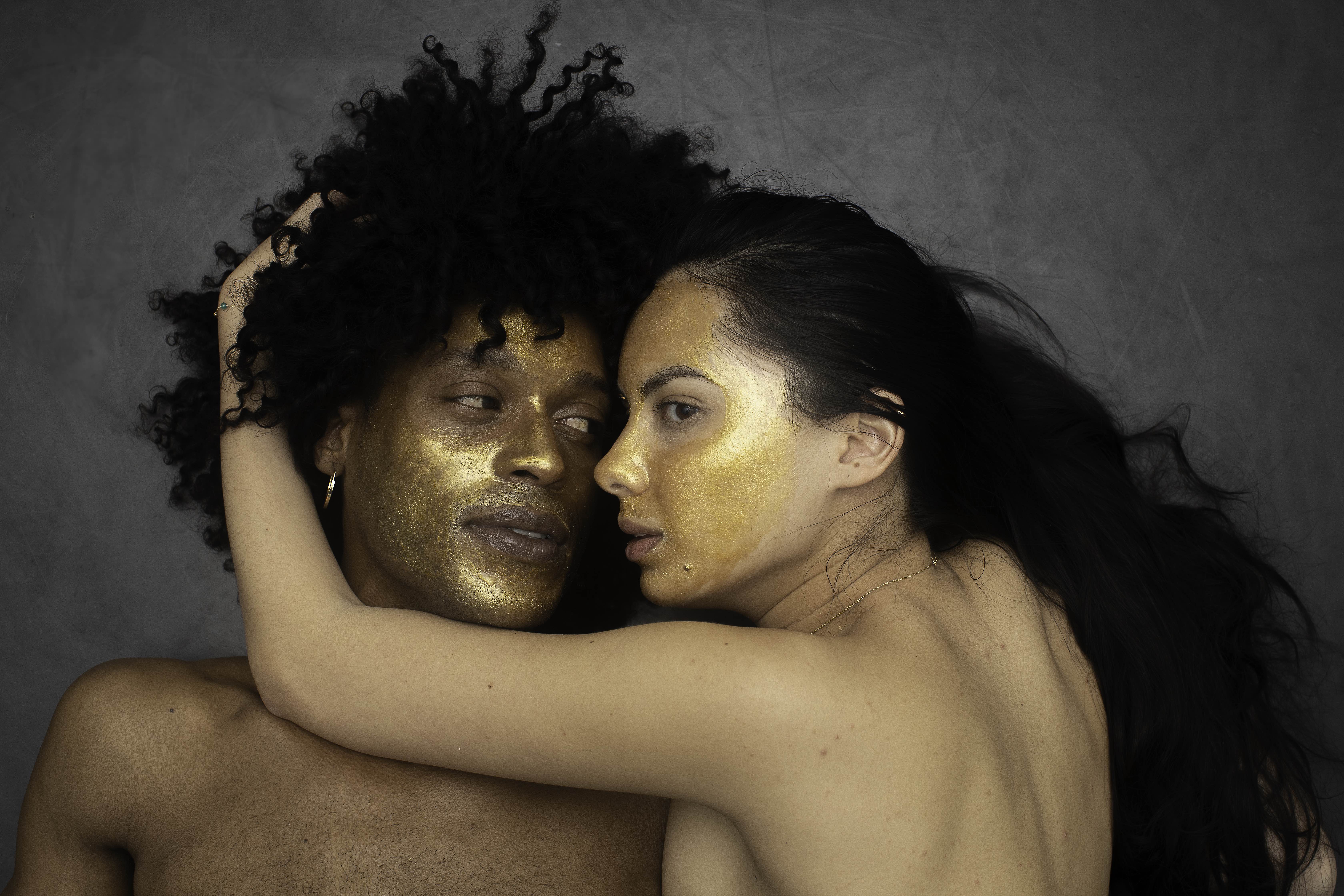
Inverted Landscapes, an exhibition-performance by André e. Teodósio/Teatro Praga that will be presented at Galeria Kunstraum Botschaft – Camões Berlim, a coproduction with Fundação EDP | MAAT and Embaixada de Portugal – Camões Berlim.
Starting from a connection between Lisbon and Berlin, Inverted Landscapes recovers the life of two figures of Portuguese performing arts, who change geographical destinations in search of the same artistic goal: Ruth Aswin, a German, who came to dance in Portugal in the 1930s, and her student, Valentim de Barros, who flees to Berlin in search of work and freedom. Inverted Landscapes is thus a tribute to the uprooting link that was common to the two artists of the historiography of these two countries, as well as to the attentive perception of two ways of living that have always had more history than geography.
—
A performance by André e. Teodósio
Performers Ana Tang, Aurora Pinho e Paulo Pascoal
Exhibition André e. Teodósio / Bruno Bogarim
Costumes Joana Barrios
Vídeos Jorge Jácome
Photo Alípio Padilha
Production Manager Daniela Ribeiro
Produção Executiva Alexandra Baião
Support Cão Solteiro, OPART / Estúdios Victor Córdon,
Thanks to Dra. Ana Barata, Dra. Andrea Martins, Anísio Franco, Dr. António Laginha / Centro de Dança de Oeiras, Bernardo Rocha, Biblioteca da Fundação Calouste Gulbenkian, Bruno Horta, Cláudia Belchior, Dra. Dalila Correia, Fundação Mário Soares, Goethe – Institut Portugal, Inês Grosso, João dos Santos Martins, João Pacheco, Jorge Jácome, Junta de Freguesia da Misericórdia, Maria Luísa Carles, Pedro Barateiro, Pedro Faro,Pedro Marques, Rui Lopes Graça, Sandro Resende
Coproduction Teatro Praga, Fundação EDP | MAAT and Embaixada de Portugal – Camões Berlim
—
Performance 11, 12 and 13 Sept 2020 at 6pm (On the occasion of the Gallery Weekend Berlin)
Exhibition Opening 11 September at 6pm
Until 16th Oct 2020 // 3ª – 6ª – 11am -1pm / 2.30pm – 5pm—
+ info: Instituto Camões Berlim
2020 | DOING IT
X
2020 | DOING IT
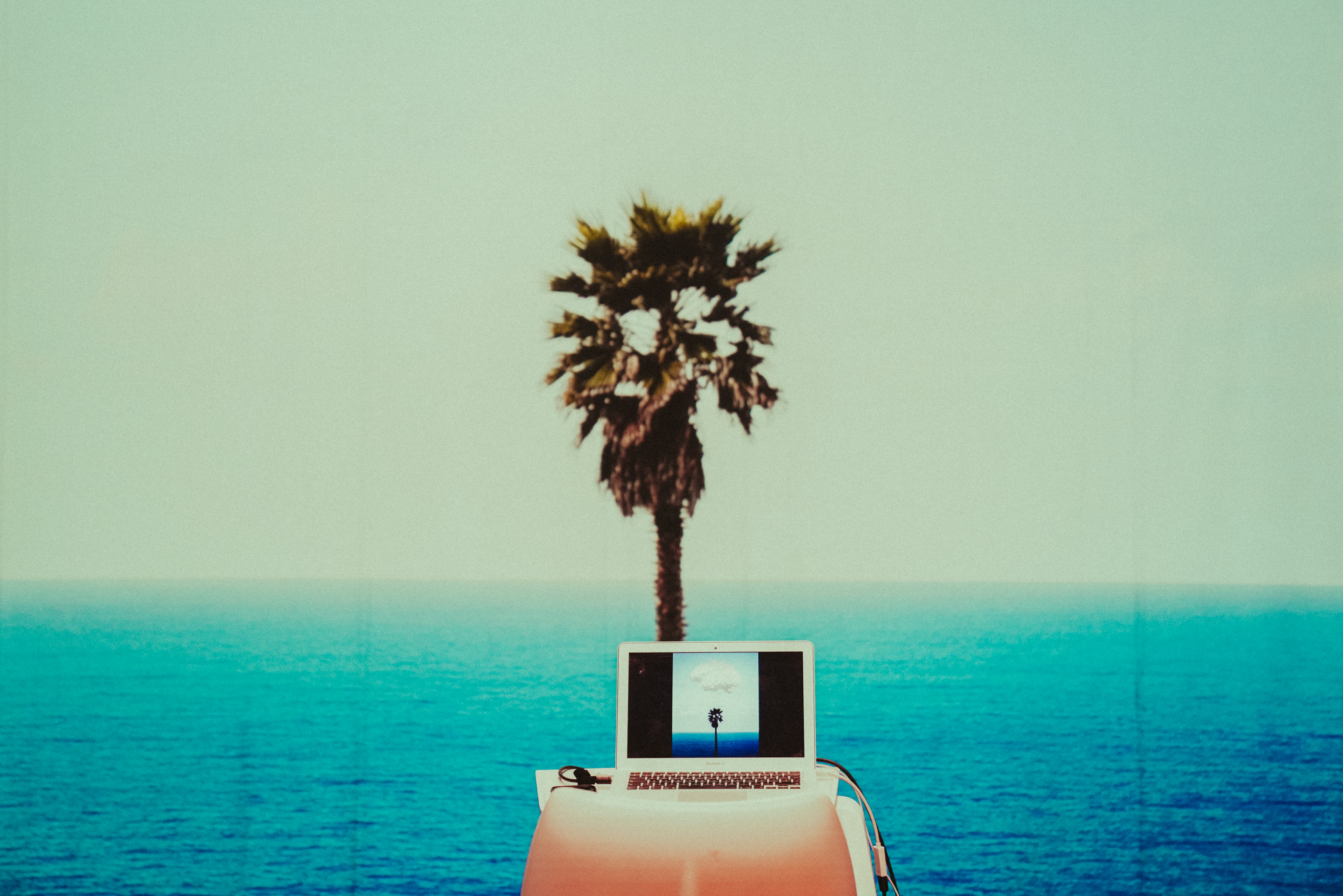
The actor and director Pedro Penim was invited by Francisco Frazão and Lola Arias to develop a lecture / performance for Mis Documentos cycle.
Mis Documentos is a concept idealized by Argentine playwright and director Lola Arias and has a minimal format: an artist on stage with their documents. One way to make visible researches that are sometimes lost in an unnamed folder on the computer.
In DOING IT, Pedro Penim confesses a secret passion that takes him very far across the sea of Internet. An innocent and obscure addiction that he never revealed before: his “island collection”. Pedro has been researching, collecting and systematizing information about several uninhabited and/or remote islands for a long time and this piece intends to stage a discourse that gives some clues about this interest in isolation, evasion and in the demarcation of space. In DOING IT, Pedro brings the spectators into the mind of someone who is constantly seeking and makes us think about our own obsessions. What do we do in secret on our computers when no one sees us?
—
Curator Mis Documents Lola Arias
Conference-Performance Pedro Penim / Teatro Praga
Dramaturgy: Bibiana Mendes Picado
Support for artistic residency Victor Córdon Studios
Photos: Ana Viotti
Coproduction Teatro do Bairro Alto and Teatro Praga
+ info: TBA
—
Duração | 45 min + 45 min
M/12
—
2019 | XTRÒRDINÁRIO
X
2019 | XTRÒRDINÁRIO
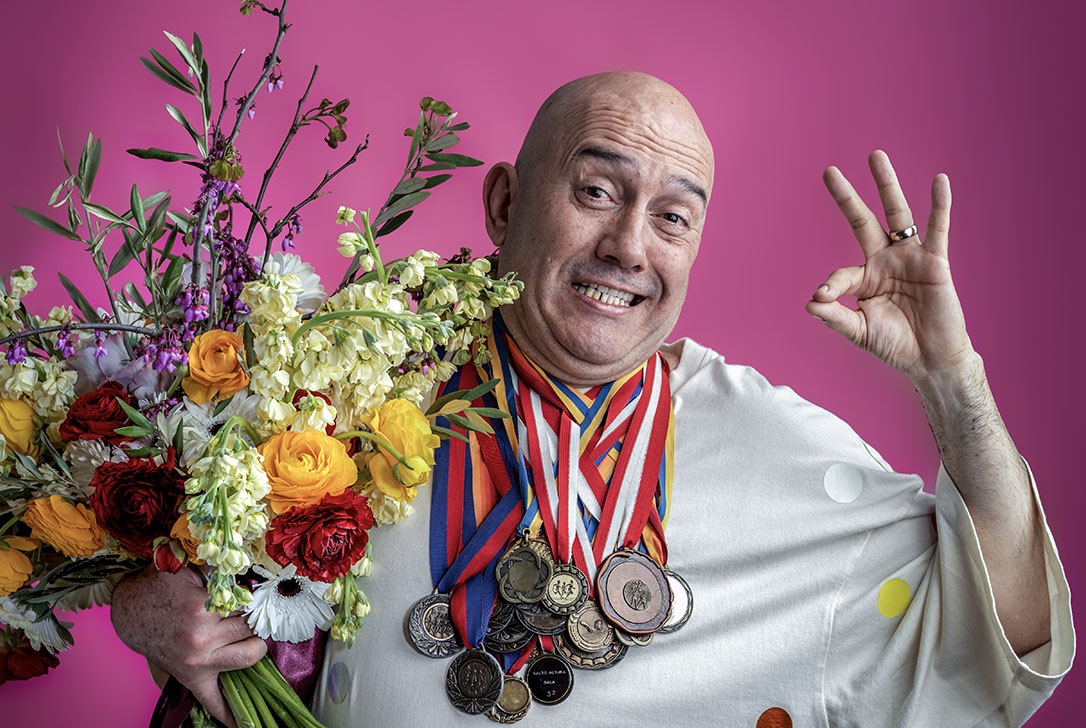
Challenged by São Luiz to create a performance which would celebrate the theatre’s 125th birthday, it was thought adequate to go through the musical history of a theatre room that lived during silent film, to cinema as we know it today, that saw Antoine and Sarah Bernahardt, witnessed fires and reconstructions and was rebaptised three times. As any other work by Teatro Praga, we revisit history with a critical eye, which allows us to go beyond the ephemeral commemoration, thus being able to think about the role of theatre in its time and in the city we live in.
A performance by Teatro Praga (André e. Teodósio, Cláudia Jardim, José Maria Vieira Mendes e Pedro Penim)
Cast | André e. Teodósio, Cláudia Jardim, Diogo Bento, Jenny Larrue, Joana Barrios, Joana Manuel, João Duarte Costa, José Raposo, João Caçador e Tiago Lila
Dancers | Adriano Vicente, Ana Moreno, Guilherme Leal e Jenny Larrue
Musical participation | Fado Bicha
Musical Direction | João Paulo Soares
Musicians | António Santos (Trombone/Bombardino), Filipe Coelho (Trompete/ Fliscorne), Francisco Cardoso (Bateria/Percussão), João Paulo Soares (Piano), Nuno Fernandes (Baixo/Contrabaixo), Paulo Bernardino (Clarinete/Saxofone)
Choreography | Luiz Antunes
Scenography | João Pedro Vale & Nuno Alexandre Ferreira
Scenography assistant | Joana Sousa
Video (creation and edition) | André Godinho
Costumes | Inês Ariana e Nuno Braz de Oliveira
Master Seamstress | Rosário Balbi
Sound design | Miguel Lucas Mendes
Light design | Daniel Worm d’Assumpção
Director assistant | Óscar Silva
Prompter | Lídia Muñoz
Head of production | Andreia Carneiro
Production | Alexandra Baião
Video recording | Jorge Jácome
Support to creation | Centro Cultural Dr. Magalhães Lima, ESTÚDIOS VICTOR CÓRDON/RESIDÊNCIAS ARTÍSTICAS
Support | Griffehairstyle, Guerlain e Museu Berardo
Acknowledgements | Bruno Bogarim, Câmara Municipal de Lisboa – Divisão de Ação Cultural, Carlos Pinto, Francisco Benevides, Ion Rotaru Flori, Isabel Alves, João Tinoco, Maryne Lanaro, Mariana Sá Nogueira, Marcha de Alfama, Mário Rocha, Museu Bernardo and José Berardo, Nuno Feist, Nuno Ferreira e Sérgio Godinho.
—
Length | 2h15
M/12
—
2019 | TIMON OF ATHENS
X
2019 | TIMON OF ATHENS

A Teatro Praga show with the musical collaboration of Ludovice Ensemble.
From William Shakespeare’s and Henry Purcell’s Timon Of Athens.
APEMANTUS I love thee better now than e’er I did.
TIMON I hate thee worse.
In 2010, the Teatro Praga presented at the CCB’s Great Auditorium A Midsummer Night’s Dream, a show that started from a semi-opera by Henry Purcell, The Fairy Queen, which in turn started with a text by Shakespeare , A Midsummer Night’s Dream. Three years later, in the same auditorium, Teatro Praga returned to Shakespeare and Purcell, appropriating another English musical composition written to animate a Thomas Shadwell adaptation of a Shakespeare play: The Tempest or The Haunted Island. Six years after The Tempest and nine years after A Midsummer Night’s Dream, Teatro Praga completes what has always been thought of as a trilogy.
Timon of Athens is a musical composition of Henry Purcell, dated 1694, written at the invitation of Thomas Shadwell, who once again adapted the text of Shakespeare (The Life of Timon of Athens) and commissioned the young Purcell a “masquerade” ). The masquerade was a form of entertainment practiced between members of the court and quite in vogue in the sixteenth and seventeenth centuries. It involved music, dance, song and representation, with elaborate scenographies and sumptuous costumes. The masqueraders were usually members of the court and sometimes the king himself, accompanied by actors and professional singers.
If in A Midsummer Night’s Dream one sought the place of power once occupied by the monarch, and how the figure of the programmer or curator plays a central role in the definition of the art worth; if The Tempest turned to the artist, to whom he plays, and to the relation of this with the medium (public, theater, written); the third moment of the trilogy, which follows the format of the Theater of Restoration, should focus on the link between art and capitalism, moving towards a progressive abandonment of objects, concretization and sharing and approaching an individualistic, to generate capital without producing material. Timon of Athens from the Teatro Praga goes looking for the best way to end it.
Creation | Teatro Praga (André e. Teodósio, Cláudia Jardim, José Maria Vieira Mendes and Pedro Penim)
Direction Ludovice Ensemble | Fernando Miguel Jalôto
Text | José Maria Vieira Mendes
Cast | André e.Teodósio, Cláudia Jardim, David Mesquita, Diogo Bento, Joana Barrios, João Abreu, Marcello Urgeghe, Patrícia da Silva and Pedro Penim
Singers | Ana Quintans (Cupid [soprano]), Joana Seara (Nymph [soprano]), André Baleiro (Baucus [barítono]), Fernando Guimarães (Baucus Follower I [tenor]) and André Lacerda (Baucus Follower II [tenor]).
Orchestra | Stephen Mason (Trombeta), Joana Amorim (Flautas), Pedro Lopes e Castro (Oboé e Flautas), Andreia Carvalho (Oboé), José Rodrigues Gomes (Fagote e Flautas), Sabine Stoffer (Concertino/Violino solo), Patrizio Germone (Violino solo), César Nogueira (Violino), Flávio Aldo (Violino), Álvaro Pinto (Violino), Denys Stetsenko (Violino), Lúcio Studer (Viola), Sofia Diniz (Viola da Gamba), Marta Vicente (Grande Viola da Gamba), Vinícius Perez (Tiorba/Guitarra), Fernando Miguel Jalôto (Cravo)
Artistic support | Vasco Araújo
Video (concept & edition) | André Godinho
Cameras | Cristina Pina, Eduardo Jorge
Scenography | Joana Sousa
Costume design | Joana Barrios
Master seamstress | Rosário Balbi
Sound design | Miguel Lucas Mendes
Light design | Daniel Worm d’Assumpção
Head of production | Andreia Carneiro
Production | Alexandra Baião
Video recording | Mário Negrão
Support | GriffeHairStyle, GUERLAIN
Acknowledgements | Afonso Palitos, André Sá Fonseca, Carlos Pinto, Céu Barrios, Bruno Bogarim, Cão Solteiro, Baião Family, Filipe Dominguez, Francisco Benevides, Helena Vaz Pereira, Irmã Lúcia, João Pedro Vale e Nuno Alexandre Ferreira, José Barros, Junta de Freguesia da Misericórdia, Mercedes and Álvaro, Michał Dobrucki, Miguel and Maria, Nuno Ferreira, Restart, Ricardo Casal, Ricardo, Rita, Jorge and David, Rua das Gaivotas 6, Rúben Santos, Rúben Silva and Vasco Araújo
—
Length | 1h40
M/12
—
2018 | WORST OF
X
2018 | WORST OF
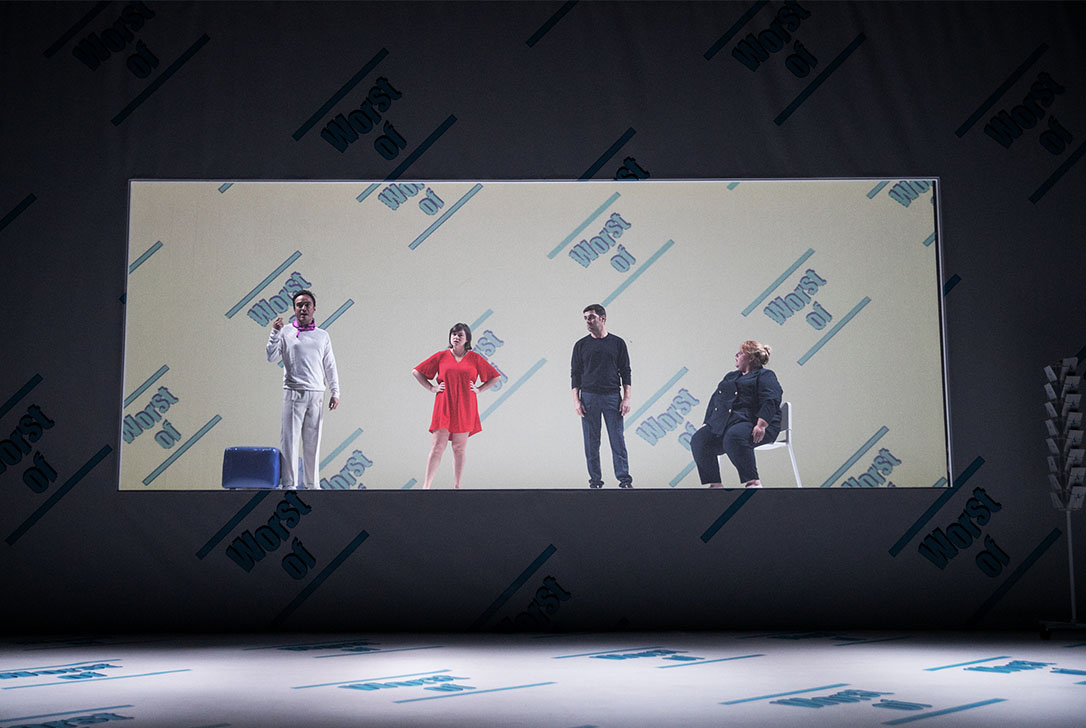
It is not uncommon, over time, to hear the opinion that there is a chronic delay in Portuguese theater, when compared with other artistic mediums. WORST OF takes a look at the history of the national theater through the lense of this opinion. In order to that, a “best of” of Portuguese actors will give voice to complaints, with the help of examples that confirm the discouragement. WORST OF is a shitty celebration.
A performance by Teatro Praga
Texts by | Gil Vicente, Correia Garção, Almeida Garrett, Francisco Gomes de Amorim, Júlio Dantas, Alfredo Cortês, André Brun, Luís de Sttau Monteiro, Bernardo Santareno e J. M. Vieira Mendes
Cast | Cláudia Jardim, Diogo Bento, Márcia Breia, Patrícia da Silva, Pedro Penim, Rogério Samora, São José Correia e Vítor Silva Costa
Scenography | Joana Sousa
Costume design | Joana Barrios
Light design | Daniel Worm d’Assumpção
Sound design | Miguel Lucas Mendes
Video | André Godinho
Photography | Filipe Pereira / Teatro Nacional D. Maria II, Alípio Padilha
Director assistant | Pedro Barreiro
Wardrobe assistant | Andreia Mayer
Stage assistant | Tiago Barbosa, Victor Gonçalves
Head of production | Andreia Carneiro
Production | Alexandra Baião
Coproduction | TNDM II, Teatro Municipal do Porto – Rivoli
Support | Infraestruturas de Portugal, Antónia Rosa, Griffehairstyle, L’Oréal, Lux Frágil, Storytailors: João Branco e Luís Sanchez, Sumol + Compal, Teatradançando, Teatro do Bairro, Teatro Experimental de Cascais, Teatro Nacional de São Carlos, Vicente Trindad
—
Duration | 2h10 (w/ break)
M/+12
—
2018 | 2018
X
2018 | 2018
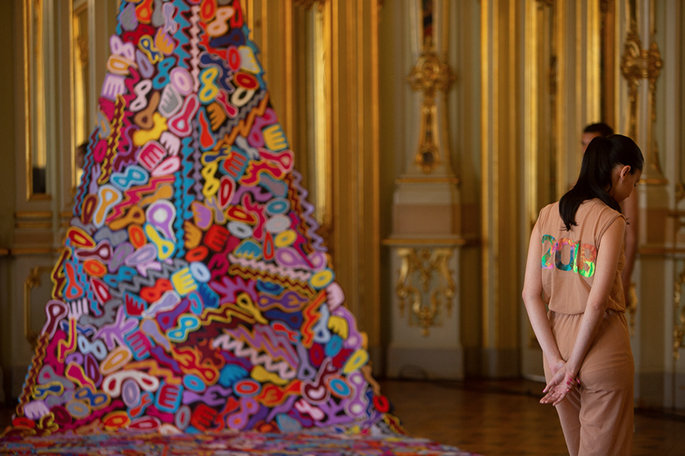
“2018″, a performance by Teatro Praga, reactivates some interrogations as a way to find alternative paths to the complex historiography of the performing arts.
Acknowledging that the presence of choreographers Fokine and Massine, the work of modernist plastic artists, the vitality of the dancer Nijinsky to the orientalising sound of Rimsky-Korsakov or Tchaikovsky unleashed a certain modernity in Portugal, “2018” establishes a formal distance by resourcing to the same artistic strategies from which it tries to distance itself.
Man as the first figure in a ballet, expression and abandonment of the choreographic vocabulary as a norm, the beginning of a collaborative work, the fusion of popular with elite culture, nationalist interest, the construction of pieces of a single idea and the background painted as iconographic strategy, characteristics that are transversal to the work of the Russian Ballets, also structure the performance. But this time in an unpredictable way.
In “2018”, the background has drops and everything becomes the foreground. And in this unfettered space, the performers both borrow money and receive flowers as they question, whether they give space to sound or objects, either they dance or do the opposite or make room to other unproductive sensory aspects for the pleasure of doing so.
A performance by André e. Teodósio/Teatro Praga
Cast | Ana Tang, Adriano Vicente e Aurora Pinho
Scenography | Jody Paulsen
Sound design | Violet
Head of production | Andreia Carneiro
Production | Alexandra Baião
Support | CPAI, Presidência do Conselho de Ministros – Div. De Relações Públicas e Apoio ao Conselho de Ministros ( Drª Isabel Tadeu)
This performance took place within the exhibition programme “The Ballets Russes: Modernity after Diaghilev”
Organizing institutions | The Lisbon Consortium/Universidade Católica Portuguesa, Museu Nacional do Teatro e da Dança, Fundação Millennium BCP
Comissary | Isabel Capeloa Gil
Scientific comissary | Isabel Capeloa Gil, José Carlos Alvarez, Nuno Crespo, Paulo Campos Pinto
Curated by | Isabel Capeloa Gil, José Carlos Alvarez, Nuno Crespo
—
Length | 60min
M/16
—
2018 | JÂNGAL
X
2018 | JÂNGAL
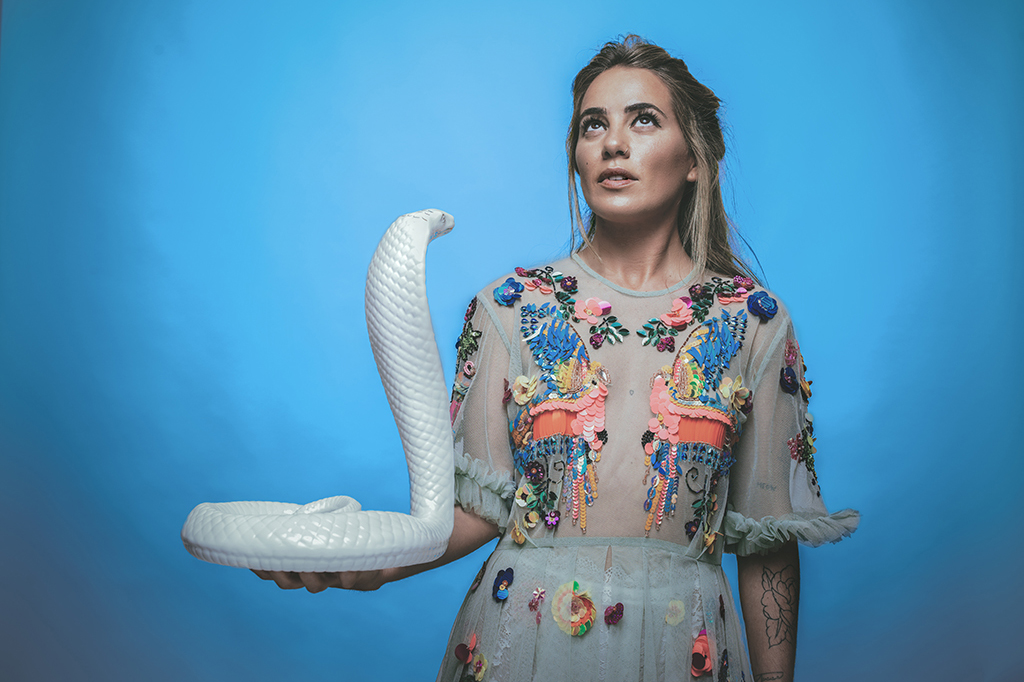
The underground is alive, the air is full of metal, there is existence everywhere in this jungle we call JÂNGAL.
The place where this performance takes place is a mythological room made of earth’s various territories, where Teatro Praga will try to create new ontologies that no longer reflect the world nor mimic it, but instead try to speculate on it. In JÂNGAL we all have the right to enjoy the chaos, the horror and the urban jungle provided by an imagery of science fiction mixed with Gaia’s underground minerals and zombies. It’s like Beckett’s play Endgame: “We’re on Earth. There’s no cure for that”.
JÂNGAL opens a space of experiences, where we wonder over a soundscape and sensory atmosphere created by the Portuguese composer Violet and the great Portuguese Fado singer Gisela João. JÂNGAL inspires a feeling of tranquil passivity, it’s a holistic show that tries to stay with the trouble, accepting our mortality entwined in myriad unfinished configurations of places, times, matters and meanings.
A performance by Teatro Praga (André e. Teodósio, Cláudia Jardim, José Maria Vieira Mendes e Pedro Penim)
Cast | André e. Teodósio, Cláudia Jardim, Jenny Larue, Joana Barrios, João Abreu and a participation of a portuguese singer | Gisela João
Scenography | Bruno Bogarim
Costume design | Joana Barrios
Music | Violet
Light design | Daniel Worm d’Assumpção
Sound design | Miguel Lucas Mendes
Video | André Godinho
Head of production | Andreia Carneiro
Production | Alexandra Baião
Co-production | São Luiz Teatro Municipal / Thêatre de la Ville / Teatro Municipal do Porto – Rivoli.Campo Alegre
Photography | Alípio Padilha
—
Length | 75min
M/16
—
2018 | CONUNDRUM
X
2018 | CONUNDRUM
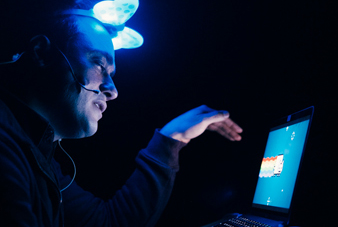
CONUNDRUM is a spoken loop built from Walt Whitman and Emily Dickinson, Jussi Parikka, Grada Kilomba and computer manuals, that proposes fun and desire as an open-source structure, fundamental to get out of the frame.
CONUNDRUM is an intricate problem that is difficult to deal with; it is a question that has only a conjectural answer; it’s a riddle. In this performance, the dark path of loneliness evidences the daily in-between experience of being and living both as a ghost and a monster. A performer, metamorphosing fandoms, sings a song to a cute cat. The cat may be the political activist, an aggregated extension of the raw materials of earth that is able to melt itself with meatspace, disrupting the legitimacy of the preponderant. Space and sound become pleasure principle capsules for an affect that’s transforming itself.
CONUNDRUM thinks on subjectivity, community, politics and struggles involving ecological and queer agendas.
2017 | ( )
X
2017 | ( )
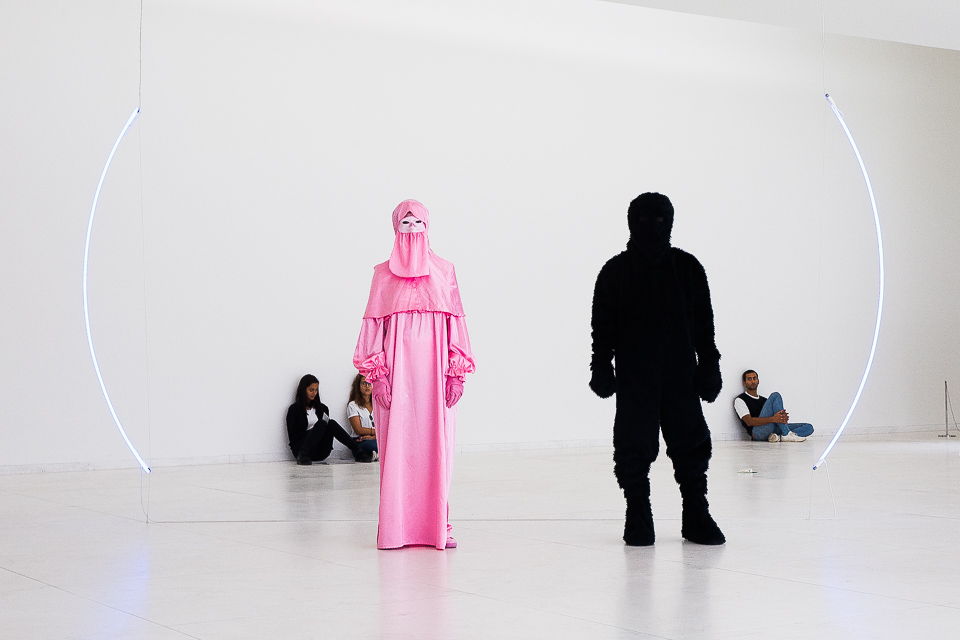
Throughout its work, the collective Praga has critiqued identity from various and different perspectives, not only in relation to its principal artistic medium – the “theatre” – but also in relation to ideas of person, body, doing or object. “( )” is a durational performance that provides continuity to this activity, now in the framework of the system of visibility of the museum.
The museum space, despite its multiple possibilities, tends towards the structured as a reservoir of ontological confirmation, thereby contributing to convergence towards oneness. In this space – that carries with it contemporary diagnosis that portrays the museum as an institution of capture and formation – that is self-naturalised as a safe-space, and that converges toward oneness, throughout “( )” the performers activate experiences of other spaces, times and modalities, appropriating the colonial insult and spawning new non-figurate sculptures and transverse abstractions that are as real as anything else.
“( )” is a place of desired landscapes, of other body-objects and their relations. It concerns non-normativity as a possibility. A poem of waiting, a position to which all non-preferential forms are relegated, in which a tourist presentation is exploited so as to claim invisibilities, experiences, changes and ephemerality. In “( )”, the poetics of un-being, of unbecoming, and residual hermeneutics engender truths, ontological provinces, and fields of knowledge that have been disqualified due to there unconsolidated approaches.
—
A performance by Teatro Praga / André e. Teodósio
Cast | Ana Tang, Aurora Pinho, Joana Barrios, Paulo Pascoal
Objects | Teatro Praga / Bruno Bogarim
Head of production | Andreia Carneiro
Production | Alexandra Baião
Photography | Alípio Padilha
Acknowledgements | Pedro Barateiro, Bárbara Falcão Fernandes, Vasco Araújo, José Nunes e Cátia Pinheiro, Pedro Antunes, Salomé Lamas, Joana Gusmão, Jorge Jácome, Mariana Sá Nogueira, Joana Dilão, João Pedro Vale e Nuno Alexandre Ferreira, Pedro Gomes, Pólo Cultural das Gaivotas | Boavista
—
Length | 5h
M/16
2017 | BEFORE
X
2017 | BEFORE
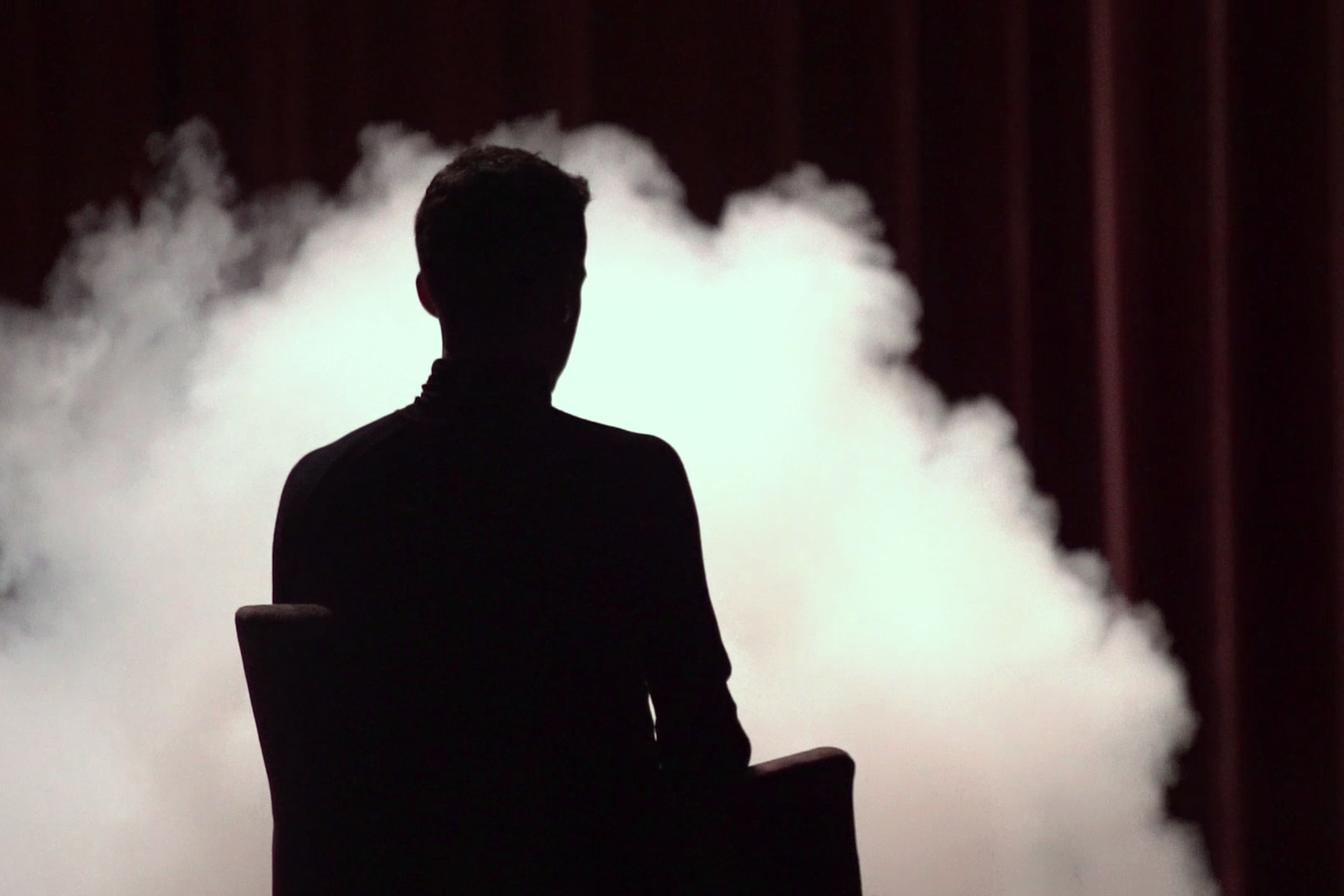
Before is a small jewel in new Portuguese dramaturgy. Recently presented at ISKV Tiyatro Festivali – Istanbul, Théâtre de la Ville in Paris and Barcelona’s Hiroshima, Pedro Penim’s text approaches with irony and humor, the feeling of saudade, the longing of the past.
Presented as an “atlas of melancholies”, the performance identifies here and there across Europe a sort of persistent awkwardness related to very ancient events. Has our past really been so “glorious” once? And how far back should we trace this “before”?
Before speaks about the yearning for a return to a past time perceived as glorious and desirable when facing a painful present. This disease, shared by many civilizations throughout history, always diagnoses the end of an era.
In order to build this diagnosis, Pedro Penim dares to bring face to face a tyrannosaurus and a pretty skeptical post-modern psychoanalyst. A hilarious and bitter dialogue offering “food for thought” about the future of our civilizations and their propensity to nurture ghosts and mythologies of fallen empires.
The play was recently adapted to film (“Past Perfect”) by the director Jorge Jácome (also responsible for the videos of the performance) and was part of the official selection of Berlinale 2019, New Directors / New Films 2019 at MoMA – New York and Hong Kong International Film Festival 2019, a.o.
—
Text, artistic direction and performance | Pedro Penim / Teatro Praga
Cast | Bernardo de Lacerda, Vítor Silva Costa and Pedro Penim
Light design | Rui Monteiro
Head of production | Andreia Carneiro
General assistance and executive production | Bernardo de Lacerda
Production | Alexandra Baião
Co-production | DeVIR / CAPa (for the 3rd edition of “Encontros do DeVIR” Festival) , Temps d’images
Video | Jorge Jácome
Photography | Alípio Padilha
—
Length | 60min
M/12
—
2017 | SPRING AWAKENING, TRAGEDY OF CHILDHOOD
X
2017 | SPRING AWAKENING, TRAGEDY OF CHILDHOOD
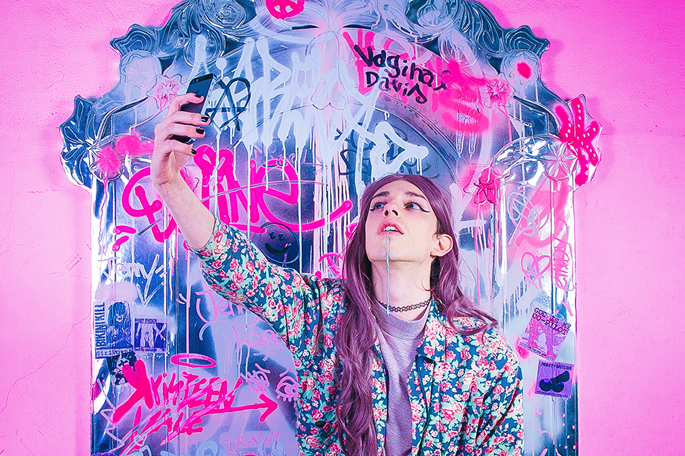
Spring Awakening, Frank Wedekind’s well known play written in 1891, deals with a group of adolescents in conflict with a conservative and moralistic society. The cruelty and love among pairs, the generation conflict, suicide, despair, are some of the main themes chosen by the interpretative tradition of this text.
By invitation of Centro Cultural de Belém, Teatro Praga returns to a classic of dramatic literature in order to inscribe, in a text and on the theatrical canon, those who are excluded by a so called representative theatre. We intend to work the lyrical expressionism of a shapeless adolescence, with its own language that tries to get away from a logic that divides reality in cynical and sincere or poetic and rational. Our approach will try to look beyond dualisms and build a reality that tackles invisibility and puts one in contact with a certain strangeness.
Spring Awakening will be occupied by a puberty that deceits “nature”, that refuses the subjection of one body to another, the construction of identities, and takes hold of an emancipatory rite that tries to defy all traditional standardizations. A place where it is required for several languages to coexist, where references are lost and reconstructed, where despair is life and suicide means victory. It is a performance that follows a demand of a humanity to be invented.
A performance by | Teatro Praga
Text | Frank Wedekind with translation by José Maria Vieira Mendes
Cast | André e. Teodósio, Cláudia Jardim, Diogo Bento, Patrícia da Silva, Pedro Zegre Penim e com Cláudio Fernandes, Odete Ferreira, João Abreu, Mafalda Banquart, Óscar Silva, Rafaela Jacinto, Sara Leite e Xana Novais
Light design | Daniel Worm D’Assumpção
Set design | Bárbara Falcão Fernandes
Original score and Sound design | Miguel Lucas Mendes
Costume design | Joana Barrios and Mestre Costureira Rosário Balbi
Photography | Alípio Padilha
Head of production | Bruno Reis, Andreia Carneiro
Production assistant | Alexandra Baião
Executive production | Bernardo de Lacerda
Co-produciton | Teatro Praga, Centro Cultural de Belém, Teatro Nacional São João e Teatro Viriato
Artistic residency and premiere | 23 Milhas – Casa Cultura Ílhavo
—
Length | 2h10
M/16
—
2016 | ZULULUZU
X
2016 | ZULULUZU
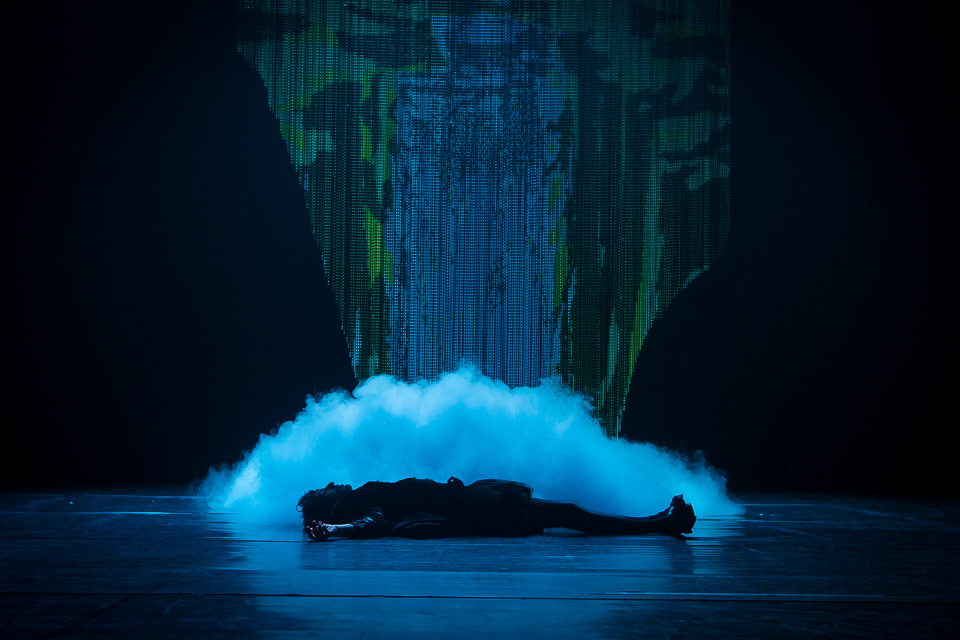
From the life and work of Fernando Pessoa.
Life is what we make of it. Travel is the traveller. What we see isn’t what we see but what we are.
Fernando Pessoa, “The Book of Disquiet”
This performance uses an imagery inspired by a somewhat obscure chapter of the life of Fernando Pessoa, Portugal’s leading literary figure, mostly renowned with “The Book of Disquiet”: his arrival as a young man in Durban, South Africa in 1896 where he spent the first years of his life. ZULULUZU is a neologism that intends to connect two common places: an idea of Portugal (Luzu) and one of South Africa (Zulu).
Teatro Praga takes advantage of the cooperation between two cultural clichés to attack a cliché of the theatrical institution: the black box. In ZULULUZU the theatre building is used as a scape-goat for a discourse against all discourses, which claims a space for those who are left out, the forgotten stories and characters, the victims of “the way things are”, those who become invisible in front of a black wall. The performance takes hold of a post-structuralist, feminist and gender theory vocabulary and applies it to its own life. ZULULUZU is not a performance against the black box, it is just recognizing the building, demanding visibility for its architecture and normativity, and ultimately for ZULULUZU, a performance on the life and work of Fernando Pessoa.
ZULULUZU announces the end of the “apartheid” of ideas, genres and forms – a strange declaration of queerism, a manifesto in favour of an immaterial object, a performance that does not rest in anyone’s memory and where the exoticism gives way to an endoticism. If “I have in me all the dreams of the world”, as Pessoa wrote, ZULULUZU wants the whole world and its infinity.
—
Artistic direction and text | Pedro Zegre Penim, José Maria Vieira Mendes and André e. Teodósio
Cast | André e. Teodósio, Cláudia Jardim, Diogo Bento, Jenny Larrue, Joana Barrios, Maryne Lanaro, Gonçalo Pereira Valves, Pedro Zegre Penim
Scenography | João Pedro Vale & Nuno Alexandre Ferreira
Costume design | Joana Barrios
Master seamstress | Rosário Balbi
Original score | Xinobi
Light design | Daniel Worm d’Assumpção
Sound design | Sérgio Henriques
Production | Bruno Reis
Executive producer | Sara Garrinhas
Communication | Clara Antunes
Photography | Alípio Padilha
Acknowledgments | Aida Tavares, Alexandra Pinho, Alex D’Alva Teixeira, Ana Brito, Ana Carina Paulino, Ana Lúcia Cruz, André Godinho, António Mega Ferreira, António Gouveia, Aviva Obst, Calixto Neto, Carlos Pinto, Catarina Homem Marques, Chloé Siganos, Christophe Lemaire, Clara Riso, Companhia Nacional de Bailado, Cristina Correia, Cristina Piedade, Damaris Muga, Diana Lopes, Ela, Elisabete Azevedo, Giftor Neville, James Muriuki, Joana Gomes Cardoso, João Macdonald, Jody Paulsen, Maria João Sigalho, Mariana Sá Nogueira, Mark Lowen, Marta Neves, Nelson André / Traços Interiores, Patrícia Azevedo, Patrícia da Silva, Paula Nascimento, Paulo André, Paula Sá Nogueira, Paulo Pascoal, Pedro Rapoula, Rosário Balbi, Rui Horta, Rui Tavares, Sébastien Capouet, Selin Gerit, Simore, Sónia Baptista, Syowia Kyambi, Teatro Cão Solteiro, Tiago Bartolomeu Costa, Tiago Coelho, and an infinite thank you to our co-producers, theatre directors, supporters, and all creators who’ve taken part of this proccess, our families, Richard Zenith, João dos Santos Martins, and Luísa Taveira
Co-produced by | São Luiz Teatro Municipal (Lisbon), Théâtre de la Ville (Paris), ÍKSV – Ístanbul Tiyatro Festivali (Istanbul), Teatro Municipal do Porto – Rivoli (Porto), Casa Fernando Pessoa (Lisbon), Institut Français au Portugal
Support to the première | ÍKSV Camões – Instituto da Cooperação e da Língua, Portuguese Embassy in Turkey
Support to the artistic residency | Pólo Cultural das Gaivotas | Boavista, O Espaço do Tempo
—
performance spoken in Portuguese, Zulu, English, French, German and Spanish, subtitled in English / French / Portuguese according to the place of presentation
—
Length | 75min
M/12
—
2015 | I AM EUROPE
X
2015 | I AM EUROPE

I’m a dog shit ashtray
I’m a shrugging moustache, wearing a Speedo tuxedo
I’m a movie with no plot, written in the backseat of a piss-powered taxi
I’m an imperial armpit, sweating Chianti
I’m a toilet with no seat, flushing tradition down
I’m socialist lingerie, I’m diplomatic techno
I’m gay pastry and racist cappuccino
I’m an army on holiday in a guillotine museum
I’m a painting made of hair on a nudist beach eating McDonald’s
I’m a novel far too long
I’m a sentimental song
I’m a yellow tooth waltzing with wraparound shades on.
Who am I?
I am Europe.
Chilly Gonzales
I AM EUROPE is a cycle composed of three different performances that weren’t initially thought of as a trilogy. Only when rehearsals were already under way for the last piece, Tear Gas, did the three shows exchange energy and momentum. I decided to call them I AM EUROPE, the title of a song by Chilly Gonzales that manages to achieve what I am attempting to create with this cycle: to build up and exhibit an identity that lies halfway between the (debatable) label of the “Judeo-Christian tradition” of Europe and my own biography. This is a recurrent process in my work, to channel the tension between the universal and the domestic, between mystery and reason (George Steiner say that Europe is a Tale of Two Cities that invoke”the tension between Greeks and Jews”, the tension between the legacies of Athens and Jerusalem). I AM EUROPE is the depiction of an anthropomorphic map of Europe in three different tempos.
Tear Gas (2015)
Israel (2011)
Eurovision (2005)
2015 | TEAR GAS
X
2015 | TEAR GAS
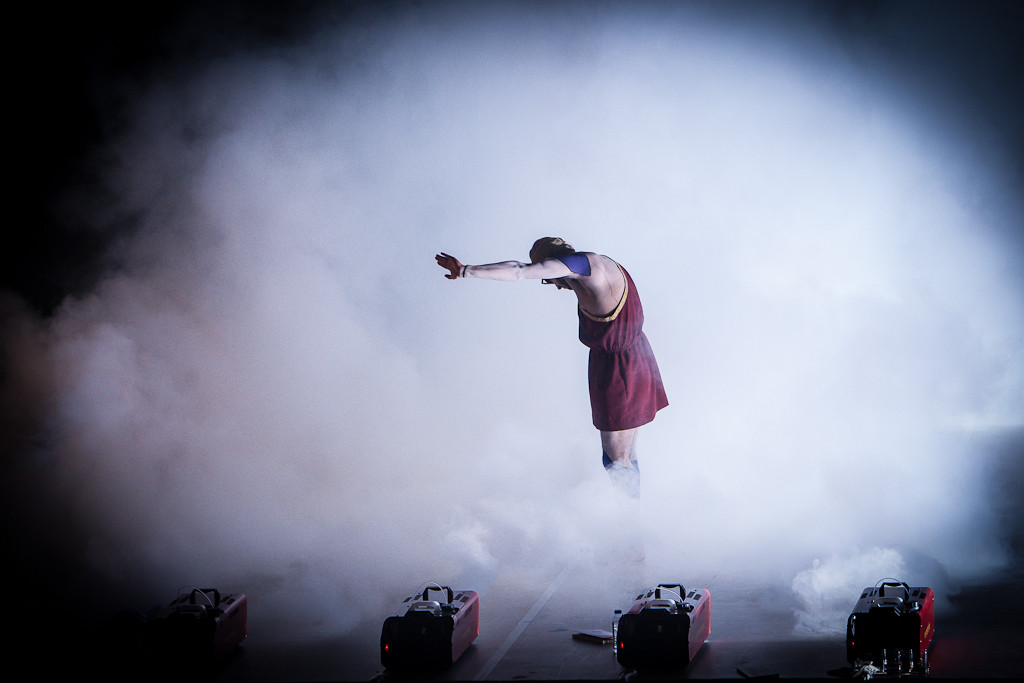
My my! At Waterloo Napoleon did surrender.
Oh yeah! And I have met my destiny in quite a similar way.
Abba
For George Steiner, the “idea of Europe” is a “tale of two cities”: Athens and Jerusalem. Through the “best of times” and the “worst of times”, the imperatives of reason from our Greek heritage and the imperatives of faith and revelation proclaimed in the Torah flow together into one central trunk (A single European? A hero?). This trilogy is completed in Greece, a place I began to visit at the height of the conflicts caused by the economic and social crisis. I haven’t been there to engage in Dark Tourism, nor am I trying to create social-political theatre. I’ve been to Athens to cry. I’ve been to Athens for voluntary encounters with tear gas.
—
Text and conception | Pedro Zegre Penim
Cast | Cláudia Jardim, João Duarte Costa, Pedro Zegre Penim
Musical direction and Piano | João Paulo Soares
Choreography | Sónia Baptista
Light design | Daniel Worm d’Assumpção
Make-up | Jorge Bragada
Seamstress | Rosário Balbi
Photography | Alípio Padilha
Video | André Godinho
Production | Cristina Correia, Elisabete Fragoso
Co-production | Culturgest
—
Length | 1h20
M/12
2015 | O NOME DA ROSA
X
2015 | O NOME DA ROSA
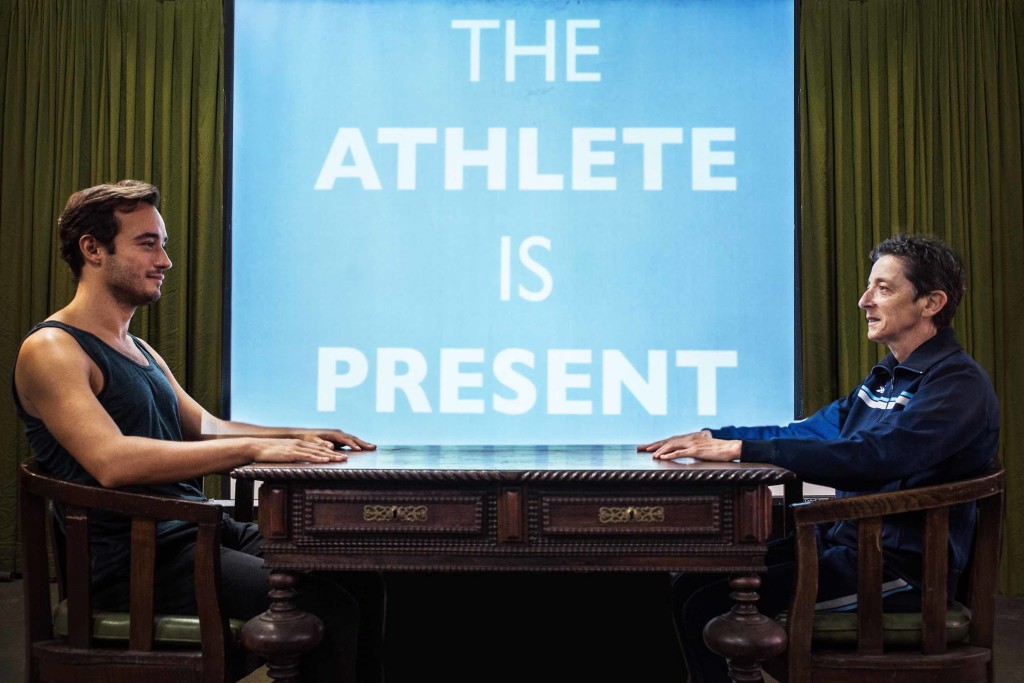
A theatrical marathon.
Rosa Mota has accompanied all my childhood and adolescence. I clearly remember seeing her on television, as she won several Olympic Marathons of Los Angeles [1984] and Seul [1988] and feeling the patriotic enthusiasm around “Rosa” through the euphoric reactions of adults. I believe that patriotism after April 25th Revolution was rebuilt and regenerated thanks to the international charisma of characters such as Rosa or Fernando Gomes.
Another important axis of the work is the word META (goal, mark) which in Portuguese means the end of the race, and in Greek refers to self- referentiality: the concept about itself. I wanted to link the concrete place within Rosa’s sport universe to a place in my own creative universe: a symptom of the most recent artistic creation, which is its tiredness of the meta (-language).
The Name of the Rose refers to a novel by Umberto Eco. In the last chapter of the book, Adso, an old man, looks at his past and comes to the conclusion that the memories we care for only remind us of things we lost and that no longer exist. He brings light to this thought with a proverb in latin that goes like: stat rosa pristina nomine, nomina nuda tenemus, meaning: the ancient rose still remains in the name, we have nothing but names.
This performance looks back to the history of Rosa Mota, but aims to make of this glorious past a path to the opening of meaning in the present, at the time of the show. It will never be a linear narrative and biography. It will always be a Rose within a Rose within a Rose, which in the end will cut the Goal.
Pedro Zegre Penim
—
Text | Pedro Zegre Penim and Hugo van der Ding
Cast | Rosa Mota, Mariana Magalhães, Pedro Zegre Penim, Hugo van der Ding, Joana Magalhães, Mafalda Banquart, Xana Novais and Luísa Osório
Light design | Rui Monteiro
Video | Jorge Quintela
Photography | José Caldeira
Production | Elisabete Fragoso
Co-production | Teatro Praga / Teatro Municipal do Porto – Rivoli
—
Length | 90min
M/12
2014 | TABUROPA
X
2014 | TABUROPA
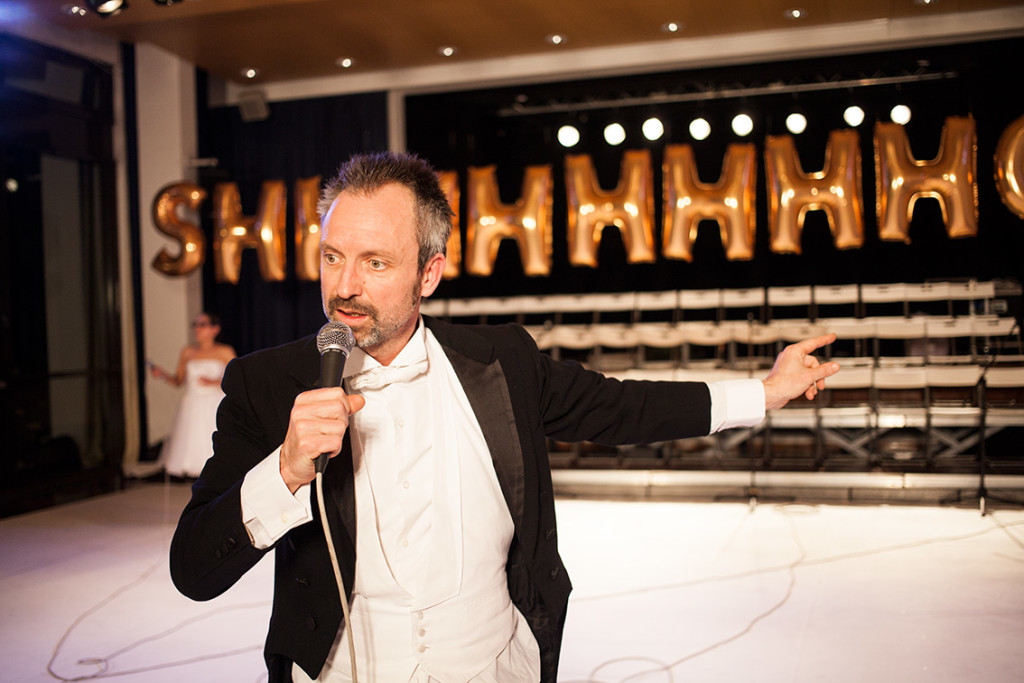
International cooperation project TABUROPA, endorsed by European Union’s Culture Programme, invited 4 companies from Portugal, Germany, Belgium and Poland to explore the notion of Tabu in national and european cultures throughout 18 months.
During the Research Phase, the portuguese performers worked under choreographer Arco Renz (kobalt.works, Belgium) in Warsaw, while André e. Teodósio (Teatro Praga) directed the performers from german company futur-3 in Brussels. The results of this process were explored through the Rehearsal Phase, in which the four groups prepared their original performances for the absolute premiere at Sommerblut Festival in Cologne in May 2014.
On the Coming Home Phase, Teatro Praga produced the rerun of INCUBADORA, by Arco Renz with the portuguese group, at Galeria Quadrum in Lisbon, in December 2014, and of SHHHHHHHOW, by André e. Teodósio with the performers from futur-3 and guest Paula Sá Nogueira, at Goethe Institut in Lisboa on March 2015, as well as the Follow-up meeting that closed this project.
—
Participating institutions | Teatro Praga, Kobalt Works, Futur-3, Association of Culture Practitioners
EINTOPF
Director | Agnieszka Blonska (Association of Culture Practitioners)
Cast | Angel Kaba, Marielle Morales, Sayaka Kaiwa, Igor Shyshko (kobalt.works)
Research country | Germany
INCUBADORA
Director | Arco Renz (kobalt.works)
Cast | Rita Morais, Nuno Leão, Ricardo Teixeira, Sónia Baptista (Teatro Praga)
Research country | Poland
NO RETURN
Director | André Erlen (Futur3)
Cast | Dominika Biernat, Dawid Żakowski, Sean Palmer, Joanna Wichowska (Association of Culture Practitioners)
Research country | Portugal
SHHHHHHHOW
Director | André Teodosio (Teatro Praga)
Cast | Anja Jazeschann, Bernd Rehse, Tomasso Tessitori, Pietro Micci (Futur3)
Research country | Belgium
Artistic management | André Erlen
Photography | Meyer Originals
Production | Sommerblut Kulturfestival e.V.
Project management | Gregor Leschig, Rolf Emmerich
Production management Germany | Armin Leoni, Judith Heese
Production management Poland | Anna Katarzyna Regulska-Lokanga, Joanna Wichowska, Magdalena Sobolewska
Production management Belgium | Ine Vander Elst
Production management Portugal | Elisabete Fragoso
2014 | TROPA-FANDANGA
X
2014 | TROPA-FANDANGA
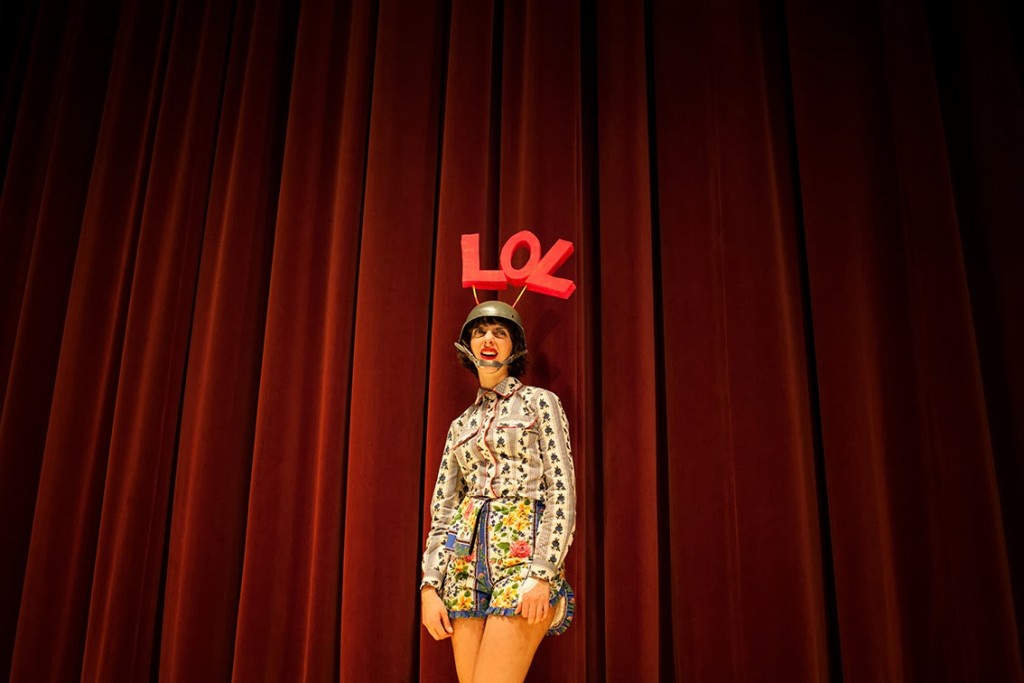
2014 was an important year in Portugal because it was the 40th anniversary of the end of the colonial wars in Angola and Mozambique and the end of the dictatorship of Salazar. It was also, as elsewhere in Europe, the centenary of the declaration of the First World War in 1914. The term “tropa-fandanga” signifies in Portuguese “the beggars”. The word also evokes both an army in rags (the fandanga troops) – which the revues from 1915 to 1920 ridiculed… Or the great war revue which was also part of the golden period of English music-hall (What a Lovely War by Charles Chilton) or in Germany (Hoppla, We’re Alive! by Toller). The first Portuguese revue was called “the revue of the year 1851”. It looked back over the year, in burlesque style, with caricatures of famous people and current affairs. From 1851 to the Carnation Revolution in 1974, we can follow the history and evolution of the country through songs and acts. It was a popular genre in Lisbon where the four theatres of Parque Mayer, which put on two or three shows a day, were always packed. The form stabilised very quickly and stayed the same for over a hundred years: a rigid structure with street talk, songs and comical sketches, and for the high-point of the show, a fado. In the final years of the Salazar dictatorship, the Portuguese Review was the only place in the country where you could make fun of the regime. The revues continued of course after the 25th of April. The principle was still the same but the themes had changed, like the parties in power.
—
Texts | Pedro Zegre Penim, José Maria Vieira Mendes, André e. Teodósio, Cláudia Jardim, Diogo Bento, Diogo Lopes, Joana Barrios, Joana Manuel and João Duarte Costa
Direction | Pedro Zegre Penim, José Maria Vieira Mendes and André e. Teodósio
Cast | José Raposo, André e. Teodósio, Cláudia Jardim, Diogo Bento, Diogo Lopes, Filipa Cardoso, Joana Barrios, Joana Manuel and João Duarte Costa
Fado attraction | Filipa Cardoso
Corps du ballet | André Garcia, Jenny Larrue, Travis Walker and Vicente Trindade
Musicians | João Paulo Soares (piano), Vasco Sousa (acoustic bass, viola), Francisco Cardoso (drums), Ruben da Luz (trombone), Maria João Cunha (acordeon), Tiago Morna (portuguese guitar)
Set design | José Capela
Screen design | Barbara Says…, João Pedro Vale and Nuno Alexandre Ferreira, Pedro Lourenço and Vasco Araújo
Costume design | Joana Barrios with costumes from the TNDM II archives from Flávio Tomé and Cláudia Faria, Jasmim de Matos, Juan Soutullo, Octávio Clérigo and Rafaela Mapril and costumes from Marcha do Alto do Pina 2013 by Carlos Mendonça
Lighting design | Daniel Worm D´Assumpção
Sound | Sérgio Henriques
Original score | Sérgio Godinho
Orchestrations and piano | João Paulo Soares
Choreography | João dos Santos Martins
Staging assistant | Cátia Nunes
Props coordination | Susana Pomba
Production | Elisabete Fragoso, Catarina Mendes
Communication | Mafalda Carvalho
Photography | Susana Pomba
Co-production | Teatro Nacional D. Maria II, Maison de la Culture de Bobigny – MC93
Co-presentation | Teatro Municipal do Porto – Rivoli and Campo Alegre and São Luiz Teatro Municipal
—
Length | 2h45
M/12
2013 | THE TEMPEST
X
2013 | THE TEMPEST
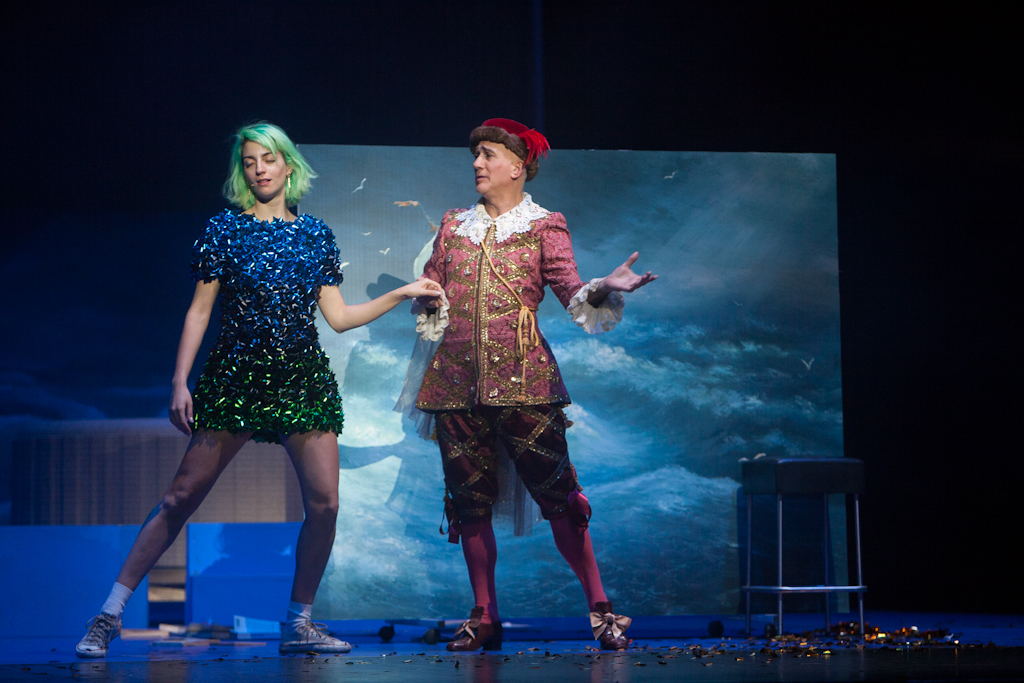
In 2010 we performed the debut of A Midsummer Night’s Dream in this auditorium at the Centro Cultural de Belém, based on the eponymous play by Shakespeare and the semi-opera The Fairy Queen by Henry Purcell. Another work by Purcell, The Tempest or The Enchanted Island, also has links to a Shakespeare play, as a comic version of The Tempest which was a resounding commercial success during the seventeenth and eighteenth centuries. A viewer recounted his impression on the play’s debut thus: “The theatre was completely full, the King and court were all present, and the play was the most ingenuous that I have ever seen.”
We are taking this lost piece as our starting point, along with all of the others that have existed (or not existed), throwing ourselves into the tempests. Featuring the same elements as A Midsummer Night’s Dream (music, video, actors, singers and visual artists), but arranged in a different way, this musical, with music inspired by Purcell and composed and arranged by Xinobi and Moullinex, is a continuation. The Tempest is, therefore, adrift, like an island that is actually a boat, looking for the unknown place from where it set sail. It is searching for the right colour (although there is no sense of right), the correct room (although there is no correctness), another performance (although there is no other), and the tempest (who?). Without an aim and without means. Searching just for the sake of it.
The truth is that the search is just as artificial as the performance or the boat or the island. It is an off-performance (or a show-off, perhaps), like sand thrown in the eyes; in other words, an experience. And a pretext to repeat tempests. However, we do not know what came first – the pretext or the outcome. Yet as The Tempest invents its own critique, the order does not matter, just like everything else. They are all accidents, just like this text that you are reading. Accidents after accidents, sentences after sentences announcing their content, promising the end (which does not exist).
And by the way, if people were to ask you, you could say that The Tempest was the performance that never happened, the discourse of a group that does not feel comfortable with the idea of an object in art, who believe that performances are to be seen as cognitive experiences and nothing more than a chance to short-circuit the world and the things within it. You could claim to have witnessed the description of a performance, without the original performance itself. “That is what they always wanted to do, but they are still unable to do it.” You could say something like that. Or you could say nothing at all, because the performance has already said it all. After all, the performance is over. The performance never existed. The end.
—
A performance by Teatro Praga
Based on William Shakespeare’s The Tempest and Henry Purcell’s The Enchanted Island
Text and creation | Pedro Penim, André e. Teodósio, J.M.Vieira Mendes
Original score | Xinobi & Moullinex
Musical arrangements | Carlos Clara Gomes
Cast | Joana Barrios, Diogo Bento, André Godinho, Cláudia Jardim, Diogo Lopes, Patrícia da Silva, André e. Teodósio, Vicente Trindade, Daniel Worm d’Assumpção
Vocal director | Rui Baeta
Soloists | Rui Baeta (Baritone) and Sandra Medeiros (I Soprano)
Choir | Ana Margarida Encarnação (II Soprano), Cristina Repas (Mezzo-soprano), João Francisco (Tenor)
Video | André Godinho
Set design | Bárbara Falcão Fernandes
Light design | Daniel Worm d’Assumpção
Light assistant | Marta Fonseca
Choreography | Vicente Trindade
Historic costumes | António de Oliveira Pinto
Costume design | Joana Barrios
Guest artists | Vasco Araújo, Catarina Campino, Javier Nuñez Gasco, João Pedro Vale
Video team | Joana Frazão, Salomé Lamas
Photography | Paulo Martins, Alípio Padilha
Boom operator | Nuno Mourão
Sound design | Jorge Imperial
Production | Elisabete Fragoso, Filipa Rolaça
—
Length | 100min
2013 | OLD AGE
X
2013 | OLD AGE
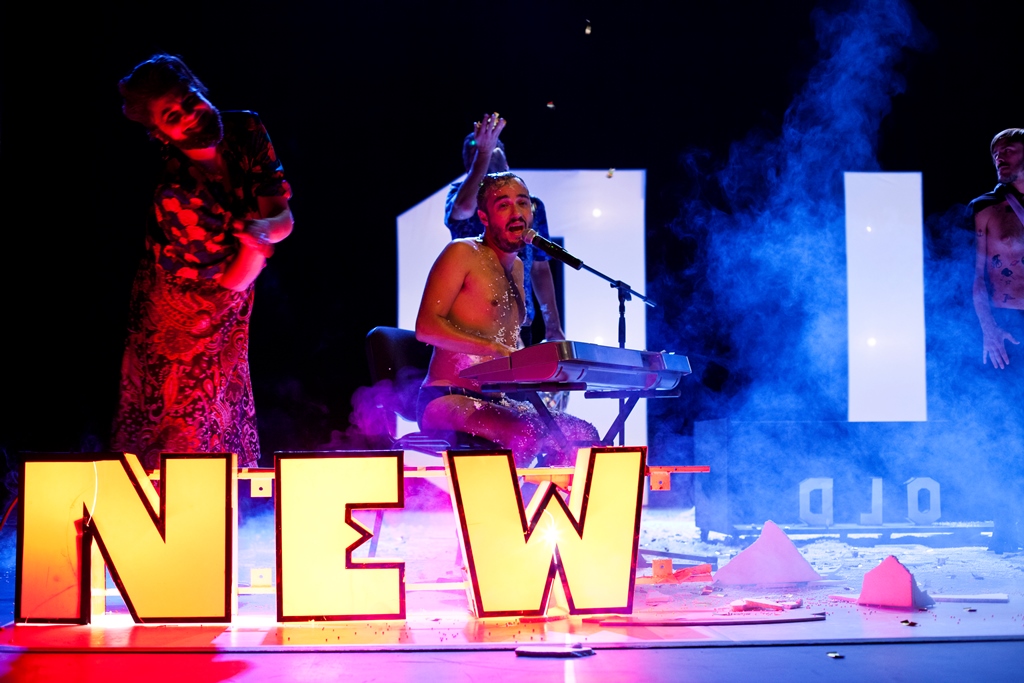
In Old Age, a text by J.M. Vieira Mendes, the actors, before starting, have already retired. People with pasts, showing wrinkles where we can’t see them. The nearest horizon is death, but melancholy is comedy and despair is laughter. In this play the plot is the pretext to thicken the “Who am I?” or “What does it mean to reach the old age?” Or even “Do I say I am old because I am old or am I old because I say I am old?”
From this text, Teatro Praga came to a show in which its old age is put to test. How will it be in 40 years? Speculating the answer adds mater to a closed concept.
Old Age is time and elderness, knowledge and forgetfulness, arthrosis and pilates. But it is also today and was yesterday. It’s a construction to do with known words. An inevitability to fulfill. A reinvention within the invention. A communication in hiccups. It is, ultimately, the possibility to say, with today’s bodies and the future’s hair: Old Age is here and today.
This show doesn’t inaugurate a new age. It merely continues. We are all in the same story. We are all in the same boat.
—
Text | André e. Teodósio, Cláudia Jardim, Diogo Bento, Diogo Lopes, J.M. Vieira Mendes, Patrícia da Silva, Pedro Penim
Cast | Cláudia Jardim, Diogo Bento, Diogo Lopes, Patrícia da Silva, Pedro Penim
Light design | Daniel Worm d’Assumpção
Set design | Bárbara Falcão Fernandes
Photography | Susana Pomba
Production | Elisabete Fragoso, Catarina Mendes
Co-production | Teatro Viriato, Teatro Praga
—
Length | 55min
M/12
2011 | SUSANA POMBA
X
2011 | SUSANA POMBA

What’s in a name? That which we call a rose
By any other name would smell as sweet.
Shakespeare, Romeo and Juliet
History has a full repertoire of names: Nikolai Gogol, Antony and Cleopatra, Hedda Gabler, Gianni Schicchi, among many others.
Are they just literary products or have they already become vital organisms? I never met them and yet they are always in my mind. In TOP MODELS, as a way of not forgetting, I decided to record anonymous names, to turn my friends into protagonists of things left to tell. I don’t know if they will remain in history, but they will have an identity card and pay their fees. Susana Pomba is the first text of a long cycle to come.
—
Text and Direction | André e. Teodósio / Teatro Praga
Assistant | Sofia Seno
With | Joana Barrios, Diogo Bento, The End of Irony and PAUS
Set design | Bárbara Falcão Fernandes
Music | PAUS
Mixtape | Miguel Bonneville
Light design | Daniel Worm d’Assumpção
Photography | Susana Pomba
Production | Cristina Correia
Co-production | CCB
—
Length | 1h20
M/12
2011 | EGOSISTEMA
X
2011 | EGOSISTEMA
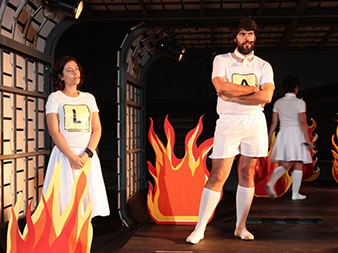
Volo in te, et in semine tuo Imperium mihi stabilire.
Says Christ to D. Afonso Henriques, according to Priest António Vieira
CCB is inside out and invites me to do a performance. I start to wonder and suddenly I realize that all of us are inside out.
They suggest me: – Wo Es war, soll Ich werden.
So many foreign, so many languages! 😛
The World is not what it is… therefore is worth spending some time on reviewing the subject by playing a spiral-vertiginous-game: “Who is who?”
It’s going to be like returning to the 80’s but with less hair spray.
EGOSISTEMA will be a redefining game of Nature’s laws.
—
Text and direction | André e. Teodósio
Cast | André e. Teodósio, André Godinho, António Gouveia, Catarina Campino, Cláudia Jardim, Joana Manuel, João Martins, Patrícia Silva, Paula Sá Nogueira, Rita Só and Sara Correia
Set design | Bárbara Falcão Fernandes
Photography | Susana Pomba
Production | Cristina Correia
Co-production | Centro Cultural de Belém
2011 | ISRAEL
X
2011 | ISRAEL
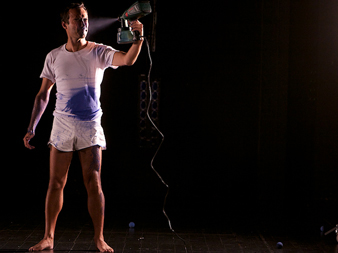
Love is always a page written in Hebrew.
Portuguese Proverbs
This performance is a love letter to Israel. Yes, it’s professedly problematic: a declaration of love to an entity many see as a contemporary monster. An actor is seated in front of his computer, his face projected onto a big screen. It is difficult to tell who he is talking to with such intimacy, who is he swearing at, who is making him cry and laugh. Is it the audience? Is he talking to himself? To his lover? Is he exposing is troubled love life in front of our eyes? Israel, a nation in the form of a fiction, takes on a human face, like someone one has to endure. Voltaire wrote that one has to choose between countries where you sweat and countries where you think. In Israel (the country and the performance) you do both.
—
A performance by Teatro Praga
Text | Pedro Zegre Penim
Creation and interpretation | Pedro Zegre Penim and Catarina Campino
Light design | Daniel Worm d’Assumpção
Production | Cristina Correia, Elisabete Fragoso
Photography | José Frade
Co-production | Teatro Maria Matos
—
Length | 80min
M/12
2010 | OIL AIN’T ALL, JR
X
2010 | OIL AIN’T ALL, JR
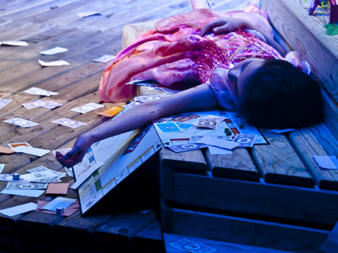
“The war movie is the movie paradigm of today. The Spielberg’s Saving Private Ryan, for example, in which is represented the infinite horror, the carnage and absurd violence. The prospect of Spielberg is that war is an incomprehensible nightmare, a pathetic waste of human lives. But it seems to me that of what we should not lose sight is that behind the Second World War, and the D-Day invasion, was the heroism of an objective and ethical struggle, and that there are causes and ideals worth dying for . This reflects, in fact, a very strong trend in contemporary ideological discourse, to consider those who are willing to risk their lives in the name of a cause or purpose as irrational fanatics.
For what would you be willing to risk everything?
It is this central concern of Westerns in general – to what extent you would have the courage to risk his life?
So I think we should not in any way treat the western as a kind of an american ideological fundamentalism. Rather, it seems to me that we need today more and more of a heroic attitude. In this context, what should follow the deconstruction and the acceptance of radical contingency should not be a universal ironic skepticism, in which you engage in something you should be aware that you’re never committing fully – no. We should rather restore the sense of absolute commitment and courage to risk.”
—
A performance by Teatro Praga
Text | José Maria Vieira Mendes
Cast | Cláudia Jardim, José Maria Vieira Mendes, Patrícia da Silva, Pedro Penim and Rodolfo Teixeira
Collaboration | Gabriel Abrantes
Assistance | Bárbara Falcão Fernandes and Joana Barrios
Light design | Daniel Worm d’Assumpção
Production | Cristina Correia and Pedro Pires
Co-production | Centro Cultural de Belém
Photography | Pedro Celestino
—
Length | 60min
M/12
2010 | A MIDSUMMER NIGHT’S DREAM
X
2010 | A MIDSUMMER NIGHT’S DREAM
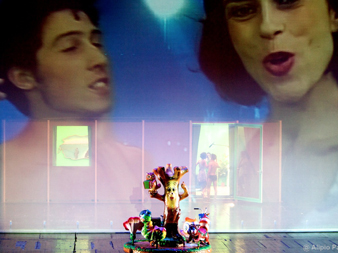
A performance by Teatro Praga with Músicos do Tejo.
From A Midsummer Night’s Dream by William Shakespeare
and The Fairy Queen by Henry Purcell.
Why theatre when all you want to think about is Summer and Love? Why bother us with the hottest issues when all you want to think about is Summer and Love? Why should we unsettle? Why should we worry about inscribing ourselves? Why should we dominate the contemporary lexicon? Why that much irony and multi-reference? Why so many hours spent on the Internet hoping not to drop the zeitgeist? Why go on downloading so much? Why should we make ideological and aesthetic enemies? Why should we burn our eyelashes reading Badiou’s benjamins? Why intensify wrinkles and white hair? When all we want is Summer and Love?
MIDSUMMER NIGHT’S DREAM wants to provide enjoyment and relaxation. We’ll all be on and won’t even remember those who’re off. We’ll treat you like a Prince and you’ll love each moment. Let’s feel the air passing by like a soft breeze and let’s forget about meeeeeeeeeeeeee… It’s like inviting someone for dinner and avoiding ‘’certain topics’’ so that nobody gets bored and the conversation can flow. It’s like driving on the freeway to Algarve, Baroque music playing on the radio, your friend sitting beside you and kissing your neck… and here we go into the future, where a party awaits us, a fashion cocktail and an astronomical bill which will be paid when the Winter arrives.
With the restoration of the monarchy in 1660, Charles II authorized two theatre companies for himself and his brother, the Duke of York. From that point on, and influenced by what was being done in France, under Louis XIV, the theatre of machines was born: spectacular and exuberant, excessive, megalomaniac and with a magnificent epilogue in THE FAIRY QUEEN, by Henry Purcell.
Starting with Shakespeare’s MIDSUMMER NIGHT’S DREAM, Purcell composes music for a show whose second version (1691-92) was filled with special effects, an expensive and extravagant performance which, despite its success, ended up in a financial fiasco.
A giant water fountain and six monkeys dancing are mentioned.
Teatro Praga will relive those times. MIDSUMMER NIGHT’S DREAM is a celebration in the pursuit of happiness and a tribute to power to the sound of Purcell and with a contemporary flavour, our flavour.
—
“Midsummer Night’s Dream” was reenacted by Balleteatro students in 2017, at Coliseu do Porto.
—
Cast | André e. Teodósio, Cláudia Jardim, Diogo Bento, Joana Barrios, Joana Manuel, Patrícia da Silva and Rodolfo Teixeira
Soloists | Ana Quintans (Soprano), Rossano Ghira (Counter Tenor), João Sebastião (Tenor) and Nuno Dias (Bass)
Olisipo choir | Elsa Cortes (Soprano), Luísa Tavares (Contralto – July 3), Lucinda Gerhard (Contralto – July 4), Diogo Cerdeira (Tenor), Armando Possante (Bass)
Three fairies | Leonor Robert, Rafaela Albuquerque and Rita Fonseca
Film crew | Carlos Eduardo, Cláudia Morais, Francisco Moreira, João Martins, Leonor Noivo, Nuno Morão and Tiago Oliveira
Guest artists | Ana Pérez-Quiroga, Catarina Campino, Javier Núñez Gasco, João Pedro Vale, Leo Ramos, Miguel Viegas, Rogério Nuno Costa, The End of Irony (Diogo Lopes, Ivo Silva, Miguel Cunha, Rita Ricardo Morais and Teixeira) Vasco Araújo and Vincente Trindade
Musical director | Marcos Magalhães
Video director | André Godinho
Light design | Daniel Worm d’Assumpção
Sound design | Ricardo Guerreiro
Set design | Bárbara Falcão Fernandes
House | Filipe Carneiro (Triplinfinito)
Costume design | Carla Cardoso
Production | Bruno Coelho, Cristina Correia and Sara Maurício
Assistance | José Nunes
Tejo’s musicians | Álvaro Pinto (Violin-concertmaster), Xu Na(Violin I), Raquel Cravino (Violin I), Denys Stetsenko (Violin II), Zófia Pająk (Violin II), Raquel Massadas (Viola), Lúcio Studer (Viola), Paulo Gaio Lima (Cello), Xurxo Varela (Viola da gamba), Filipa Meneses (Viola da Gamba), Duncan Fox (Violone), Carolino Career (Bassoon), Luís Marques (Oboe I), Andreia Carvalho (Oboe II) Antonio Quítalo (Trumpet I), Bruno Fernandes (Trumpet II), Hugo Sanches (Theorbo), Ricardo Pedro Leitão (Theorbo), Joaquim Lopes (Percussion), Marta Araújo (Clavier I), Marcos Magalhaes (Clavier II)
Photography | Alípio Padilha
—
Length | 2h20
M/6
2009 | DEMO
X
2009 | DEMO
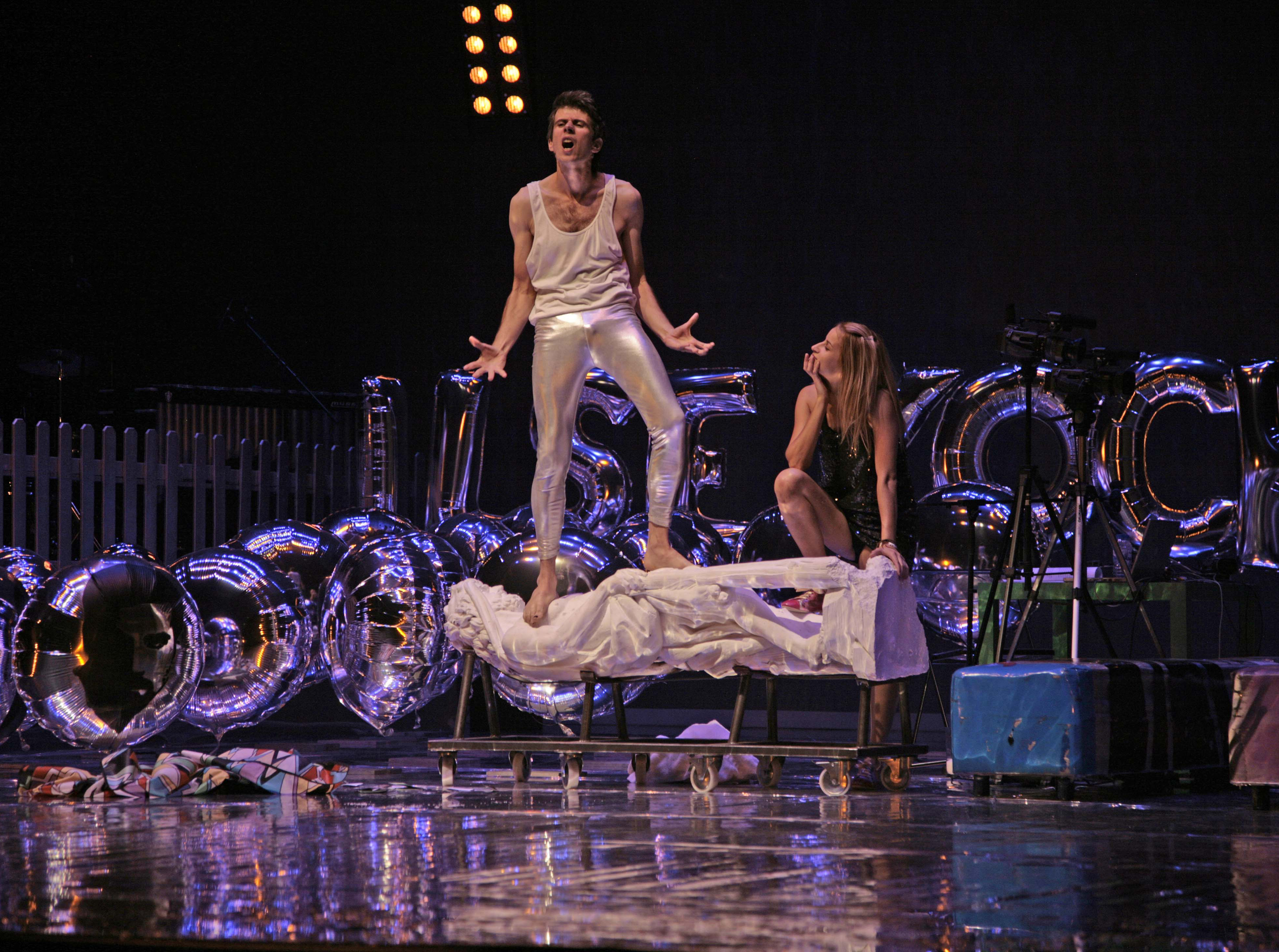
An order of São Luiz Teatro Municipal
São Luiz Teatro Municipal invited Teatro Praga to make a show on India and Teatro Praga proposed to make a musical. Demo is a musical inspired by India, but where India remained we no longer know. Perhaps in the mythology of the birth of a nation, which puzzled us (mother in law and another’s wife, married with uncles and daughter of nephews), or even in the proliferation of arms of a goddess, in the differentiation of classes, the dimension of India’s democracy, in the excess of its population. India finds itself in the form of the show and not registered, as in a portrait or documentary. We were not there. No. We have not spoken with “them.” No.
India was used as a code to read Europe. The “other” as a mirror to see ourselves, which is an ancient method, a common place that served as a pretext for a lot of travelling. We read Moravia and Pasolini, and not Tagore, we saw Fritz Lang and not Ray.
Demo has a narrative. It’s a love story. We do not tell it very well, because those days are gone. And also because it is not possible to tell when you do not know very well what there is to tell. We managed to mix. Estonia with Iceland, Bulgaria with Spain, English with German and we find ourselves reading cycles, those that repeat themselves forever and ever: solution, failure, solution, failure.
But we have a protagonist. We named her Savitri. She comes from the waters where the crocodiles live. And she proposes, sorry, she imposes an order. Maybe all she has is a political dream, a demonic and megalomaniac dream. Or maybe she just wants to travel: “In heaven we have our Indias, to get there is to save oneself, that we all sail is what it takes.” (Father Manuel Bernardes, The last days of man.)
We built the show from fragments and completed it with the american musicians and performers Kevin Blechdom and Christopher Fleeger, and the Estonian musician and performer Andres Lõo. We wrapped philosophical, ethical, social and cultural questions in candy-paper-chansons. The candy is for everyone: colorful and palatable, but hard to crack and lethal to the teeth. It is democratic, demented and destructive.
—
A performance by Teatro Praga with original music by Kevin Blechdom, Christopher Fleeger and Andres Loo
With André e. Teodósio, André Godinho, Andres Lõo, Carlos António, Christopher Fleeger, Cláudia Jardim, Joana Barrios, Joana Manuel, Kevin Blechdom, Luís Madureira, Miguel Bonneville, Patrícia da Silva, Pedro Penim and Rita Só
Guest star | Rão Kyao
And the collaboration of Vasco Araújo
Crocodiles | André Campino, Diogo Bento and mulher bala
Light design and technical direction | Daniel Worm d’Assumpção
Video | André Godinho
Vocal support | Luís Madureira
Choreographic assistance | João Galante
Nora Nova costume | Fernanda Pereira
Ilse Koch costume | João Figueira Nogueira
Costume design | Teresa Louro and Rosário Balbi
Execution of the head of Tim O ‘Leary | Jorge Bragada
Photography | Susana Pomba
Production | Cristina Correia, Joana Gusmão and Pedro Pires
Co-production | S. Luiz Teatro Municipal
Support | O Espaço do Tempo, DEVIR, O Rumo do Fumo, Goethe-Institut Portugal
—
Length | 1h40
M/12
—
2009 | PADAM PADAM
X
2009 | PADAM PADAM
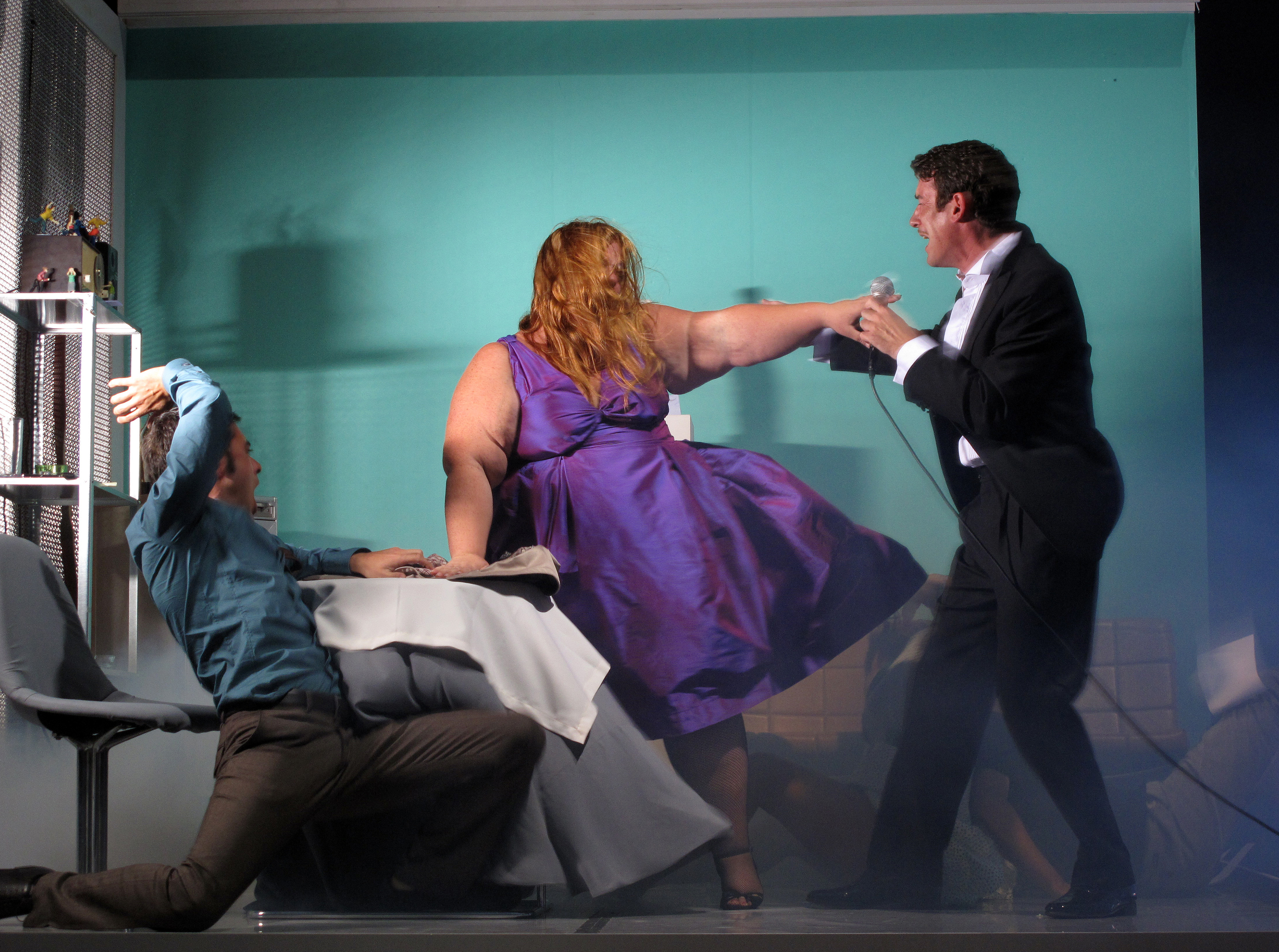
A disaster performance.
Padam Padam is probably a show inspired by the disaster cinema and was interested in recalling the year zero. It is also a show dedicated to the animals. And the storms. A show that is considering how it will be. How can it be. To find new diseases because after all, if a person where the different bacteria and viruses multiply is feeling bad, on the other hand the mentioned bacteria and viruses feel remarkably well.
Let us begin by the middle: Padam Padam is a disaster performance. We stole the name from films that fantasize with the end of the world or visit the monster or the alien invasion. We have supported us in a hypothetical structure, cinematic ghosts of arguments, but let’s not go beyond five people seated in a tiny space where they are exposed to the elements and experience ideas such as family or community, the words and names but also some love, utopias and travel.
To help “written press”, we could say that we tell of a sunny day when a family decides to leave for the weekend. A restless and inconsistent family. And as the day progresses, the dark clouds approaching, the stroms release and there are meteorites colliding with the structures on the planet. The survivors, the family left in the morning, they are wandering in the wilderness of ruins and corpses. Looking for some old routines, others betting on new ideas.
Padam Padam is a show dedicated to the animals. A show that is considering how it will be. How can it be. . To find new diseases because after all, if a person where the different bacteria and viruses multiply is feeling bad, on the other hand the mentioned bacteria and viruses feel remarkably well.
—
A peerformance by Teatro Praga
Text | José Maria Vieira Mendes
Cast | Cláudia Jardim, Diogo Bento, Marcello Urgeghe, Patrícia da Silva and Pedro Penim
Narrator | Luis Miguel Cintra
Collaboration | Vasco Araújo
Light design and technical direction | Daniel Worm d’Assumpção
Video | André Godinho
Photography | Ângelo Fernandes and Susana Pomba
Graphic image (Poster) | Mulher Bala
Waltz teacher | Paula Fonseca
Production | Cristina Correia, Joana Gusmão and Pedro Pires
Set design assistance | João Gonçalves
Assembly team | PréForma
Co-production | Centro Cultural de Belém, Próspero
Associated structures | Théâtre National de Bretagne (Rennes, France), Théâtre de la Place (Liège, Belgium), Emilia Romagna Teatro Fondazione (Modena, Italy); Schaubühne am Lehniner Platz (Berlin, Germany), University of Tampere (Tampere, Finland)
Sponsors | Teatro Viriato, O Espaço do Tempo
—
Length | 90min
M/12
—
2008 | TURBO-FOLK
X
2008 | TURBO-FOLK
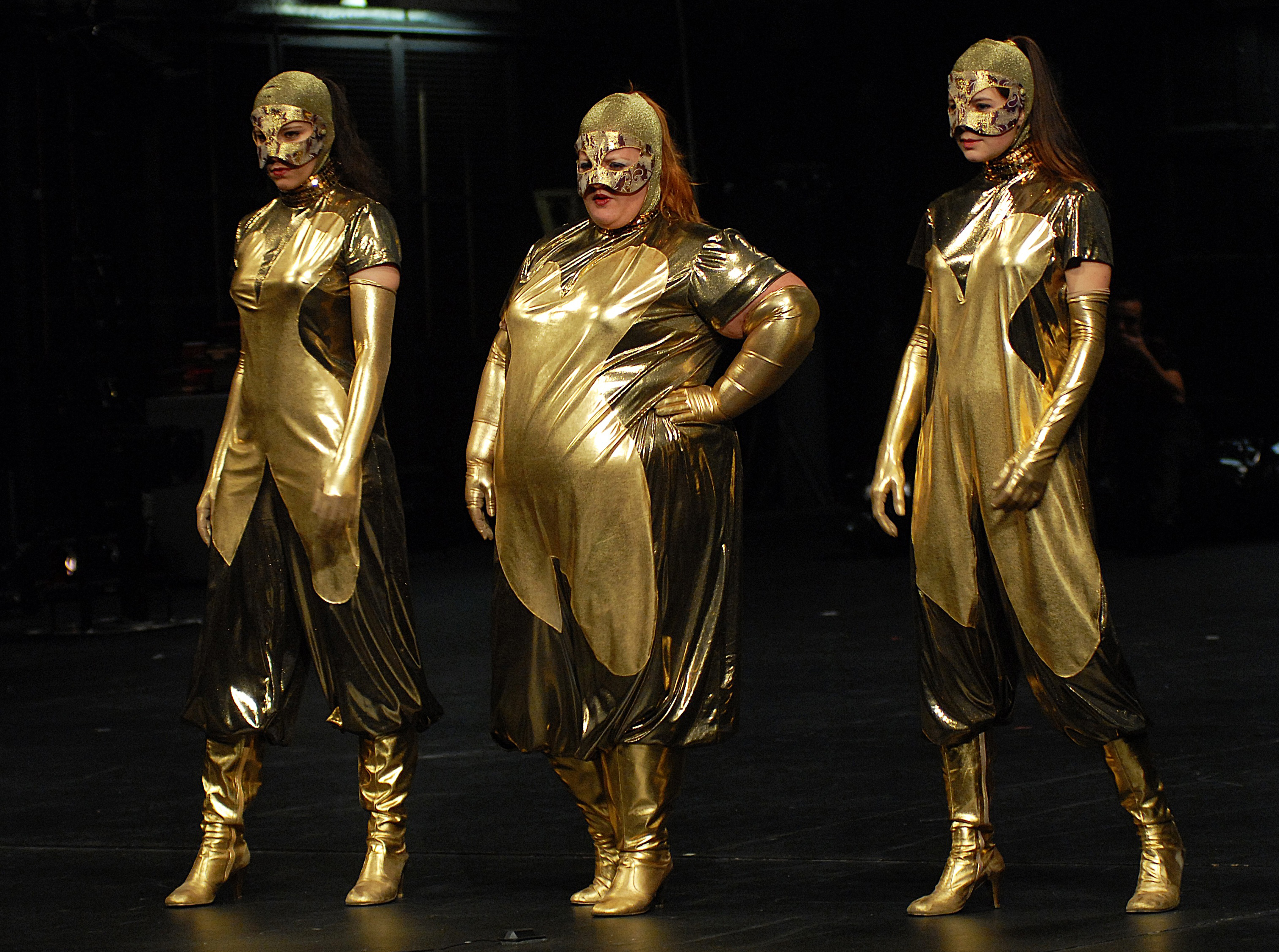
An order of the São Luiz Teatro Municipal as part of the cycle “Outras Lisboas”.
Serving Teatro São Luiz’s cycle “Outras Lisboas” for a debate on immigration in Lisbon, and being assigned to the Teatro Praga the specificity of Eastern European immigrants, Turbo-Folk (title derived from the serbian musical concept coined by Rambo Amadeus denominating a style of traditional music with a “up-rooting pop”) appears as an inevitable community show that in the wake of Aeschylus’ Persians, (un) freeze Eastern European and West relations ie those old issues, once consciously devalued, they return with all the force of the Zeitgeist. Using data from the “other side”
“(…) simply said to want to commend the fact that Carlos Fino, in his reportings from war, has always reflected an extraordinary respect and understanding for the culture that is the “other side”. I remembered that just maybe the Aeschylus’ tragedy ”Persians” was pleased with Carlos Fino (I venture this opinion without knowing it).”
Frederico Lourenço
The show Turbo-Folk is the third part of an epic trilogy about the ” Aesthetic Power”*, launched by the show Discotheater [Festival Alkantara] which was followed by O Avarento ou A Última Festa (Miser ou The Last Party) [TNSJ].**
Turbo-Folk commits an attack: a fresh political start through aesthetics. As immigration is a serious problem to be solved at a political level, it is also a good metaphor for many other issues pertinent to the act of communication and sharing community, the desires and problems in the relationship of humans with each other. The self-empowerment.
It is not enough to point the finger at policies, not enough to embellish the immigration status by assigning it as a category shared by all individuals, not enough to go outside victimized, not just say that the problem resides “the other”, because the human being is always one step away from falling into the abyss in this aeschylian persian rug.
Thus, Turbo-Folk is a revolution of the landless, an estonian percussionist semi-lost and a solo show of a ukrainian lyrical singer.
Turbo-Folk is a celebration of immigrants.
Turbo-Folk is the performativity that counts, not the object (by the way, the performative troika is: Jean-Luc Godard, Rambo Amadeus, and Slavoj Žižek).
In Turbo-Folk “homo faber aestheticus” gladly drifts in any bloody river.
—
A performance by Teatro Praga
Cast | Ana Só, André e. Teodósio, Andres Lõo, Cláudia Jardim, Diogo Bento, Inês Vaz, Patrícia da Silva and Pedro Penim
Singers | Larissa Savchenko and Luiza Dedicin
Collaboration | André Godinho, Catarina Campino, Javier Núñez Gasco, José Maria Vieira Mendes, Rogério Nuno Costa and Vasco Araújo
Three gold teeth dressed by | Mariana Sá Nogueira
Light design | Daniel Worm d’Assumpção
Set design assistant | João Gonçalves
Production | Joana Gusmão and Pedro Pires
Co-production | São Luiz Teatro Municipal
Photography | José Frade
Promotional photo | Steve Stoer
Graffiti | Rodrigo Craveiro
—
Length | 90min
M/12
—
2008 | PÚBLICO-ALVO
X
2008 | PÚBLICO-ALVO
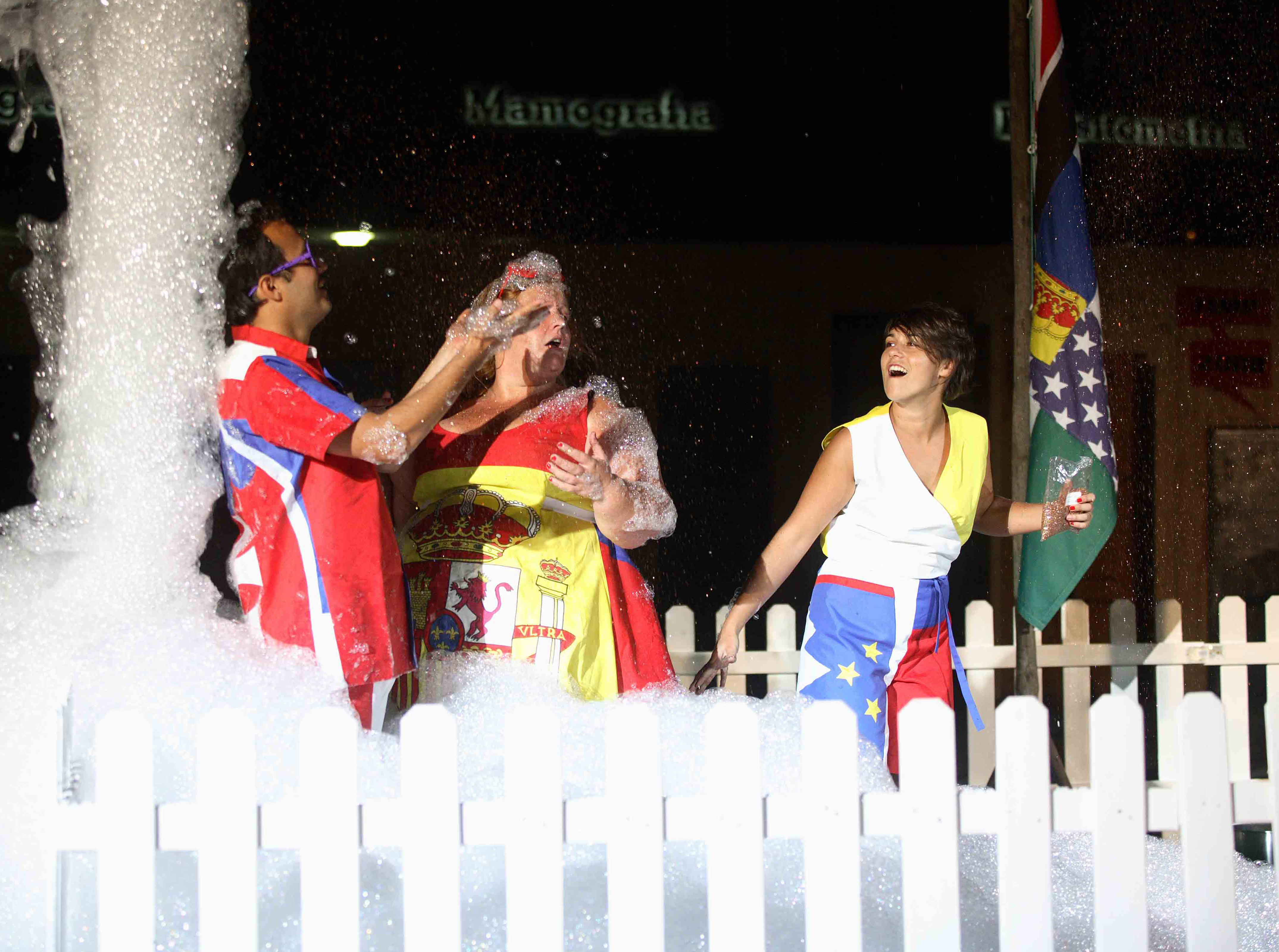
Stop pulling my lead or I’ll bite your fuckin’ lef off!
in Dog, by Steven Berkoff
If the “return to Nature” was never possible, there is no point in pretending that some times we are in the open air and others we’re not. Let us celebrate then, once more, the land that man tread upon, in the quest of Amazon’s unkind lumbermen, of the merciless icelandic harpooners or the resistant inhabitants of the Low Countries, and let us perform one more mass in the name of Dr. Frankenstein (the new Dyonisos) because “God gives nuts, but he does not break them”.
Let us simulate, in a space halfway between the airport, the station and the stadium, the mythic (because it is extinct) fight between Physis and Anthropos, between Nature and Man.
The actors are chosen. Disaster is inevitable. The target audience just dare show up.
—
Co-creation | André e. Teodósio, Cláudia Jardim, José Maria Vieira Mendes, Patrícia da Silva and Pedro Penim
Production and communication | FIMP, Pedro Pires and Joana Gusmão
Light design and music | Teatro Praga
Photography | Susana Neves
2008 | CONSERVATORY
X
2008 | CONSERVATORY
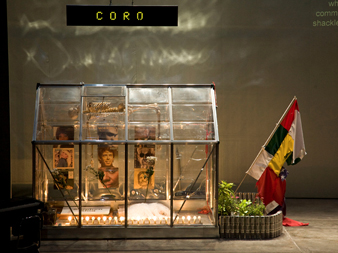
Got to write a classic
Got to write it in an attic
Adrian Gurvitz, Classic
To make a conservative show, make a classic out of ourselves, give birth to a monster, impose an identity, build a greenhouse where we can keep all this and show all this, closed walls, acclimatized room, no danger of getting infected, a thing of our own, plants for others to see. An absolute interior, comfortable, conservative and adequately decorated, a space which is big enough to keep us all inside. Or almost. But what comes after? What happens when it brims over? Are you staying or are you leaving? Do you belong or don’t you belong? Is your palace like mine?
The point of departure for this show emerges from a text by Peter Sloterdijk addressing the ‘cavernous’ allegory of the greenhouse: conservatory is also a synonym in English for greenhouse, a place where we keep what we want to preserve.
If the conservatory is a place where objects and human beings can conserve themselves and survive, distant from all alterations and changes (except for ageing and its natural results), our Conservatory is a place where texts and actors can conserve themselves and survive, distant from all alterations and changes (except for ageing and its natural results). If a conservatory can become an evolved organization, under the form of a public or private establishment, destined to safeguard and promote the teaching of cultural values such as music, dance and theatre, our Conservatory is an organization that allows itself to evolve, under the form of a semi public/semi-private space, destined to safeguard and promote the teaching of Theatre.
The term conservatory is largely used to designate an artificial phenomenon of protection, but it is equally applied to designate a natural spontaneous context that is able to fulfil, without human intervention, a function of preservation – for instance, the isolation of an island during the drift of the continents as being able to create a natural conservatory of living species.
So, Conservatory is also a performance resulting from the natural drift of theatre that tries to create a natural conservatory of the species.
—
Co-production | Festival Alkantara
With | André e. Teodósio, Cláudia Jardim, Joana Barrios, Patrícia da Silva, Pedro Penim and Simão Cayatte
Light design | Daniel d’Assumpção Worm
Production | Joana Gusmão and Pedro Pires
Support | Espaço do Tempo, DEVIR
—
Length | 90min
—
2007 | HAMLET
X
2007 | HAMLET
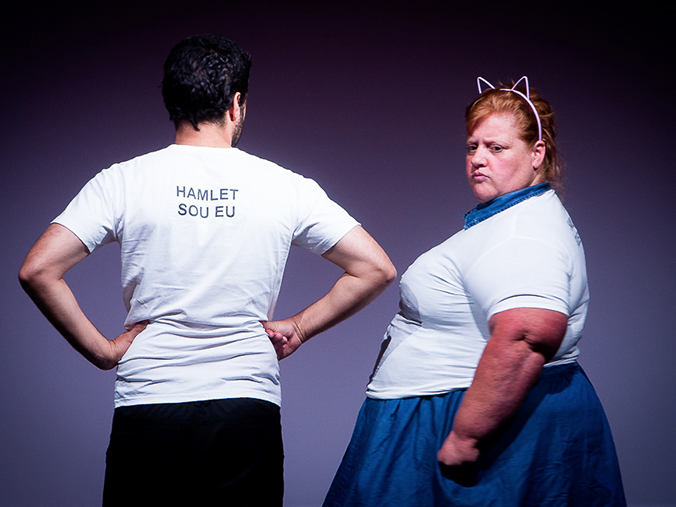
To dance or not to dance… It’s not a question…
Two actors rehearse the creation of a performance aimed for children. How should you tell stories to kids? And more precisely, how should you tell a dramaturgical and literature classic to the younger crowd? Over the table there is a purse, from which objects pop out and quickly become the characters of a story.
Hamlet is played by an apple, Gertrude takes the form of dental floss, Claudius an hidrating cream and Ofelia, a vitamins tablet. After an hour, Hamlet is reborn from out of the purse, which resembles Mary Poppins’: smaller than the dreams it keeps inside.
This performance suggests a challenge to discover and perform different theatrical “scenes” for Hamlet‘s plot. Two actors tell a Shakespeare story to the children, guiding them (and distracting them) through the narrative and inviting them to an active participation.
The play ends with a trip to the stage, where a party will take place, with lights, music, costumes. With the help of the audience, Hamlet will be retold.
Each day, a different performance is created by the young group of spectators, from this Shakespeare’s play.
—
Created by | Cláudia Jardim, Diogo Bento, Pedro Penim
Cast | Cláudia Jardim, Diogo Bento
Dramaturgical Support | Maria João da Rocha Afonso
Head of production | Andreia Carneiro
Executive production | Alexandra Baião
Photography | Alípio Padilha
Co-production | Teatro Maria Matos
—
Length | 130 min
M/6
—
Bookings: producao@teatropraga.com
2007 | MISER OR THE LAST PARTY
X
2007 | MISER OR THE LAST PARTY

A five acts comedy.
A new Miser by José Maria Vieira Mendes: revisiting a paper of 1668, in the prospect of conflict between two generations, in which Moliere is only for the skeleton: the author starts the original structure and lets breachs, breaks, loose parts, mixing languages and styles, to develop a reflection on the conflict between the generation since April 25th and her parents’ generation. A new version of the piece, free-avoidance, or writing what is already like to read the original work.
In Miser – possible stage for endless claims and hysterical political and aesthetic as the distribution of power within the same generation (that of “Jonah” did 25 years in 2000), panoptic surveillance of contemporary cities (discipline and mutilation), new vs. old, the absence of mother, the perils of a calculative world, the transcendental power vs. cartesian social norms, the reduction of the human to a monetary value + quantification as knowledge, the house as a representation of the modern economy and blah blah blah – deny any possible linear reading, and tried to deconstruct and “screw up” the text as less as possible. This can be seen (by those who know us or by those who have some expectations) as a sly/little innovative maneuver classicist representation vs. presentation). In this case we will say, viriliana path, which is a matter of perspective.
—
Text | José Maria Vieira Mendes, a partir de O Avarento (L’Avare, 1668), de Molière
Co-creation | André e. Teodósio, Cláudia Jardim, José Maria Vieira Mendes, Marcello Urgeghe, Martim Pedroso, Patrícia da Silva, Paula Diogo, Pedro Penim, Rogério Nuno Costa, Romeu Runa e Sofia Ferrão
Cast | André e. Teodósio, Cláudia Jardim, Marcello Urgeghe, Diogo Bento, Patrícia da Silva, Paula Diogo, Pedro Penim, Rogério Nuno Costa e Romeu Runa
Light design | Daniel Worm d’Assumpção
Head of production | Pedro Pires
Production assistant | Joana Gusmão
Photography | João Tuna
Video | André Godinho
Collaboration | O Espaço do Tempo / Centro Cultural de Belém
Co-production | Teatro Nacional São João
—
Length | 2h30
2006 | QUARTETT
X
2006 | QUARTETT
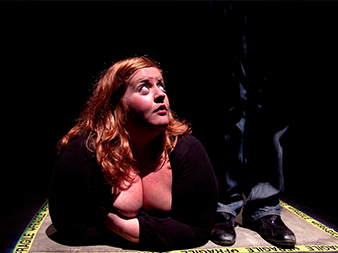
What remains when ideologies die?
A man and a woman are playing games of sexuduction. A new terrorism – an emotional one – without mediated space or meetings for a security council, but where there are attacks, refugees and usurpations, too. There’s no good or bad people here, there’s only dangerous liaisons.
This performance is born out of broken pieces of emotional terrorism.
What remains when ideologies die? Who’s the boss? Who wants to be in charge? The best way to find the victim is to look for someone with blood in her hands. Blood is no longer the proof for the crime, the murderer attacks from a distance, while the victims dirty their hands in order to stop the bleeding.
—
Co-creation | Cláudia Jardim and José Gonçalo Pais
Light design | Teatro Praga with Daniel Worm d’Assumpção
Graphic design | Triplinfinito
Production | Pedro Pires
Co-production | CENTA, Teatro Praga
2006 | DISCOTHEATER
X
2006 | DISCOTHEATER
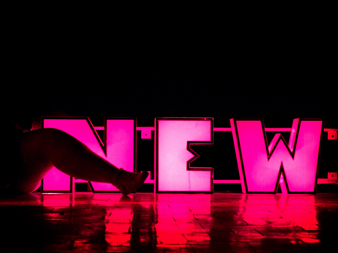
A “durational” performance.
DISCOTHEATER is a show that starts when the others end.
DISCOTHEATER is a show between History and the Zeitgeist. Between theories and facts. Between art, tradition and authority. Between correct and incorrect art. Between improvisation and skill. Between romantic sacrifice and painful triumph. Between ” Wahn und Witz ” (illusion and presence of mind). Between the dionysian and the apollonian.
The ongoing “discotheatrelization”. An assembly line of images and explosives tears of mastery. A “phantasmagoria” A “discoteatral” non-place populated by teachers who call themselves as such. Everything and everyone waiting for the light. From “Aufklärung” (enlightenment).
These days, the demand of the new stems from a consciousness that has lost its standing before the real, a quixotic drift. An impractical mastery. A desire that does not exist. A thing that doesn’t exist. Therefore, a trigger to further. And if we remember that dry leaves have fallen from a web, that there had been a storm of food on stage, that there were three thousand guests to see an empty gallery, that horses have stormed the scene, that there have been prepared hot meals served by actors-musicians, who have already built a labyrinthine landscape where viewers had to find their way, that there already has been a floor-bed filled with red carnations, what will leave us? Only to continue.
In DISCOTHEATER we feel “like we’re inside a dream. We had a wonderful dream, that we barely dare to think, because we are afraid to see it disappear. That is precisely our mission: to interpret and secure dreams. There will be nothing more than that. Let us tell you our morning dream. And we hope to wake up at the same time.” We want it to be like this.
—
Co-creation and interpretation | André e. Teodósio, Cláudia Jardim, Diogo Bento, Maria João Machado, Nelson Guerreiro, Patrícia da Silva, Pedro Penim and Vasco Araújo
Light design | Daniel d’Assumpção Worm
Production | Pedro Pires
Photography | Ângelo Fernandes and José Luís Neves
Video | André Godinho
Collaboration | Isabelle Schad
Support | O Espaço do Tempo
—
Length | 70min
M/12
—
2005 | EUROVISION
X
2005 | EUROVISION
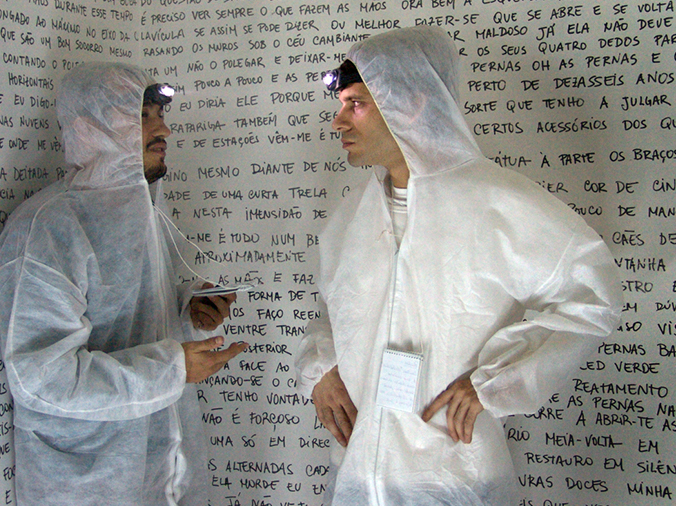
Beaux messieurs, belles dames: musique au programme / Chanteurs, à vos gammes, que le meilleur gagne / Les frontières sont ouvertes / Que déclarer si ce soir c’est la fête?
Telex, Euro-Vision
Is there such a thing as a European Identity? Can we understand each other if we speak so many different languages? This “two-man show” looks at these questions and instead of answering them, confronts the audience with more questions, in an ironic performance that, in keeping with its subject, is multilingual and uses many elements drawn from different artistic areas. To pin down Europeanness they chose as inspiration the biggest kitsch event of the common cause, the Eurovision Song Contest, where the representatives of different nations with different cultures, languages, ways of life and standards of living join in a parade of uniform tastelessness.
Europe starts with the birth of its ordinary languages and with the reaction, often alarmed, towards the eruption of the mentioned languages, start the critical culture of Europe, provoking the fragmentation drama of languages and starts to reflect about its own destiny of Multilanguage civilization. Suffering the effects of fragmentation, Europe tries to come up with a solution: looks backwards and tries to find again the Adamic language, and looks forward focusing on the construction of a language of reason as perfect as Adam’s language.
Umberto Eco
Searching for the perfect language
—
Text | Pedro Penim
Creation and Interpretation | Pedro Penim and André e. Teodósio
Light design | Daniel Worm d’Assumpção
Production | Pedro Pires, Elizabete Fragoso, Cristina Correia
Inicial version in collaboration with | Rogério Nuno Costa and Martim Pedroso
Co-production | ZDB / Transforma AC
Photography | Ângelo Fernandes, Lab8
—
Length | 60min
M/12
—
2005 | SHALL WE DANCE
X
2005 | SHALL WE DANCE
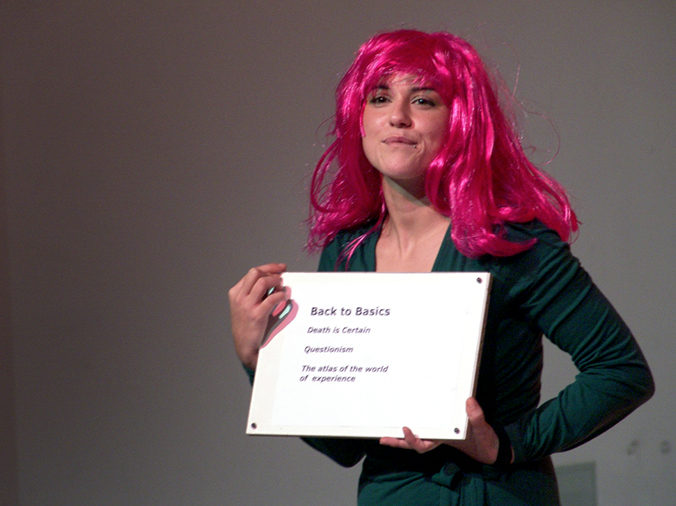
Shall We Dance is a series of short performances that occurred 5 times, from 2003-2008. A member of Teatro Praga would invite someone from the “outside” for an artistic collaboration. Shall We Dance is the fuel for exploring complicities, a surgery made by two people in order to find out different readings and accept new compromises. The performances have been made in collabroration with the following artists: Alexander Kelly, Daniel Worm d’Assumpção, Joaquim Horta, José Gonçalo Pais, José Maria Vieira Mendes, Maria João Machado, Marta Furtado, Nelson Guerreiro and Nuno Carinhas.
SHALL WE DANCE 2
2005
Co-creation | Patrícia da Silva and Nelson Guerreiro
Support | O Espaço do Tempo
-
Super-Gorila
Co-creation | André e. Teodósio and José Maria Vieira Mendes
Cast | André e. Teodósio
Special collaboration | Pedro Olivença
Light design | André e. Teodósio and José Maria Vieira Mendes
Assembly | Luís Bombico and João Leonardo
-
Hidden Track
Co-creation | Carlos Alves
SHALL WE DANCE 3
2006
Co-production | CENTA
-
Quarttet
Co-creation | Cláudia Jardim and José Gonçalo Pais
-
Our Party People
Co-creation | Sofia Ferrão and Maria João Machado
Light design | Teatro Praga with the collaboration of Daniel Worm d’Assumpção
Graphic design | Triplinfinito
Video | André Godinho
Production and communication | Pedro Pires
SHALL WE DANCE 4
2007
Co-production | Culturgest
-
Off The White
Co-creation | Paula Diogo e Alexander Kelly
Collaboration | Christopher Hall, Tracey Doxey and Mário Costa
-
Geografias e Tratados
Co-creation | Sofia Ferrão and Nuno Carinhas
Cast | Carlos Alves
- Hunting Scene
Co-creation | Cláudia Gaiolas and Daniel Worm d’Assumpção
Light design | Daniel Worm d’Assumpção
Video | André Godinho
Production and communication | Pedro Pires
Costume design | Miss Suzie
Collaboration | Pedro Carmo and DJ Alx
2005 | SUPER-GORILA
X
2005 | SUPER-GORILA
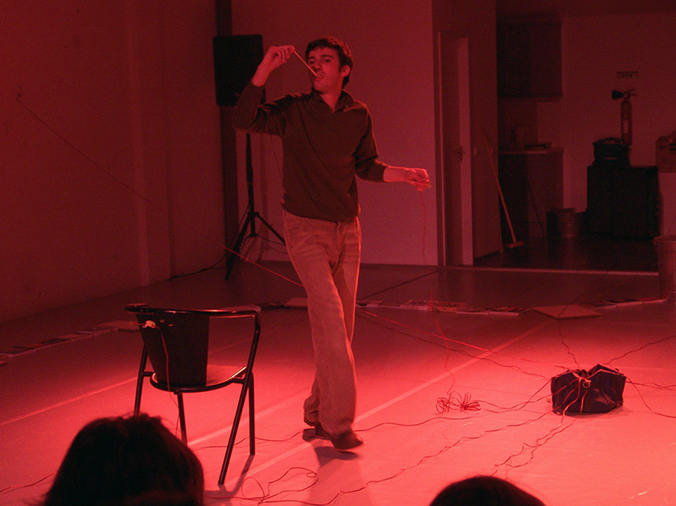
This show started in an adolescent.
We are sad and that’s ok. We’re always sad.’ There are stories that aren’t told anymore. There are things, which are wrong. There are words, which are not said. There are no reasons and there isn’t a direction. We don’t find an enemy or a guilty one. It happens a lot and everything in simultaneous. It is difficult to be still and it is also difficult to talk and to remain silent. We don’t know when it started or when it’s over, or when they are together and they are divided.
We search for it in time and we go after the string that was lost. But the memory is weak and the will is little.
This show started in an adolescent.
—
Creation | André e. Teodósio and José Maria Vieira Mendes
Graphic design | Catarina Campino and Javier Núñez Gasco
Production | Cristina Correia
Co-production | Espaço do Tempo, Teatro Praga
Running time | 40m
Language | Portuguese (with subtitles, if necessary)
—
Length | 40min
M/12
2005 | AGATHA CHRISTIE
X
2005 | AGATHA CHRISTIE
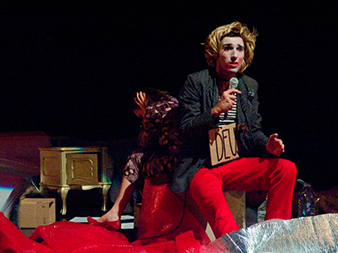
Perhaps it is difficult to speak of this show, or at least as much as the past, because there is once again the trying to do a job that does not have a successful narrative and yet be efficient at all levels and at the same time proposes to return the narrative from a story, but without going through the narrative psychology. All-time bomb.
Agatha Christie requires two different times: the time of “Whodunnit?” Where the narrative prevails, and the victory of delirium (where, paradoxically, the order is established), where there’s characters and action sequences, and pop songs (malgré tout) narratives sequences. Each item with its integrity, its limits and its own development. Everything takes its place in the whole. Each party uses its content, its tone, its pace and its formal qualities, creating a meta-pattern, a super-object.
The theme of guilt is generally handled by Agatha Christie in ”Ten Little Niggers,” destroying a basic convention of police (which is also one of the fictions of modern society): the determination of guilt, this place visible to all the evil that redeemed. The cop classic glossed ad nauseam this theme: the suspects may be many, all will have reason to kill, but in the end, one is the criminal (even when the “guilty” match two or three empirical subjects). Beyond the epistemological trust that the explanation of the mystery always transmits this determination of the guilty never fail to bring a sense of tranquility. In the words of Abel Barros Baptista:
“Once decided the question ‘Who was to blame?” All problems will dissipate and each in his own life.”
—
Co-creation and cast | André e. Teodósio, Carlos Alves, Cláudia Gaiolas, Cláudia Jardim, Diogo Bento, Patrícia da Silva, Paula Diogo, Pedro Penim, Sandra Simões and Sofia Ferrão
Light design and technical direction | Daniel Worm d’Assumpção
Production direction and communication | Pedro Pires
Co-production | Culturgest, Teatro Praga
Graphic design | Triplinfinito
Photography | Ângelo Fernandes and Sofia Ferrão
2004 | FIVE STARS
X
2004 | FIVE STARS
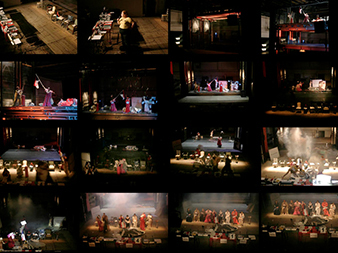
5***** is an hour for celebration, of evocation of old ghosts and new provocation of news ones.
5 ***** is a show that involves the history of portuguese theatre and Teatro Praga (which celebrates, in 2005, 10 years of activity), confering, naming, giving advice in the form of prescriptions on how to build 5 *****, a show that continues its obsession with Nietzschean nihilism (and Artaud, why not), the postmodernism of Derrida, and the search for language and meaning of Steiner, plus Montaigne, Benjamin and Castoriadis which exchanges the said by the unsaid, the laughter by crying, the truth by false, exchange the names themselves, self-questioning, which relies on things without knowing the background story, which opens every day, all the time, more songs, costumes, smoke, smoke a lot (the eternal portuguese dilemma)…
5***** is an hour for celebration, of evocation of old ghosts and new provocation of news ones.
—
Co-creation and interpretation | André e. Teodósio, Carlos Alves, Cláudia Gaiolas, Cláudia Jardim, Paula Diogo, Pedro Penim, Pedro Pires, Patrícia da Silva, Sandra Simões and Sofia Ferrão
Light design | Pedro Domingos
2004 | TITLE
X
2004 | TITLE
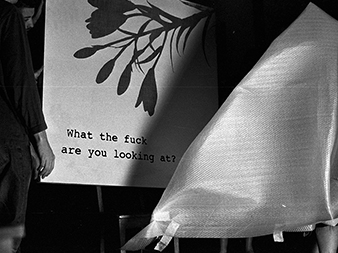
Título (Title) provides the public a choice: to pay or not pay. The choice is decisive in defining the role of each in the show: every place you choose, every angle, every movement and every spoken word are subject to an exhaustive stamp of true or false. Fiction and document are located here, in the same dimension.
The show called Título (Title) is a series of “fake parts” who do not intend to “retract” and that inevitably will be lost trying to find meaning in objects that doubt themselves. Questions that come to replace the security by false gods old and new gods explains Arno Gruen*, means a release of “old submissions” with “new authorities.”
Título (Title) intends to give evidence of the truth in a minefield of lies. Want to label projects simultaneously impregnated veracity of articles as false as the Ming jars of 300 stores.
Stepping these anti-personnel mines is as exciting as inappropriate or vain.
It seems that this show called Título (Title), as these tautologies and contradictions, is purely formal, meaningless and says nothing about the world. But it is also considering its status as spectacle essential, as are the tautologies in the field of logic, which states the laws without which thought and discourse are inconsistent.
If the tautological statements like: “My name is name” are necessarily true a priori and the opposite (a contradiction) is a logic preposition necessarily false when applied to three-dimensional theatrical convention they all shuffle and confront this falsity space par excellence, as a rule, is situated at the antipodes of perception and understanding of hyper-realist cinema.
*False Gods, Arno Gruen, Peace Media Publishing Ltd., 1997 Lisbon, translation by Lumir Nahodil.
—
Co-creation and cast | Carlos Alves, Catarina Campino, Cláudia Jardim, Javier Núñez Gasco, Patricia da Silva and Pedro Penim
Production and communication | Pedro Pires
Photography | Sofia Ferrão and Hélio Mateus
Support | O Espaço do Tempo
2004 | ON THE TABLE THE KNIFE
X
2004 | ON THE TABLE THE KNIFE
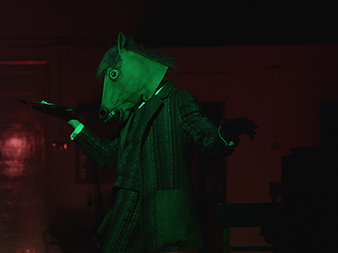
In a ring, and in constant turmoil, parade many different questions.
Axes / After Whose stroke the wood rings, / And the echoes!…
“Words,” Sylvia Plath
Sobre a mesa a faca (On the table a knife) is a co-produced show by the companies and Cão Solteiro and Teatro Praga, which features a collaborative effort and a clash of identities and, continuing the recent work of both companies, is a work that is both as an essay both visual/vital, of open reading.
In a ring, and in constant turmoil, parade many different questions: what is public and what is private? What is mine and what is yours? We will fight? Who will survive? Who will have more power? Will someone annihilate anyone? A universe transparent or reflective? What is truth and what is lie? Who are you and who am I? Is it real or invented? They are looking at me or are you looking at you? I am a microbe on the knife? And the table, the world? And I, and me (cue the music)…
Must: There is no table. There is no knife. There is no tendency to set the show according to a simple rule or in a single scene or activity. It’s not about anything. It’s about all. There is only one place where you can talk. Do not talk only to the audience. Do not talk. Speak.
There to be: The characters finally are welcome. There is the trash of the world. There are hands that are raised in favor of attention. There are second skins for protection. There’s a city. There’s the city and its texts. There are artists and their texts. There are talks/interviews. There is individual recognition from a structure of “hostage of the other.” And the city stands. And the city crumbles. There’s the anthem of America. There is money, big money. There is death without blood. There are wounds with blood. There is a dog with fever, barking plagues. There are voices from beyond. There is the here and now. And nothing else.
—
Co-creation and interpretation | André e. Teodósio, Carlos Alves, Marcello Urgeghe, Paula Sá Nogueira, Pedro Penim and Sofia Ferrão
Supporting drama | Manuela Correia
Costume design | Mariana Sá Nogueira
Set design | Nuno Carinhas
Seamstress | Teresa Louro, Palmira Abranches and Natália Ferreira
Production and communication | Pedro Pires
Co-production | Cão Solteiro
Graphic design | Triplinfinito
2003 | PRIVATE LIVES
X
2003 | PRIVATE LIVES
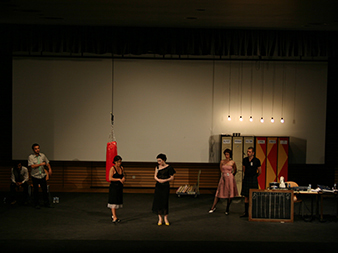
A decisive gesture of launching dices decides the price of the ticket. The distribution of four parts by the six actors is an offered Russian Roulette, on tray, to the public. It will be Serendipity, Book-Crossing, Random Order, Nietzsche (!) and Love (!!?) birds of a feather? A bag with a white ball and a black ball called chance.
It is for it to rule, for each day the chance of some 72 possible combinations that we know exist in this show. But we already warn that the exponential is infinite, and that the hand that rocks the dice cup is the hand that will determine the course of events.
From Noël Coward we still do not know if we like. We never understood in which part of the gray and infinite zone ranging from the intellectual dandy to the futile queer he is situated. In this slippery territory, in this swamp, which will operate the building and part of the piece and of the show. It is here that the cool and efficient Noël Coward’s universe suffers a blow of fate: the staging (actors and audience) of this show will never be more than one product sample and the assumption of the results. And nobody shifted its consequences.
—
Nomination
WINNER | “Decade Theatre 2003” Prize | Clube Português de Artes e Ideias | categ. Best Director and Best Actress
—
Text | Noël Coward
Translation | Carlos Falcão
Co-creation and interpretation | André e. Teodósio, Carlos Alves, Cláudia Jardim, Paula Diogo, Patrícia da Silva, Pedro Penim and Sofia Ferrão
Styling | Sofia Aparício
Executive producer | Pedro Pires
Graphic design | Paula Veiga
2003 | SUDDENLY ME
X
2003 | SUDDENLY ME

The reconstruction of a death.
This involves the reconstruction of a death.
Writing from The Night and the Laughter by Nuno Bragança, this piece brings up the freezing of a moment and revisit a past: a sweep by permanent visual memory of someone.
This reconstitution is also synonymous with reconstruction. Reconstruction of a wreck or an empty space. Reconstruction of a life or a moment of decision and decisive. A reconstruction deconstructed and deprived of continuity. A reconstruction made of opportunities and of vampire advantages of locations, stories, viewers, writers and performers.
—
Awards
HONORABLE MENTION | ACARTE / Madalena Perdigão 2003 prize
—
Text | Pedro Penim, from The Night and the Laughter by Nuno Bragança
Set design | Pedro Penim
Cast | André e. Teodósio, Cláudia Gaiolas, Cláudia Jardim and Tiago Matias
Production director | Maria João Fontaínhas
Executive producer | Ana Rita Osório and Pedro Pires
Photography | Sofia Ferrão
Co-production | C ª Teatro de Sintra / Transforma AC
—
Length | 60min
M/12
2002 | MONTH IN THE COUNTRY
X
2002 | MONTH IN THE COUNTRY
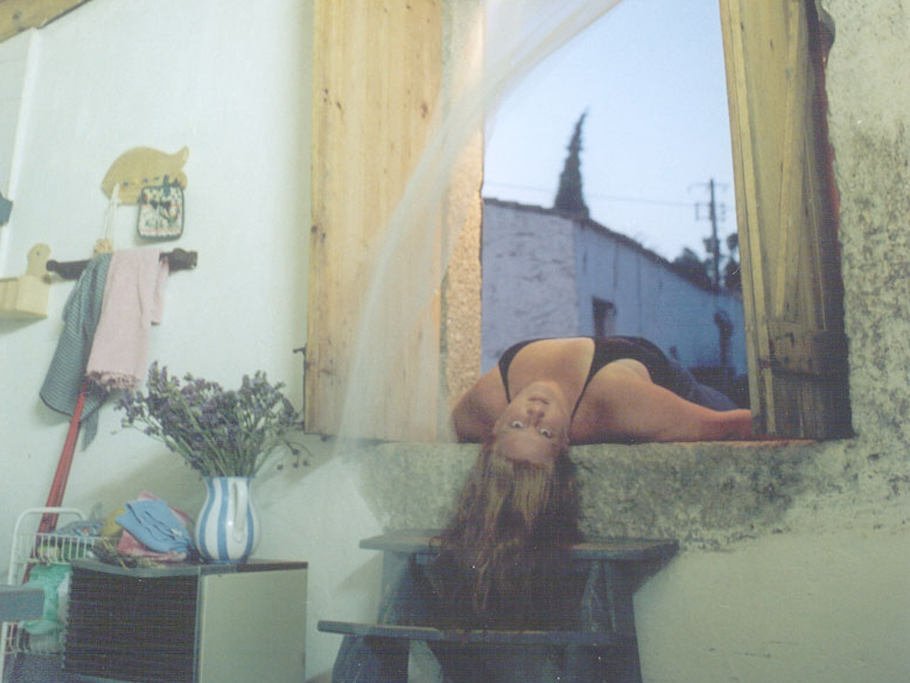
For Turgueniev, Um mês no campo (A month in the country), refers to the stay of Belyaev in the Islaev’s property, but for us, Teatro Praga, also meant a month of residence, experimentation and confrontation in CENTA in Vila Velha de Ródão.
The proposal was an unusual spectacle, which differed from day to day, with no markings and which took our passage in a natural environment for a battlefield (the theater).
The work we have done from this classic russian theater of the nineteenth century assumed a relationship with a kind of weird, the countryside, engine of a casuistic experience around successive trips in love.
We supported ourselves in the legacy of the author and reflected on the possibility of void and nihil, and, stretching over the rope, put on stage the “safe value” of the interruption, the exchange between object and subject of art, pleasure and the opposite drive of a text written more than a century ago, that we brought to reality and to sensitive life of the actors and co-creators.
Winner project of the “Decade Theatre 2003”, by Clube Português de Artes e Ideias in the Restitution category.
_
Text | Ivan Turgueniev
Translation and version | Pedro Penim, from the english translation by Richard Freeborn (A Month in the Country, ed. Oxford University Press, 1991) and France’s Denis Roche, reviewed by Françoise Flamand (Un mois à la campagne, ed. Gallimard, 1995)
Co-creation and cast | André e. Teodósio, Carlos Alves, Cláudia Jardim, Patrícia da Silva, Pedro Penim and Sofia Ferrão
With the collaboration of Cláudia Gaiolas, David Dias, Hugo Sovelas, Ivo Serra, Pedro Martinez and Sandra Simões
Video and light design | Paul Simões
Graphic design | Elsa Guimarães
Production and communication | Pedro Pires
Photography | Sandra Ramos and Sofia Ferrão
2001 | DEEP DELAY
X
2001 | DEEP DELAY
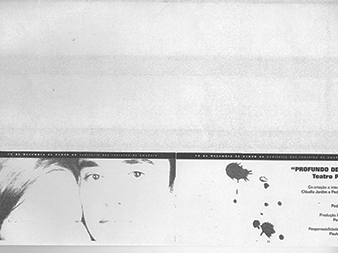
In 2001 I was invited by Jorge Silva Melo to think of a text and a performance for the event A Table and Two Chairs. I wrote and co-directed a text about the city or the cities. I always though of Lapland as a starting point and a homonymous song by the Finnish singer Monica Aspelund as a way to put my writing into practice.
The result is a series of sketches, that are more or less “lounge”. A cosmopolitan “féerie”, that mixes London, Paris and Rome with long Winters in Crimea or Tirana, Halloween nights at Virginia Beach and fast trips through “Avenida da República” in Lisbon. It is all accompanied by what I consider to be the manifestation of the divine in a city: power cuts.
Since I didn’t have any record by Burt Bacharach at the time, I thought a lot about Tony de Matos and Vodka Martini and I dedicated one of the sketches to both of them. More or less “lounge”. For me and Cláudia it was conditio sine qua non that this had to be a happy performance on a happy city. And that’s what it is.
—
“Profundo Delay” was reenacted by Ana Tang and Paulo Pascoal in 2017, during ACREÇÃO – reenactments cycle of portuguese performances.
—
Co-creation and cast | Cláudia Jardim and Pedro Penim
Text | Pedro Penim
Executive production | Pedro Pires
Technical responsibility | Paulo Simões
Photography | Sandra Ramos
2017 | ROMEO & JULIET
X
2017 | ROMEO & JULIET

Inspired by William Shakespeare’s classical play, the performers tell the story of this ill-fated romance, while baking a cheesecake named after the two main characters. The blood of the lovers is guava jam, the sword fights are performed with spatulas and a bite of a Rich Tea biscuit can be a delicious alternative to a broken heart. After the success of Hamlet sou eu and GrandaPinta, Teatro Praga are returning to Teatro Maria Matos with a surprising interpretation of Shakespeare’s classic play.
Text and creation | Cláudia Jardim, Diogo Bento and Pedro Penim
Cast | Cláudia Jardim and Diogo Bento
Head of production | Andreia Carneiro
Production | Alexandra Baião
Co-production | Teatro Praga, Maria Matos Teatro Municipal, Teatro Municipal do Porto, Teatro Viriato and Centro de Artes de Ovar
Photography | Bernardo Gramaxo
—
Length | 75 min
M/6
—
Bookings: producao@teatropraga.com
2024 | Pais e Filhos
X
2024 | Pais e Filhos

‘Authorship is always co-authorship,’ wrote Mario Bagioli. Although it is indeed my name in the signature, there are many thoughts that generate the content of the show, many ideas, birthed by many thinkers. It starts with a biographical fact: for three years now, my husband and I have been involved in a process of creating a new life, a process in which I leave my unique identity as a son, adding to it that of a father. And we’re doing it…
—
ed.______, a seal which comprises two collections – “Series” and “Sequence” -, results from the collaboration between the Teatro Praga and the publisher Sistema Solar, with the coordination of André e. Teodósio and José Maria Vieira Mendes
The “Series” collection discloses the intangible heritage of contemporary performing arts. “Sequence” collection is organised in thematic books from different disciplines, which offer a reflection on systems of power and protest in the present time.
—
A Teatro Praga / Sistema Solar edition (chancela ed .______), 2022
Title | Pais e Filhos
Author | Pedro Peni,
Coordination | André e. Teodósio & José Maria Vieira Mendes
Design | Horácio Frutuoso
—
+Available for purchase soon
+For more information contact producao@teatropraga.com
2024 | Pais e Filhos
X
2024 | Pais e Filhos

“Autoria é sempre coautoria”, escreveu Mario Bagioli. Embora seja realmente o meu nome na assinatura, são muitos os pensamentos que geram o conteúdo do espetáculo, são muitas as ideias, paridas por muitos pensadores. Começa com um facto biográfico: há já três anos que eu e o meu marido estamos envolvidos num processo de criar uma nova vida, um processo em que deixo a minha condição identitária única de filho para lhe agregar também a de pai. E estamos a fazê-lo…
______
ed.___________, uma chancela composta por duas coleções – “Série” e “Sequência” -, resulta da colaboração entre o Teatro Praga e a editora Sistema Solar, com coordenação de André e. Teodósio e José Maria Vieira Mendes. A coleção “Série” divulga o património imaterial das artes performativas contemporâneas. A coleção “Sequência” organiza-se em livros temáticos oriundos de diversas disciplinas, que ofereçam uma reflexão sobre sistemas de poder e protesto na atualidade.
Título | Pais e Filhos
Autora | Pedro Penim
Uma edição | Teatro Praga / Sistema Solar (chancela ed._______, 2023)
Direcção da colecção | José Maria Vieira Mendes e André e. Teodósio
Design | Horácio Frutuoso
—
+Disponível para aquisição em breve
+Para mais informações sobre a sua compra contactar producao@teatropraga.com
2024 | Vaxzevria Cantus
X
2024 | Vaxzevria Cantus

This colourful book (and black, and white) talks about the music that has survived, the music that has opposed the lethargy of lockdowns, that has overcome depression and fought back, that has been clandestine, the music that today, perhaps more than at other times in human history, is revolutionary.
It’s incredible how, in 2020 and the two years since, music hasn’t stopped. It happened, and it happened as an act of refusal of fear and anguish, of authoritarian measures […] of defiance of the apparent fate that seemed to have taken away all our free will. The period between 2020 and 2022 (and even 2023) saw the accentuation of a spirit of systemic change, as the Spaniard Paul B. Preciado describes so well in his Dysphoria. Preciado in his Dysphoria mundi. And it is the sound of a generalised and deep depression, also suffered by this author.
[…]
With the disease that exposed the authoritarian nature of liberal democracies and the degeneration of social infra- and supra-structures and human relations, also came the vaccine: the germination of an insurrectionary spirit that, for the time being and in this country, only manifests itself culturally and artistically.
—
ed.______, a seal which comprises two collections – “Series” and “Sequence” -, results from the collaboration between the Teatro Praga and the publisher Sistema Solar, with the coordination of André e. Teodósio and José Maria Vieira Mendes
The “Series” collection discloses the intangible heritage of contemporary performing arts. “Sequence” collection is organised in thematic books from different disciplines, which offer a reflection on systems of power and protest in the present time.
—
A Teatro Praga / Sistema Solar edition (chancela ed .______), 2022
Title | Vaxzevria Cantus — Music during the Pandemic
Author | Rui Eduardo Paes
Coordination | André e. Teodósio & José Maria Vieira Mendes
Design | Horácio Frutuoso
—
+Available for purchase here
+For more information contact producao@teatropraga.com
2024 | Vaxzevria Cantus
X
2024 | Vaxzevria Cantus

Este livro colorido (e negro, e branco) fala sobre a música que sobreviveu, sobre a música que se opôs à letargia dos enclausuramentos, que ultrapassou a depressão e deu luta, que foi clandestina, sobre a música que hoje, talvez mais do que em outros momentos da história humana, é revolucionária.
É incrível como, em 2020 e nos dois anos que se seguiram, a música não tenha parado. Aconteceu, e aconteceu como um acto de recusa do medo e da angústia, das medidas autoritárias […] de desafio ao aparente destino que parecia ter-nos retirado todo o livre-arbítrio. O período entre 2020 e 2022 (e ainda 2023) foi de acentuação de um espírito de mudança sistémica, como muito bem descreve o espanhol Paul B. Preciado no seu Dysphoria mundi. E é o som de uma generalizada e profunda depressão, sofrida também por este autor que vos escreve.
[…]
Com a doença que denunciou a natureza autoritária das democracias liberais e a degenerescência das infra e supra-estruturas sociais e das relações humanas, veio igualmente a vacina: a germinação de um espírito insurreccional que, para já e neste país, apenas se manifesta cultural e artisticamente.
______
ed.___________, uma chancela composta por duas coleções – “Série” e “Sequência” -, resulta da colaboração entre o Teatro Praga e a editora Sistema Solar, com coordenação de André e. Teodósio e José Maria Vieira Mendes. A coleção “Série” divulga o património imaterial das artes performativas contemporâneas. A coleção “Sequência” organiza-se em livros temáticos oriundos de diversas disciplinas, que ofereçam uma reflexão sobre sistemas de poder e protesto na atualidade.
Título | Vaxzevria Cantus — A Música nos Anos de Pandemia
Autora | Rui Eduardo Paes
Uma edição | Teatro Praga / Sistema Solar (chancela ed._______, 2023)
Direcção da colecção | José Maria Vieira Mendes e André e. Teodósio
Design | Horácio Frutuoso
—
+Disponível para aquisição aqui
+Para mais informações sobre a sua compra contactar producao@teatropraga.com
2024 | Blue Kida
X
2024 | Blue Kida

I’m queer, trans, non-binary and punk. I’m gender euphoria, chameleon and mutant body. I’m the mermaids who always come to the shore to cry. It’s a bitch to survive as a sexual body in its most pluri-multi-meta trans-dimensions. This book revels in all the traumas and violence of being a dissident body.
A multidisciplinary artist, AURORA is a performer/dancer, musician/producer, actress and model. Throughout her artistic career, she has developed the projects “AL13NS ANTL3RS” (Lisbon), “NYMPHO MANIAC” (Belgium, Norway, Portugal), “AURORA DE AREIA” (Lisbon, Porto, Montemor), “HETEROPTERA” (Lisbon, Porto), “VELVET N’ GOLDMINE” (Lisbon, Porto, Santa Maria da Feira).In the field of music, she has published “UND3RW0RLD” (LP), “X V. AME3” (EP), “FLESH AGAINST FLESH” (LP) and “UTERUS” (EP).In 2018, she premiered the short film “AURORA” in collaboration with Carlota Flor (United States, England, Portugal) and, in 2019, she released the book “APOCALYPSE” by Sapata Press (Portugal, Brazil). In 2022, she starred in the film “Uma Rapariga Imaterial” by André Godinho and, in 2020, in the series “Secreto Lx” by Patrick D’Orlando. Her first film was “Ela É Uma Música” by Francisca Marvão (2019), and she also collaborated on the series “Meu Sangue” by Tota Alves (2019). In 2013, she completed a contemporary dance course at Balleteatro (Porto).
—
ed.______, a seal which comprises two collections – “Series” and “Sequence” -, results from the collaboration between the Teatro Praga and the publisher Sistema Solar, with the coordination of André e. Teodósio and José Maria Vieira Mendes
The “Series” collection discloses the intangible heritage of contemporary performing arts. “Sequence” collection is organised in thematic books from different disciplines, which offer a reflection on systems of power and protest in the present time.
—
A Teatro Praga / Sistema Solar edition (chancela ed .______), 2022
Title | Blue Kida
Author | Aurora
Coordination | André e. Teodósio & José Maria Vieira Mendes
Design | Horácio Frutuoso
—
+Available for purchase here
+For more information contact producao@teatropraga.com
2024 | Blue Kida
X
2024 | Blue Kida

Sou queer, trans, não-binária e punk. Sou euforia de género, chameleon e corpa mutante. Sou as sereias que vêm sempre à margem chorar. É fodido sobreviver enquanto corpa sexual nas suas mais pluri-multi-meta transdimensões. Este livro deleita todos os traumas e violências enquanto carpa dissidente.
Artista multidisciplinar, AURORA é performer/bailarina, música/produtora, actriz e modelo. Ao longo do seu percurso artístico, desenvolveu os projectos «AL13NS ANTL3RS» (Lisboa), «NYMPHO MANIAC» (Bélgica, Noruega, Portugal), «AURORA DE AREIA» (Lisboa, Porto, Montemor), «HETEROPTERA» (Lisboa, Porto), «VELVET N’ GOLDMINE» (Lisboa, Porto, Santa Maria da Feira).Na área da música, editou «UND3RW0RLD» (LP), «X V. AME3» (EP), «FLESH AGAINST FLESH» (LP) e «UTERUS» (EP).Em 2018, estreou a curta-metragem «AURORA» em colaboração com Carlota Flor (Estados Unidos, Inglaterra, Portugal) e, em 2019, lançou o livro «APOCALYPSE» pela editora Sapata Press (Portugal, Brasil). Em 2022, protagonizou o filme «Uma Rapariga Imaterial» de André Godinho e, em 2020, a série «Secreto Lx» de Patrick D’Orlando. O seu primeiro filme foi «Ela É Uma Música» de Francisca Marvão (2019), e também colaborou na série «Meu Sangue de Tota Alves (2019).Em 2013, terminou o curso de dança contemporânea no Balleteatro (Porto).
ed.___________, uma chancela composta por duas coleções – “Série” e “Sequência” -, resulta da colaboração entre o Teatro Praga e a editora Sistema Solar, com coordenação de André e. Teodósio e José Maria Vieira Mendes. A coleção “Série” divulga o património imaterial das artes performativas contemporâneas. A coleção “Sequência” organiza-se em livros temáticos oriundos de diversas disciplinas, que ofereçam uma reflexão sobre sistemas de poder e protesto na atualidade.
Título | Blue Kida
Autora | Aurora
Uma edição | Teatro Praga / Sistema Solar (chancela ed._______, 2023)
Direcção da colecção | José Maria Vieira Mendes e André e. Teodósio
Design | Horácio Frutuoso
—
+Disponível para aquisição aqui
+Para mais informações sobre a sua compra contactar producao@teatropraga.com
2023 | It’s Our Idea! (Art, Philosophy and World)
X
2023 | It’s Our Idea! (Art, Philosophy and World)

A book with contributions by André Barata, André Godinho, André Teodósio, António Guerreiro, Béatrice Joyeux-Prunel, Catarina Pombo Nabais, Boris Groys, Filipe Sambado, João Constâncio, José Maria Vieira Mendes, Luísa Semedo, Maribel Sobreira, Nuno Fonseca, Peter Trawny, Susana Mendes Silva, Yara Monteiro, Yves Michaud.
‘This book, which collects conversations around Art and Philosophy, seeks to make the thoughts of those who do philosophy, as well as those who do art, accessible. The privilege of having brought together such disparate people, as well as the propitiousness of the registered outcomes, has meant that these conversations, the face-to-face meetings between artists and philosophers and the reflections based on these materials now exist in an object that wants to live on beyond the memory of the event that generated them. That was the idea! And so, an idea became a book, that became many ideas, since the it’s our idea. (…) Once the debate is open, the questions will not be answered without questions addressed to the questions themselves – Can art even, in principle, be expected to transform the world? And is the understanding of the world a meaningful question? As if the questions were realities to be observed from this or that perspective, with an analytical step back, before being opened up – and opened up they will be – in the exploration of the answers they may contain.
[André Barata]
—
ed.______, a seal which comprises two collections – “Series” and “Sequence” -, results from the collaboration between the Teatro Praga and the publisher Sistema Solar, with the coordination of André e. Teodósio and José Maria Vieira Mendes
The “Series” collection discloses the intangible heritage of contemporary performing arts. “Sequence” collection is organised in thematic books from different disciplines, which offer a reflection on systems of power and protest in the present time.
—
A Teatro Praga / Sistema Solar edition (chancela ed .______), 2022
Title | The Idea is Ours! (Art, Philosophy and World)
Authors |André Barata, André Godinho, António Guerreiro, Béatrice Joyeux-Prunel, Boris Groys, Catarina Pombo Nabais, Filipe Sambado, João Constâncio, Luísa Semedo, Maribel Sobreira, Nuno Fonseca, Peter Trawny, Susana Mendes Silva, Yara Monteiro, Yves Michaud
Organized by | André Barata, André e. Teodósio & José Maria Vieira Mendes
Coordination | André e. Teodósio & José Maria Vieira Mendes
Design | Horácio Frutuoso
—
+Available for purchase here
+For more information contact producao@teatropraga.com
2023 | A Ideia É Nossa! (Arte, Filosofia e Mundo)
X
2023 | A Ideia É Nossa! (Arte, Filosofia e Mundo)

Este livro, que colige conversas em torno de Arte e Filosofia, procura tornar acessível o pensamento de quem faz filosofia, bem como de quem faz arte. O privilégio de se ter juntado gente tão díspar, bem como a felicidade dos registos, permitiram que as conversas, os frente-a-frente entre artistas e filósofos e as reflexões a partir destes materiais existam agora num objecto que quer viver para lá da memória do evento que os gerou. Foi esta a ideia! E assim uma ideia virou um livro que virou muitas ideias, porque a ideia é nossa.
Convidámos Béatrice Joyeux-Prunel, Boris Groys e Catarina Pombo Nabais para debater a questão «Pode mesmo a arte transformar o mundo?» e Luísa Semedo, Peter Trawny e Yves Michaud para enfrentar esta outra: «Como nos vamos entender com o mundo?». Juntos perseguimos duas perguntas com genealogia, a primeira a fazer ecoar o repto à transformação do mundo numa marcante tese de Marx sobre Feuerbach, e a outra a reverberar, ainda que de maneiras muito diferentes, a pergunta sobre como vivermos juntos que animou os cursos de Roland Barthes no Colégio de França, ainda nos anos 70 do século passado. Nas duas questões, o mundo foi o elemento comum, entre a filosofia e a arte, as possibilidades do entendimento e da transformação. Aberto o debate, a resposta às questões não se fará sem perguntas dirigidas às próprias questões — Pode sequer, por princípio, esperar-se que a arte transforme o mundo? E é o entendimento com o mundo uma questão com sentido? Como se as perguntas fossem realidades a observar desta e daquela perspectiva, com um recuo analítico, antes de serem abertas — e abertas serão — na exploração das respostas que possam conter.
[André Barata]
ed.___________, uma chancela composta por duas coleções – “Série” e “Sequência” -, resulta da colaboração entre o Teatro Praga e a editora Sistema Solar, com coordenação de André e. Teodósio e José Maria Vieira Mendes. A coleção “Série” divulga o património imaterial das artes performativas contemporâneas. A coleção “Sequência” organiza-se em livros temáticos oriundos de diversas disciplinas, que ofereçam uma reflexão sobre sistemas de poder e protesto na atualidade.
Título | A Ideia É Nossa! (Arte, Filosofia e Mundo)
Organização | André Barata, André e. Teodósio, José Maria Vieira Mendes
Autorxs | André Barata, André Godinho, António Guerreiro, Béatrice Joyeux-Prunel, Boris Groys, Catarina Pombo Nabais, Filipe Sambado, João Constâncio, Luísa Semedo, Maribel Sobreira, Nuno Fonseca, Peter Trawny, Susana Mendes Silva, Yara Monteiro, Yves Michaud
Uma edição | Teatro Praga / Sistema Solar (chancela ed._______, 2023)
Direcção da colecção | José Maria Vieira Mendes e André e. Teodósio
Design | Horácio Frutuoso
—
+Disponível para aquisição aqui
+Para mais informações sobre a sua compra contactar producao@teatropraga.com
2023 | The Sonic Construction of Mozambique (1974—1994)
X
2023 | The Sonic Construction of Mozambique (1974—1994)

Nataniel Ngomane: “A pioneering work and, from the outset, a very important reference tool for future work not only in the musical and sound fields…”
“A pioneering work and, from the outset, a very important reference tool for future work not only in the musical and sound fields…”
[Nataniel Ngomane]
“This book by Marco Roque de Freitas is a systematized theoretical approach to the musical experience of Mozambique, an approach based on a solid foundation covering a period of transition, above all political – from 1974 to 1994 – and on the ‘identification’ of the main processes that led to its relationship with a social construction. […] Even considering the existence of some works of similar nature in Mozambique, we have no difficulty in considering this one, for its depth and intensity, as a pioneering work and, from the outset, a very important reference tool for future work not only in the musical and sound area, but also in other areas of the arts and others, such as the history of Mozambique, anthropology, political sciences, among many more.
[Nataniel Ngomane]
This work provides strong evidence of the importance of the media for ethnomusicological analysis. The processes of broadcasting and record production are part of a narrative that highlights the role of technology, industrial and commercial procedures in shaping music – and not just in its reproduction, but also in its relationship with the territories and populations of Mozambique. In fact, the cultural and territorial diversity of Mozambique poses enormous challenges for research.
[João Soeiro de Carvalho]
—
ed.______, a seal which comprises two collections – “Series” and “Sequence” -, results from the collaboration between the Teatro Praga and the publisher Sistema Solar, with the coordination of André e. Teodósio and José Maria Vieira Mendes
The “Series” collection discloses the intangible heritage of contemporary performing arts. “Sequence” collection is organised in thematic books from different disciplines, which offer a reflection on systems of power and protest in the present time.
—
A Teatro Praga / Sistema Solar edition (chancela ed .______), 2022
Title | The Sonic Construction of Mozambique 1974-1994
Author | Marco Roque de Freitas
Coordination | André e. Teodósio, José Maria Vieira Mendes
Presentation | João Soeiro de Carvalho, Nataniel Ngomane
Design | Horácio Frutuoso
—
+Available for purchase here
+For more information contact producao@teatropraga.com
2023 | A Construção de Sonora de Moçambique 1974—1994
X
2023 | A Construção de Sonora de Moçambique 1974—1994

Nataniel Ngomane: «Um trabalho pioneiro e, desde logo, importantíssima ferramenta referencial para trabalhos futuros não somente na área musical e sonora…»
O que nos é apresentado neste livro de Marco Roque de Freitas é, efetivamente, uma abordagem teórica sistematizada da experiência musical de Moçambique, abordagem assente na base sólida que cobre o período de transição, sobretudo política — de 1974 a 1994 —, e «identificando os principais processos que levaram à sua relação com a construção social». Essa experiência musical é acrescida da experiência sonora, no sentido já descrito, como elemento com função central na construção da nação moçambicana. Desse ponto de vista, mesmo considerando a existência de alguns trabalhos de natureza similar em Moçambique, não temos nenhuma dificuldade em considerar este, na sua profundidade e intensidade, como um trabalho pioneiro e, desde logo, importantíssima ferramenta referencial para trabalhos futuros não somente na área musical e sonora, mas também noutras áreas das artes e outras, como da história de Moçambique, da antropologia, ciências políticas, entre muitas outras.
[Nataniel Ngomane]
Nesta obra é robusta a evidência da importância dos media para a análise etnomusicológica. Os processos da radiodifusão e da produção discográfica fazem parte de uma narrativa que sublinha o papel da tecnologia e dos procedimentos industriais e comerciais na configuração da música — e não apenas na sua reprodução, bem como a sua relação com os territórios e as populações de Moçambique. De facto, a extensão e diversidade cultural e territorial de Moçambique coloca à investigação desafios de enorme dimensão. O presente trabalho, fruto de uma investigação etnomusicológica extensa, aprofundada e centrada em Maputo e na sua área de influência mais próxima, constitui um importante testemunho daquilo que falta compreender, e das limitações com que ainda nos deparamos no projeto de conhecer a música em Moçambique.
[João Soeiro de Carvalho]
ed.___________, uma chancela composta por duas coleções – “Série” e “Sequência” -, resulta da colaboração entre o Teatro Praga e a editora Sistema Solar, com coordenação de André e. Teodósio e José Maria Vieira Mendes. A coleção “Série” divulga o património imaterial das artes performativas contemporâneas. A coleção “Sequência” organiza-se em livros temáticos oriundos de diversas disciplinas, que ofereçam uma reflexão sobre sistemas de poder e protesto na atualidade.
Título | A Construção de Sonora de Moçambique 1974—1994
Autor |Marco Roque de Freitas
Apresentação | João Soeiro de Carvalho, Nataniel Ngomane
Uma edição | Teatro Praga / Sistema Solar (chancela ed._______, 2023)
Direcção da colecção | José Maria Vieira Mendes e André e. Teodósio
Design | Horácio Frutuoso
—
+Disponível para aquisição aqui
+Para mais informações sobre a sua compra contactar producao@teatropraga.com
2022 | A Body as Listening
X
2022 | A Body as Listening

Are you there? Can you touch this? (Listening is touching at the distance)
This book unfolds from the perspective of a musical practice by taking your body as part of this resonant cartography.
It will imply exploring all kinds of (im)possible resonant and vibratory processes.
All entities responsible for this book cannot, however, predict ‘what a body can do’ or take entire responsibility for ‘its’ actions or outcomes.
By navigating the two streams in this book, you agree with the fact that we do not provide the best experience, therefore agreeing to and feeding the possibility of failure.
ed.______, a seal which comprises two collections – “Series” and “Sequence” -, results from the collaboration between the Teatro Praga and the publisher Sistema Solar, with the coordination of André e. Teodósio and José Maria Vieira Mendes
The “Series” collection discloses the intangible heritage of contemporary performing arts. “Sequence” collection is organised in thematic books from different disciplines, which offer a reflection on systems of power and protest in the present time.
—
A Teatro Praga / Sistema Solar edition (chancela ed .______), 2022
Title | a body as listening – resonant cartography of music immaterialities
Author | Joana Sá
Coordination | André e. Teodósio e José Maria Vieira Mendes
Design | Horácio Frutuoso
+Available for purchase here
+For more information contact producao@teatropraga.com
2022 | A Body as Listening
X
2022 | A Body as Listening

Are you there? Can you touch this? (Listening is touching at the distance)
Este livro desdobra-se a partir da perspetiva de uma prática musical, tomando o corpo como parte de uma cartografia ressonante. Isto implica explorar todo o tipo de processos ressonantes e vibratórios tomados como (im)possíveis.
Todas as entidades responsáveis por este livro não podem, porém, prever ‘o que pode um corpo fazer’ ou acusar total responsabilidade pelas ‘suas’ ações e consequências.
Ao navegar nas duas correntes deste livro, x leitorx concorda com o facto de que não estamos a providenciar a melhor experiência, concordando portanto (e alimentando) a possibilidade do falhanço.
_____
ed.___________, uma chancela composta por duas coleções – “Série” e “Sequência” -, resulta da colaboração entre o Teatro Praga e a editora Sistema Solar, com coordenação de André e. Teodósio e José Maria Vieira Mendes. A coleção “Série” divulga o património imaterial das artes performativas contemporâneas. A coleção “Sequência” organiza-se em livros temáticos oriundos de diversas disciplinas, que ofereçam uma reflexão sobre sistemas de poder e protesto na atualidade.
Título | a body as listening – resonant cartography of music (im)materialities
Autora | Joana Sá
Uma edição | Teatro Praga / Sistema Solar (chancela ed._______, 2022)
Direcção da colecção | José Maria Vieira Mendes e André e. Teodósio
Design | Horácio Frutuoso
+Disponível para aquisição aqui
+Para mais informações sobre a sua compra contactar producao@teatropraga.com
2022 | #aseriesofprotectivestyles. — Volume I: The Crown
X
2022 | #aseriesofprotectivestyles. — Volume I: The Crown

This artist-book is a middle-of-the-road process, a guide to protection; safeguarding; preserving; protecting; defending. The mapping of strategies for an interior movement, a journey from the margin to the center.
IV. SUBJECT OF PROTECTION: a) moisturize; b) nourish; c) restore.
III. THE SECRETS: a) affection, practices of affection; b) efficacy, practices of efficacy; c) power,
practices of power.
II. THE ROUTES: a) what is there for you vs. your treasures; b) building vs. what you are building;
c) your treasures vs. what is there for you.
THE REST: a) preparation; b) restoration.
Sara Fonseca da Graça, aka Petra.Preta, born 1992, has a degree in theater and is a multidisciplinary artist and art educator. The form of expression is not the starting point –it is a vehicle for re-signifying, transforming languages and creating safe and empowering imaginaries for black bodies.
—
ed.______, a seal which comprises two collections – “Series” and “Sequence” -, results from the collaboration between the Teatro Praga and the publisher Sistema Solar, with the coordination of André e. Teodósio and José Maria Vieira Mendes
The “Series” collection discloses the intangible heritage of contemporary performing arts. “Sequence” collection is organised in thematic books from different disciplines, which offer a reflection on systems of power and protest in the present time.
—
A Teatro Praga / Sistema Solar edition (chancela ed .______), 2022
Title | #aseriesofprotectivestyles. — Volume I: The Crown
Author | Petra Preta
Coordination | André e. Teodósio e José Maria Vieira Mendes
Design | Horácio Frutuoso
—
+Available for purchase here
+For more information contact producao@teatropraga.com
2022 | #aseriesofprotectivestyles. Volume I — A Coroa
X
2022 | #aseriesofprotectivestyles. Volume I — A Coroa

Petra vem de preta.
E… Sara, mas cura?
Sara Fonseca da Graça, aka Petra.Preta, n. 1992. Licenciada em teatro pela ESTC, é artista pluridisciplinar e arte-educadora. A forma de expressão não é o ponto de partida, é um veículo para ressignificar, transformar linguagens e criar imaginários seguros e de empoderamento para corpes negres.
………
No interior encontra-se um processo a meio do caminho, um guia para proteção; salvaguardar; preservar; resguardar; defender. O mapear de estratégias para um movimento interior, um percurso da margem para o centro.
IV. SUJEITE DE PROTEÇÃO: a) hidratar; b) nutrir; c) restaurar.
III. OS SEGREDOS: a) o afeto, práticas de afeto; b) a eficácia, práticas de eficácia; c) o poder, práticas de poder.
II. AS ROTAS: a) o que existe para ti vs. os teus tesouros; b) a construção vs. o que estás a construir; c) os teus tesouros vs. o que existe para ti.
I. O REPOUSO: a) a preparação; b) o restauro.
ed.___________, uma chancela composta por duas coleções – “Série” e “Sequência” -, resulta da colaboração entre o Teatro Praga e a editora Sistema Solar, com coordenação de André e. Teodósio e José Maria Vieira Mendes. A coleção “Série” divulga o património imaterial das artes performativas contemporâneas. A coleção “Sequência” organiza-se em livros temáticos oriundos de diversas disciplinas, que ofereçam uma reflexão sobre sistemas de poder e protesto na atualidade.
Título | #aseriesofprotectivestyles. Volume I — A Coroa
Autora | Petra Preta
Uma edição | Teatro Praga / Sistema Solar (chancela ed._______, 2022)
Direcção da colecção | José Maria Vieira Mendes e André e. Teodósio
Design | Horácio Frutuoso
—
+Disponível para aquisição aqui
+Para mais informações sobre a sua compra contactar producao@teatropraga.com
2022 | Spheres of Insurrection (2nd edition)
X
2022 | Spheres of Insurrection (2nd edition)

These essays by Suely Rolnik come to us in the midst of a toxic haze that our collective ways of life produce on the planet. We live in a counterrevolutionary moment.
(Paul B. Preciado)
“These essays by Suely Rolnik come to us in the midst of a toxic haze that our collective ways of life produce on the planet. We live in a counterrevolutionary moment. They are like an oracle, foretelling us about our own mutilated future. They come to remind us that what we are going through is not a natural process, but one more phase of a war that has not ceased: the same war that led to the capitalization of indigenous land preservation areas, to the confinement and extermination of all bodies whose modes of knowledge or affect defied the disciplinary order, to the destruction of popular knowledge for the benefit of scientific capitalization, to witch hunts, to the capture of human bodies to be converted into living machines for the colonial plantation; the same war in which the revolutionaries of Haiti, the citizens of France, the proletarians of the Commune fought, the war that caused the beach to appear under the cobblestones of the streets of Paris in 1968, the war of HIV-positive people, sex workers and trans people at the end of the 20th century, the war of exile and migration…
Suely Rolnik has brought together three texts written over the last few years that could act as a guide to micro-political resistance in times of counter-revolution. I’ve had the good fortune to listen to and read many versions of these texts, like someone watching a living thing germinate. Suely’s thinking, like her own analytical practice, has the quality of always being in motion. What readers now have in their hands is a snapshot of Suely’s critical task taken at a precise moment in time. It is an open work, an archive in beta, constantly changing. The book, which is extremely rich and whose reading will lead to multiple critical and clinical interventions, could be read both as a micro-political diagnosis of the current neo-conservative and nationalist mutation of the neo-liberal financial regime and as a hypothesis about the defeat of the left, in the context not only of Latin America but also of the world. But this requiem for a macro-political left is accompanied in Suely by the design of a new radical left: Spheres of Insurrection is a cartography of the micro-political practices of destabilization of the dominant forms of subjectivation, a diagram of the left to come.”
ed.______, a seal which comprises two collections – “Series” and “Sequence” -, results from the collaboration between the Teatro Praga and the publisher Sistema Solar, with the coordination of André e. Teodósio and José Maria Vieira Mendes
The “Series” collection discloses the intangible heritage of contemporary performing arts. “Sequence” collection is organised in thematic books from different disciplines, which offer a reflection on systems of power and protest in the present time.
—
A Teatro Praga / Sistema Solar edition (chancela ed .______), 2022
Title | SPHERES OF INSURRECTION – Notes for a non life chulada
Author | Suely Rolnik
Coordination | André e. Teodósio and José Maria Vieira Mendes
Foreword | Paul B. Preciado
Design | Horácio Frutuoso
—
+Available for purchase here
+For more information contact producao@teatropraga.com
2022 | Esferas da Insurreição — Notas para uma vida não chulada (2ª ed.)
X
2022 | Esferas da Insurreição — Notas para uma vida não chulada (2ª ed.)

Paul B. Preciado: «Estes ensaios de Suely Rolnik chegam-nos em plena névoa tóxica que os nossos modos coletivos de vida produzem sobre o planeta. Vivemos um momento contrarrevolucionário.»
Estes textos são como um oráculo que nos fala do nosso próprio futuro mutilado. Vêm recordar que o que estamos a viver não é um processo natural, mas uma fase a mais de uma guerra que não cessou: a mesma guerra que levou à capitalização das áreas de preservação de terras indígenas, ao confinamento e ao extermínio de todos os corpos cujos modos de conhecimento ou afeção desafiavam a ordem disciplinar, à destruição dos saberes populares em benefício da capitalização científica, à caça às bruxas, à captura de corpos humanos para serem convertidos em máquinas vivas da plantação colonial; a mesma guerra na qual lutaram os revolucionários do Haiti, as cidadãs da França, os proletários da Comuna, aquela guerra que fez surgir a praia sob os paralelepípedos das ruas de Paris em 1968, a guerra dos soropositivos, das profissionais do sexo e das trans no final do século XX, a guerra do exílio e da migração…
Suely Rolnik reuniu aqui três textos elaborados durante os últimos anos que poderiam funcionar como um guia de resistência micropolítica em tempos de contrarrevolução. Tive a sorte de escutar e ler muitas versões destes textos, como quem assiste à germinação de um ser vivo. O pensamento de Suely, como a sua própria prática analítica, tem a qualidade de estar sempre em movimento. O que os leitores têm agora nas suas mãos é uma fotografia da tarefa crítica de Suely tirada num momento preciso. Trata-se de um trabalho aberto, de um arquivo em beta, em constante modificação. O livro, extremamente rico e cuja leitura levará a múltiplas intervenções críticas e clínicas, poderia ser lido tanto como um diagnóstico micropolítico da atual mutação neoconservadora e nacionalista do regime financeiro neoliberal quanto como uma hipótese acerca da derrota da esquerda, no contexto não só latino-americano, mas também global. Mas esse réquiem por uma esquerda macropolítica é acompanhado em Suely pelo desenho de uma nova esquerda radical: Esferas da Insurreição é uma cartografia das práticas micropolíticas de desestabilização das formas dominantes de subjetivação, um diagrama da esquerda por vir.
ed._ _ _ _ _ _ _, uma chancela composta por duas coleções – “Série” e “Sequência” -, resulta da colaboração entre o Teatro Praga e a editora Sistema Solar, com coordenação de André e. Teodósio e José Maria Vieira Mendes. A coleção “Série” divulga o património imaterial das artes performativas contemporâneas. A coleção “Sequência” organiza-se em livros temáticos oriundos de diversas disciplinas, que ofereçam uma reflexão sobre sistemas de poder e protesto na atualidade.
Título | Esferas da Insurreição — Notas para uma vida não chulada
Autora | Suely Rolnik
Prefácio | Paul B. Preciado
Uma edição | Teatro Praga / Sistema Solar (chancela ed._______, 2022)
Direcção da colecção | José Maria Vieira Mendes e André e. Teodósio
Design | Horácio Frutuoso
—
+Disponível para aquisição aqui
+Para mais informações sobre a sua compra contactar producao@teatropraga.com
2022 | Shakespeare’s Diary
X
2022 | Shakespeare’s Diary

Written, designed and conceived by many heads and even more hands, Shakespeare’s Diary aims to bring the Elizabethan writer to a greater number of people who can enjoy, learn from and interact with this performative diary. It could actually be perceived as another possible stage to have by the bedside. Each reader is put in the position of a player. Combining civic and literary education with fun and enjoyment, we want the plot, based on what is known about Shakespeare’s biography, to take shape not only through reading, but also through illustrations, stickers, inverted pages, fluorescent paint, labyrinths, games, optical challenges, Pokémon cards and a face, shaped by a chain and a lot of freedom.
Narrated in the first person, this fictionalized diary steals ideas, drawings and texts from multiple children’s works and many other artists, easily recognizable to the whole family. If Shakespeare stole verses from every author to amuse others, why shouldn’t we do the same to tell the life of this brilliant thief? To steal or not to steal? That’s our question.
Creation | Cláudia Jardim, Diogo Bento, Sara & André, Sara Mealha
Translation, proofreading, collaborator | Fernando Villas-Boas
Graphic revision, design, collaborator | Horácio Frutuoso
Executive producer | Marisa Falcón
Marta Brito: emojis translator



Vasco Jardim: “Despesas e receitas” page
2022 | O Diário de Shakespeare
X
2022 | O Diário de Shakespeare

A Trilogia Shakespeare, do Teatro Praga, apoia-se em três tragédias do autor e é composta pelos seguintes espetáculos: Hamlet sou eu (2007), Romeu & Julieta (2017) e MacBad (2021). Além disso, criámos ainda um filme-conferência intitulado William ShakeskKkKKkk, onde se conta a vida do autor num formato tiktokiano, uma ação de formação para professores e artistas sobre a adaptação dos clássicos para miúdos e graúdos e, finalmente, um livro. Este livro. O diário de William Shakespeare.
Escrito, desenhado e concebido por muitas cabeças e mais mãos ainda, procuramos levar o escritor isabelino a um maior número de pessoas que possa divertir-se, aprender e interagir com este diário performativo. No fundo, um outro palco possível para se ter junto à cabeceira da cama.
À semelhança dos espetáculos, colocamos cada leitor na posição de jogador. Aliando educação cívica e literária a divertimento e fruição, pretendemos que o enredo, baseado no que se sabe sobre a biografia shakespeariana, se concretize não só a partir da leitura, mas também de ilustrações, autocolantes, páginas invertidas, tinta fluorescente, labirintos, jogos, desafios óticos, cartas dos pokémons e um rosto que se vai modelando ao sabor de uma corrente e de muita liberdade.
Narrado na primeira pessoa, este diário ficcionado rouba ideias, desenhos e textos a múltiplas obras infantojuvenis e a tantos outros artistas, facilmente reconhecíveis por toda a família. Se Shakespeare surripiou versos a tudo quanto era autor para divertir os outros, porque não haveríamos nós de fazer o mesmo para contar a vida deste ladrão tão genial? Roubar ou não roubar? É mesmo essa a nossa questão.
Conceção | Cláudia Jardim, Diogo Bento, Sara & André, Sara Mealha
Tradução, revisão, colaboração | Fernando Villas-Boas
Revisão gráfica, paginação, colaboração | Horácio Frutuoso
Produção executiva | Marisa Falcón
Colaborações pontuais
Marta Brito: Tradução para emojis



Vasco Jardim: Página “Despesas e receitas”
Agradecimentos | André Godinho, Beatriz Carneiro, Mafalda Sebastião, Maria Sequeira Mendes, Patrícia Portela, Susana Menezes, Vaulene dos Anjos.
Edição | Teatro Praga
—
Para mais informação sobre a compra, contactar producao@teatropraga.com
2022 | Matchundadi: Gender, Performance and Political Violence in Guinea-Bissau (2nd Edition)
X
2022 | Matchundadi: Gender, Performance and Political Violence in Guinea-Bissau (2nd Edition)

“The culture of matchundadi has been the engine of Guinean political life and without the exacerbation and institutionalization of this form of hegemonic masculinity, the juice that has been watering Guinean politics would disappear.
The hypermasculine matchundadi culture moves within the structures of the state, seeking to turn the endemic matchundadi into a systemic matchundadi. In other words, it seeks to institutionalize a modus operandi and a vision of the world in which the law of the strongest, the most powerful and, above all, the most violent, prevails. At the same time, this hypermasculinity translates the characteristics associated with men and masculinities, such as the redistribution of resources, the protection (and enrichment) of their clan and the permanent threat to political opponents. Thus, the culture of matchundadi is highly performative, albeit with consequences that clash with the democratic environment and social peace, since it thrives on political mimicry and is based on the constant confrontation and demonstration of strength by some over others.”
[Joacine Katar Moreira]
Joacine Katar Moreira’s book allows the reader to learn about the contemporary history of Guinea-Bissau, because it develops a fine and sophisticated analysis of how that history was (and still is) organized by one of the primordial processes of all human societies – gender; because it clearly points out one of the central elements, hitherto hidden from any analysis of the Guinean reality, which generates the instability and violence of Guinea-Bissau’s socio-political processes – the forms of hegemonic (hyper)masculinity that monopolize the competition for state power.
[Pedro Vasconcelos]
ed.______, a seal which comprises two collections – “Series” and “Sequence” -, results from the collaboration between the Teatro Praga and the publisher Sistema Solar, with the coordination of André e. Teodósio and José Maria Vieira Mendes
The “Series” collection discloses the intangible heritage of contemporary performing arts. “Sequence” collection is organised in thematic books from different disciplines, which offer a reflection on systems of power and protest in the present time.
Edition | Teatro Praga / Sistema Solar (chancela ed._______, 2020)
Coordination | José Maria Vieira Mendes e André e. Teodósio
Preface | Pedro Vasconcelos
Design | Horácio Frutuoso
Proofreading | Helena Roldão
+Available for purchase here
+For more information contact producao@teatropraga.com
2022 | Matchundadi: Género, Performance e Violência Política na Guiné-Bissau (2ª ed.)
X
2022 | Matchundadi: Género, Performance e Violência Política na Guiné-Bissau (2ª ed.)

«A cultura di matchundadi tem sido o motor da vida política guineense e sem a exacerbação e a institucionalização desta forma de masculinidade hegemónica, o sumo que tem regado a política guineense desapareceria. Entre tramas, traições, mortes, destituições, eleições, nomeações, transições políticas e golpes de Estado.» [Joacine Katar Moreira]
Indispensável. Numa palavra seria esta a qualificação do livro de Joacine Katar Moreira que aqui se apresenta. E indispensável por múltiplas razões: porque permitirá à leitora e ao leitor aprender tanto como aprendi eu sobre a história contemporânea da Guiné-Bissau; porque desenvolve uma análise fina e sofisticada de como essa história foi e é, também, organizada por um dos processos primordiais de todas as sociedades humanas – o género; porque aponta claramente um dos elementos centrais, até aqui oculto de toda e qualquer análise sobre a realidade guineense, geradores da instabilidade e violência dos processos sociopolíticos da Guiné-Bissau – as formas de (hiper)masculinidade hegemónica que monopolizam a competição pelo poder estatal.
[Pedro Vasconcelos]
A cultura di matchundadi, hipermasculina, move-se dentro das estruturas do Estado, procurando fazer da matchundadi endémica uma matchundadi sistémica. Ou seja, procura institucionalizar um modus operandi e uma visão do mundo na qual impera a lei do mais forte, do mais poderoso e sobretudo do mais violento, ao mesmo tempo que esta hipermasculinidade traduz as características associadas aos homens e às masculinidades, tais como a redistribuição dos recursos, a protecção (e enriquecimento) do seu clã e a ameaça permanente aos adversários políticos. Assim, a cultura di matchundadi é altamente performativa mas com consequências que colidem com o ambiente democrático e a paz social, pois vive do mimetismo político e assenta no confronto constante, na demonstração de força de uns sobre outros.
[Joacine Katar Moreira]
ed.___________, uma chancela composta por duas coleções – “Série” e “Sequência” -, resulta da colaboração entre o Teatro Praga e a editora Sistema Solar, com coordenação de André e. Teodósio e José Maria Vieira Mendes. A coleção “Série” divulga o património imaterial das artes performativas contemporâneas. A coleção “Sequência” organiza-se em livros temáticos oriundos de diversas disciplinas, que ofereçam uma reflexão sobre sistemas de poder e protesto na atualidade.
Uma edição | Teatro Praga / Sistema Solar (chancela ed._______, 2020)
Direcção da colecção | José Maria Vieira Mendes e André e. Teodósio
Prefácio | Pedro Vasconcelos
Design | Horácio Frutuoso
Revisão | Helena Roldão
+Disponível para aquisição aqui
+Para mais informações sobre a sua compra contactar producao@teatropraga.com
2022 | Recordações d’uma Colonial (Memorias da preta Fernanda)
X
2022 | Recordações d’uma Colonial (Memorias da preta Fernanda)

Recordações d’uma Colonial (Memórias da preta Fernanda) is a fictional autobiography originally published in 1912 and co-authored by two obscure writers, A. Totta and F. Machado. The book, containing elements of a satirical bildungsroman, recounts the journey of Fernanda do Vale (a name that in the book is presented as the literary pseudonym of Andrêsa do Nascimento), a woman commonly known at the time as “preta Fernanda” [black Fernanda] and who the authors present as being Cape Verdean, from her birth and childhood on the island of S. Tiago to her journey through Dakar towards the capital of the empire, Lisbon, the city where most of the events narrated take place. Very little is known about Fernanda do Vale’s life beyond what is represented in the narrative, which, being unreliable, obtains partial corroboration from the few surviving external sources. This book is a critical edition, and includes two essays by Inocência Mata and Pedro Schacht with historical data and an important contextualization on the questions of racism, colonialism and its literary representations.
ed.______, a seal which comprises two collections – “Series” and “Sequence” -, results from the collaboration between the Teatro Praga and the publisher Sistema Solar, with the coordination of André e. Teodósio and José Maria Vieira Mendes
The “Series” collection discloses the intangible heritage of contemporary performing arts. “Sequence” collection is organised in thematic books from different disciplines, which offer a reflection on systems of power and protest in the present time.
Title | Recordações d’uma Colonial (Memorias da preta Fernanda)
Presentation | Inocência Mata, Pedro Schacht Pereira
Authors | A. Totta and F. Machado
Edition | Teatro Praga / Sistema Solar (chancela ed._______, 2022)
Coordination| André e. Teodósio and José Maria Vieira Mendes
Design | Horácio Frutuoso
—
+available for purchase here
+For more information contact producao@teatropraga.com
2022 | Recordações d’uma Colonial (Memorias da preta Fernanda)
X
2022 | Recordações d’uma Colonial (Memorias da preta Fernanda)

Fernanda do Vale: «Não me move, ao catalogar as remeniscencias aventureiras da minha mocidade, o odio negro da raça ou a alvura branca do rastejante reconhecimento pelo bem e pelas atenções que sempre tenho recebido d’aqueles a quem todavia não é facil conformarem-se com a minha côr. Move-me, sim, o desejo sincero, o anelo constante, acariciado sempre no meu espirito, de contribuir como sincera colonial para o resurgimento e resolução completa do decadente problema da literatura intermetropolitana.»
Recordações d’uma Colonial (Memorias da preta Fernanda) é uma autobiografia ficcional originalmente publicada em 1912, e redigida em coautoria por dois escritores hoje obscuros, A. Totta e F. Machado. O livro, que contém muitos dos elementos de um bildungsroman satírico, narra o percurso de Fernanda do Vale (nome que no livro é apresentado como pseudónimo literário de Andrêsa do Nascimento), uma mulher vulgarmente conhecida na época como «preta Fernanda», que os autores apresentam como sendo cabo-verdiana, desde o nascimento e infância na ilha de S. Tiago, passando brevemente por Dakar, até à capital do império então em fase de consolidação, Lisboa, cidade onde decorre a maioria dos acontecimentos narrados e que contribuíram para a notoriedade do sujeito retratado. Sobre a vida de Fernanda do Vale, muito pouco se sabe para além do que é representado na narrativa, que, sendo pouco fidedigna, obtém corroboração parcial nas poucas fontes externas que sobrevivem. Sabe-se, no entanto, que a data de nascimento apresentada na narrativa não coincide com a que se deduz dos registos de casamento e óbito, que têm Andreza de Pina como seu nome verdadeiro; os mesmos registos desmentem também a informação sobre o lugar de origem, que terá sido a Guiné-Bissau e não Cabo Verde, ainda que tenha sido aqui que Andreza terá sido batizada, na Cidade da Praia. Uma portaria régia de 1880 confirma que Andreza foi contratada para servir como modelo para a estátua a Sá da Bandeira, que ainda hoje se encontra na Praça de D. Luís I em Lisboa, trabalho pelo qual lhe terá sido atribuído o subsídio diário de 560 réis.
[Pedro Schacht Pereira]
ed.___________, uma chancela composta por duas coleções – “Série” e “Sequência” -, resulta da colaboração entre o Teatro Praga e a editora Sistema Solar, com coordenação de André e. Teodósio e José Maria Vieira Mendes. A coleção “Série” divulga o património imaterial das artes performativas contemporâneas. A coleção “Sequência” organiza-se em livros temáticos oriundos de diversas disciplinas, que ofereçam uma reflexão sobre sistemas de poder e protesto na atualidade.
Título | Recordações d’uma Colonial (Memorias da preta Fernanda)
Apresentação | Inocência Mata, Pedro Schacht Pereira
Autores | A. Totta e F. Machado
Uma edição | Teatro Praga / Sistema Solar (chancela ed._______, 2022)
Direcção da colecção | José Maria Vieira Mendes e André e. Teodósio
Design | Horácio Frutuoso
—
+Disponível para aquisição aqui
+Para mais informações sobre a sua compra contactar producao@teatropraga.com
2022 | Walk, Diana (2nd edition)
X
2022 | Walk, Diana (2nd edition)
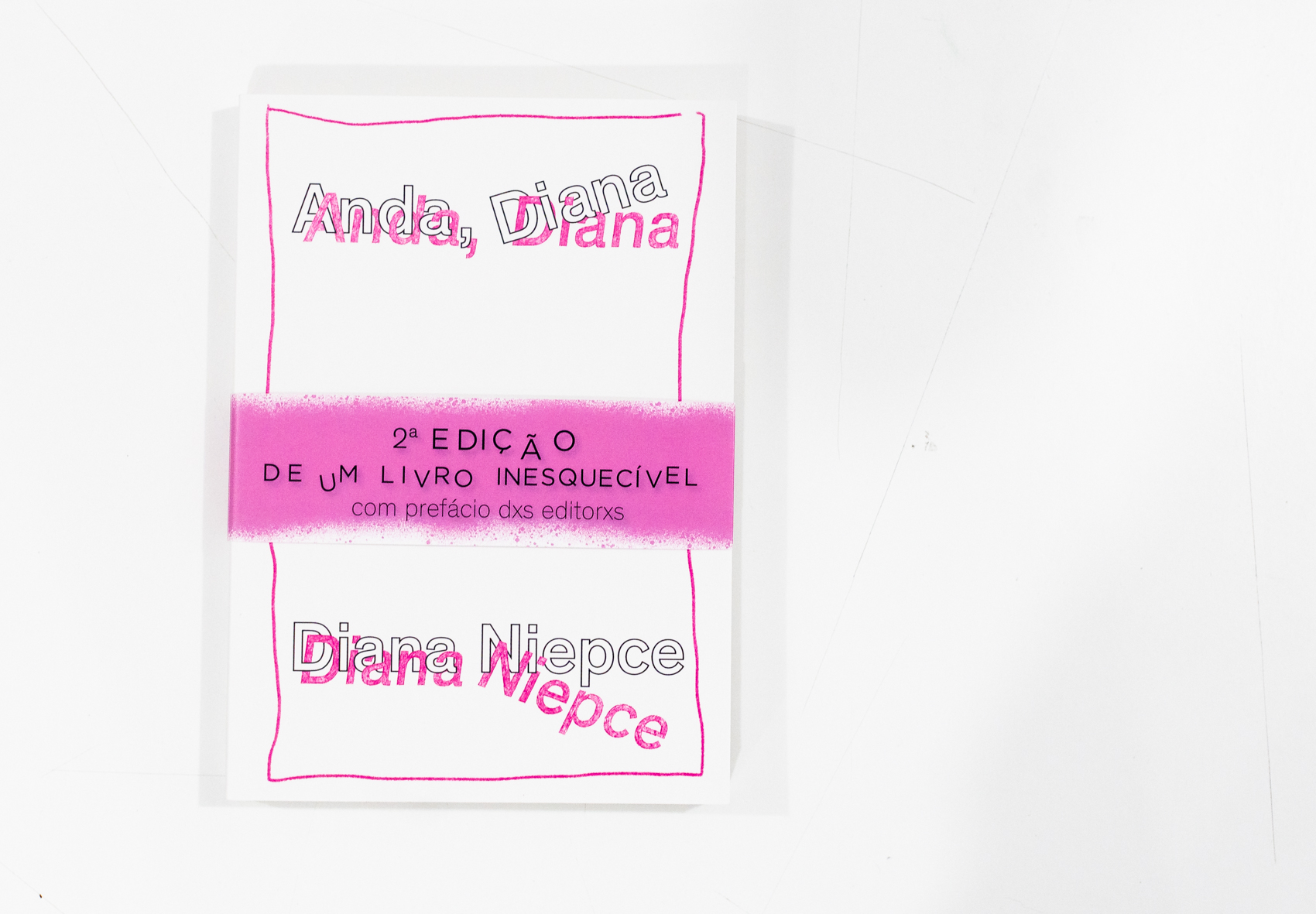
In the house with the broken window, I remove the dirt from my socks and boots.
Someone comes upstairs.
I fall silent.
At the table, I think back to the conversation with everyone who died.
I wake up.
I somersault, fall backwards, hook my feet on the rope. The feet miss the ropes and the fingertips of the hands support the fall. My head snaps back, my neck hits the mattress, I hear the sound of bones breaking. The body shuts down. The body levitates. The legs float, the arms move and I feel nothing.
I’m on fire. My shoulders ache. My collarbones are stuck to my neck and my joints are short-circuiting. They burn me.
ed.______, a seal which comprises two collections – “Series” and “Sequence” -, results from the collaboration between the Teatro Praga and the publisher Sistema Solar, with the coordination of André e. Teodósio and José Maria Vieira Mendes
The “Series” collection discloses the intangible heritage of contemporary performing arts. “Sequence” collection is organised in thematic books from different disciplines, which offer a reflection on systems of power and protest in the present time.
—
Title | Anda Diana (2nd edition)
Author | José Maria Vieira Mendes
Coordination | José Maria Vieira Mendes and André e. Teodósio
Design | Horácio Frutuoso
Photos | Mafalda Miranda Jacinto and Alípio Padilha
—
+Available for purchase here
+For more information contact producao@teatropraga.com
2022 | Anda, Diana (2ª ed.)
X
2022 | Anda, Diana (2ª ed.)

Na casa da janela partida, tiro a terra das meias e das botas.
Alguém entra no andar de cima.
Faço silêncio.
À mesa recordo a conversa com todos os que morreram.
Acordo.
Cambalhota, queda para trás, gancho de pés na corda. Os pés falham as cordas e as pontas dos dedos das mãos amparam a queda. A cabeça recolhe, a cervical bate no colchão, ouço o barulho de ossos a partir. O corpo desliga. O corpo levita. As pernas flutuam, os braços mexem e eu não sinto nada.
Estou a arder. Doem-me os ombros. Sinto as clavículas coladas ao pescoço e as articulações em curto-circuito. Queimam-me.
ed.___________, uma chancela composta por duas coleções – “Série” e “Sequência” -, resulta da colaboração entre o Teatro Praga e a editora Sistema Solar, com coordenação de André e. Teodósio e José Maria Vieira Mendes. A coleção “Série” divulga o património imaterial das artes performativas contemporâneas. A coleção “Sequência” organiza-se em livros temáticos oriundos de diversas disciplinas, que ofereçam uma reflexão sobre sistemas de poder e protesto na atualidade.
Título | Anda, Diana (2ª edição)
Autora | Diana Niepce
Uma edição | Teatro Praga / Sistema Solar (chancela ed._______, 2022)
Direcção da colecção | José Maria Vieira Mendes e André e. Teodósio
Design | Horácio Frutuoso
Fotografia | Mafalda Miranda Jacinto e Alípio Padilha
—
+Disponível para aquisição aqui
+Para mais informações sobre a sua compra contactar producao@teatropraga.com
2022 | Uma coisa não é outra coisa
X
2022 | Uma coisa não é outra coisa
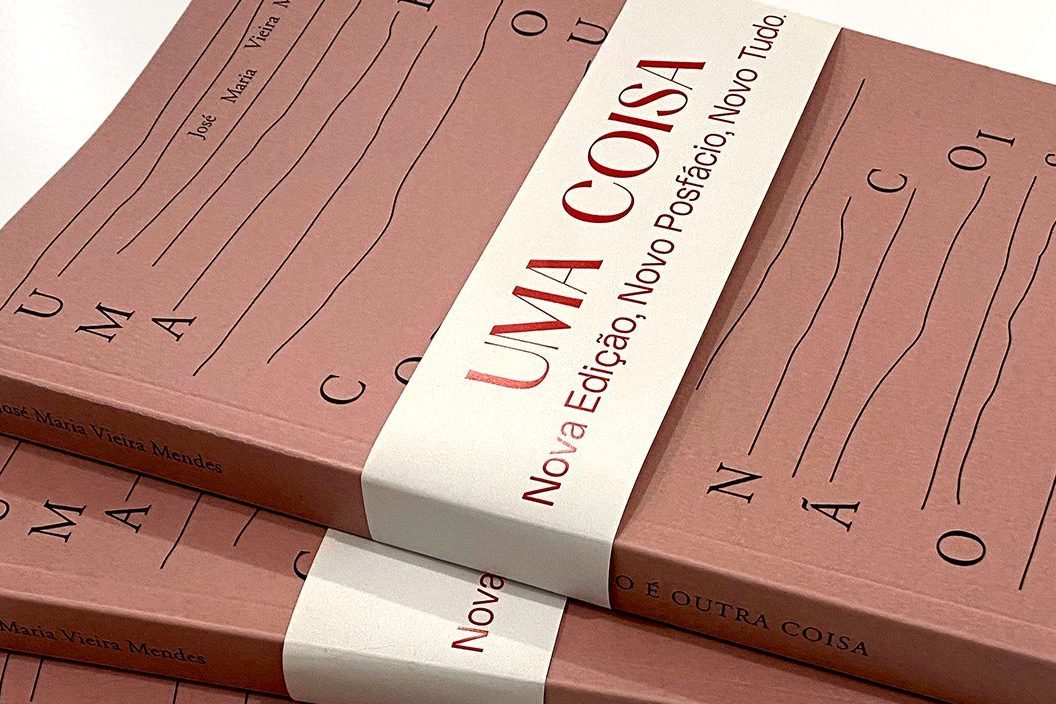
A theater performance and a play are different because they are two things. At the outset there is no distance between the two arts, any more than there is between citizenship and a painting from the Middle Ages. The description of distances is the fruit of a proposal for a relationship that feeds frustrations and immobilizes identities. The proposal of this book, which thinks about theater and literature, but also works of art and audiences, implies recognizing the other in the encounter and identifying the obvious: I am not you.
ed.______, a seal which comprises two collections – “Series” and “Sequence” -, results from the collaboration between the Teatro Praga and the publisher Sistema Solar, with the coordination of André e. Teodósio and José Maria Vieira Mendes
The “Series” collection discloses the intangible heritage of contemporary performing arts. “Sequence” collection is organised in thematic books from different disciplines, which offer a reflection on systems of power and protest in the present time.
—
Title | Uma coisa não é outra coisa
Author | José Maria Vieira Mendes
Coordination | José Maria Vieira Mendes e André e. Teodósio
Design | Horácio Frutuoso
Photos | Mafalda Miranda Jacinto
—
+available for purchase here
+For more information contact producao@teatropraga.com
2022 | Uma coisa não é outra coisa
X
2022 | Uma coisa não é outra coisa

Um espetáculo de teatro e uma peça de teatro são diferentes porque são duas coisas. À partida não há qualquer distância entre as duas artes, tal como não há entre a cidadania e uma pintura da Idade Média. A descrição de distâncias é fruto de uma proposta de relação que alimenta frustrações e imobiliza identidades. A proposta deste livro, que pensa sobre teatro e literatura, mas também obra de arte e público, implica reconhecer o outro no encontro e identificar o óbvio: eu não sou tu.
ed.___________, uma chancela composta por duas coleções – “Série” e “Sequência” -, resulta da colaboração entre o Teatro Praga e a editora Sistema Solar, com coordenação de André e. Teodósio e José Maria Vieira Mendes. A coleção “Série” divulga o património imaterial das artes performativas contemporâneas. A coleção “Sequência” organiza-se em livros temáticos oriundos de diversas disciplinas, que ofereçam uma reflexão sobre sistemas de poder e protesto na atualidade.
Título | Uma coisa não é outra coisa
Autor | José Maria Vieira Mendes
Uma edição | Teatro Praga / Sistema Solar (chancela ed._______, 2022)
Direcção da colecção | José Maria Vieira Mendes e André e. Teodósio
Design | Horácio Frutuoso
Fotografia | Mafalda Miranda Jacinto
—
+Disponível para aquisição aqui
+Para mais informações sobre a sua compra contactar producao@teatropraga.com
2022 | Coisas de Theatro / Loisas de Theatro
X
2022 | Coisas de Theatro / Loisas de Theatro

With this volume, we re-edit a polemic. As we read it, we become informed, delighted, and laughed at by the artistic “medium” itself. Dissent in the arts has served not only as a positioning strategy but also as a marker for periods and movements. The many quarrels going on today are thus a 2.0 version of a certain past. Life, like performance and history, is a process. With means and ends and, hopefully, also and always with principles. Even if you have to break the dishes to do it.
.
ed.______, a seal which comprises two collections – “Series” and “Sequence” -, results from the collaboration between the Teatro Praga and the publisher Sistema Solar, with the coordination of André e. Teodósio and José Maria Vieira Mendes
The “Series” collection discloses the intangible heritage of contemporary performing arts. “Sequence” collection is organised in thematic books from different disciplines, which offer a reflection on systems of power and protest in the present time.
—
Title | Coisas de Theatro by Sousa Bastos / Loisas de Theatro by Santos Gonçalves
Prelude | Paula Gomes Magalhães
Coordination | José Maria Vieira Mendes e André e. Teodósio
Design | Horácio Frutuoso
Photos | MMJ
—
+Soon available for purchase here
+For more information contact producao@teatropraga.com
2022| Coisas de Theatro / Loisas de Theatro
X
2022| Coisas de Theatro / Loisas de Theatro

Com este volume, reeditamos uma polémica. Na sua leitura, vamo-nos informando, deleitando e rindo com o próprio «meio» artístico. O dissenso nas artes não só tem servido como estratégia de posicionamento mas também como marcador para períodos e movimentos. As muitas querelas que se vivem hoje são assim uma versão 2.0 de um certo passado. A vida, como a performance e a história, é um processo. Com meios e com fins e, esperemos, também e sempre com princípios. Nem que para isso se tenha de partir a loiça.
.
ed._ _ _ _ _ _ _, uma chancela composta por duas coleções – “Série” e “Sequência” -, resulta da colaboração entre o Teatro Praga e a editora Sistema Solar, com coordenação de André e. Teodósio e José Maria Vieira Mendes. A coleção “Série” divulga o património imaterial das artes performativas contemporâneas. A coleção “Sequência” organiza-se em livros temáticos oriundos de diversas disciplinas, que ofereçam uma reflexão sobre sistemas de poder e protesto na atualidade.
—
Título | Coisas de Theatro de Sousa Bastos / Loisas de Theatro de Santos Gonçalves
Autores | Sousa Bastos e Santos Gonçalves
Prelúdio | Paula Gomes Magalhães
Uma edição | Teatro Praga / Sistema Solar (chancela ed._______, 2022)
Direcção da colecção | José Maria Vieira Mendes e André e. Teodósio
Design | Horácio Frutuoso
Fotografia | MMJ
—
+Em breve disponível para aquisição aqui
+Para mais informações sobre a sua compra contactar producao@teatropraga.com
.
2022 | Delirar a Anatomia
X
2022 | Delirar a Anatomia

Delirar a Anatomia é uma coleção de estudos febris dedicados a uma parte do corpo. Delirar a Anatomia é uma coleção de peças de dança e uma coleção de partituras-poemas. O presente livro compila cinco partituras-poemas desta coleção, intercaladas pelo (des)léxico para A.A. de Joana Levi, artista, performer e estudiosa sensível ao corpo proposto por Antonin Artaud.
.
ed._ _ _ _ _ _ _, uma chancela composta por duas coleções – “Série” e “Sequência” -, resulta da colaboração entre o Teatro Praga e a editora Sistema Solar, com coordenação de André e. Teodósio e Rita Natálio. A coleção “Série” divulga o património imaterial das artes performativas contemporâneas. A coleção “Sequência” organiza-se em livros temáticos oriundos de diversas disciplinas, que ofereçam uma reflexão sobre sistemas de poder e protesto na atualidade.
—
Título | Delirar a Anatomia Partitura-Poemas de Ana Rita Teodoro + (des)léxico para A.A. de Joana Levi
Autoras | Ana Rita Teodoro e Joana Levi
Uma edição | Teatro Praga / Sistema Solar (chancela ed._______, 2022)
Direcção da colecção | Rita Natálio e André e. Teodósio
Design | Horácio Frutuoso
Fotografia | MMJ
—
+Em breve disponível para aquisição aqui
+Para mais informações sobre a sua compra contactar producao@teatropraga.com
.
2022 | Delirar a Anatomia
X
2022 | Delirar a Anatomia

Delirar a Anatomia is a collection of feverish studies dedicated to one part of the body. Delirar a Anatomia is a collection of dance pieces and a collection of score-poems. The present book compiles five score-poems from this collection, interspersed by the (un)lexicon for A.A. by Joana Levi, artist, performer and scholar sensitive to the body proposed by Antonin Artaud.
ed.______, a seal which comprises two collections – “Series” and “Sequence” -, results from the collaboration between the Teatro Praga and the publisher Sistema Solar, with the coordination of André e. Teodósio and Rita Natálio.
The “Series” collection discloses the intangible heritage of contemporary performing arts. “Sequence” collection is organised in thematic books from different disciplines, which offer a reflection on systems of power and protest in the present time.
—
Title |Delirar a Anatomia Partitura-Poemas de Ana Rita Teodoro + (des)léxico para A.A. de Joana Levi
Authors | Ana Rita Teodoro e Joana Levi
Coordination | Rita Natálio e André e. Teodósio
Design | Horácio Frutuoso
Photos | MMJ
—
+Soon available for purchase here
+For more information contact producao@teatropraga.com
2022 | O DESENSINO DA ARTE: Projecto para uma escola ideal
X
2022 | O DESENSINO DA ARTE: Projecto para uma escola ideal
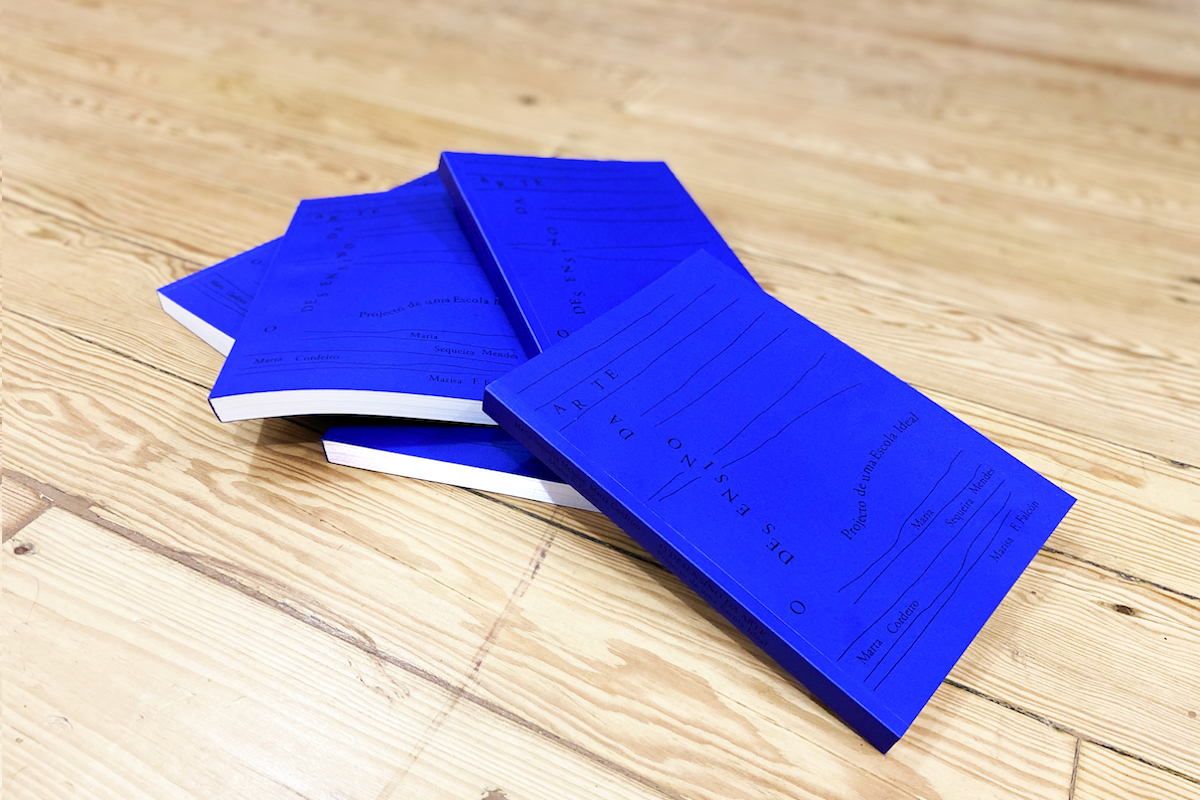
“O DESENSINO DA ARTE” assumes that, as Steven Henry Madoff states, “No school is a school without an idea,” and seeks to present a model of an ideal school. The idea is not new; it derives from revisiting examples of other art schools that have shaped the collective imagination, and trying to think about them. Essentially, it argues that, rather than being defined by a space or by the entity that oversees it, a good art school can exist anywhere as long as certain conditions are met.
“O DESENSINO DA ARTE” is divided into two parts. In the first, the existing art education models are contextualized and an alternative is proposed. In the second, a group of contemporary artists is asked to describe what would be, for them, the ideal school. The conclusion is that the best art school is the one that, having the capacity to serve no purpose, proposes a diffusion of the idea of quality to its students.
.
ed.______, a seal which comprises two collections – “Series” and “Sequence” -, results from the collaboration between the Teatro Praga and the publisher Sistema Solar, with the coordination of André e. Teodósio and José Maria Vieira Mendes
The “Series” collection discloses the intangible heritage of contemporary performing arts. “Sequence” collection is organised in thematic books from different disciplines, which offer a reflection on systems of power and protest in the present time.
—
Title | O DESENSINO DA ARTE: Projecto de uma escola ideal
Authors | Maria Sequeira Mendes, Marta Cordeiro, Marisa F. Falcón
Coordination | José Maria Vieira Mendes e André e. Teodósio
Design | Horácio Frutuoso
Photos | MMJ
—
+Soon available for purchase here
+For more information contact producao@teatropraga.com
2022 | O DESENSINO DA ARTE: Projecto de uma escola ideal
X
2022 | O DESENSINO DA ARTE: Projecto de uma escola ideal

“O Desensino da Arte” parte do princípio de que, como afirma Steven Henry Madoff, «Nenhuma escola é uma escola sem uma ideia», e procura apresentar um modelo de escola ideal. A ideia não é nova, nasce da revisitação de exemplos de outras escolas de arte que modelaram o imaginário colectivo, procurando pensar sobre eles. Essencialmente, defende-se que, mais do que ser definida por um espaço ou pela entidade que a tutela, uma boa escola de artes pode existir em qualquer sítio desde que nela se cumpram algumas condições.
“O Desensino da arte” divide-se em duas partes. Na primeira, contextualiza-se o modelo de ensino artístico existente e propõe-se uma alternativa. Na segunda, pede-se a um conjunto de artistas contemporâneos que nos descrevam o que seria, para si, a escola ideal. Conclui-se que a melhor escola de artes é a que, tendo a capacidade de não servir para nada, propõe uma difração da ideia de qualidade aos seus alunos.
.
ed._ _ _ _ _ _ _, uma chancela composta por duas coleções – “Série” e “Sequência” -, resulta da colaboração entre o Teatro Praga e a editora Sistema Solar, com coordenação de André e. Teodósio e José Maria Vieira Mendes. A coleção “Série” divulga o património imaterial das artes performativas contemporâneas. A coleção “Sequência” organiza-se em livros temáticos oriundos de diversas disciplinas, que ofereçam uma reflexão sobre sistemas de poder e protesto na atualidade.
—
Título | O DESENSINO DA ARTE: Projecto para uma escola ideal
Autoras | Maria Sequeira Mendes, Marta Cordeiro, Marisa F. Falcón
Uma edição | Teatro Praga / Sistema Solar (chancela ed._______, 2022)
Direcção da colecção | José Maria Vieira Mendes e André e. Teodósio
Design | Horácio Frutuoso
Fotografia | MMJ
—
.
+Em breve disponível para aquisição aqui
+Para mais informações sobre a sua compra contactar producao@teatropraga.com
.
2020 | IMPASS
X
2020 | IMPASS
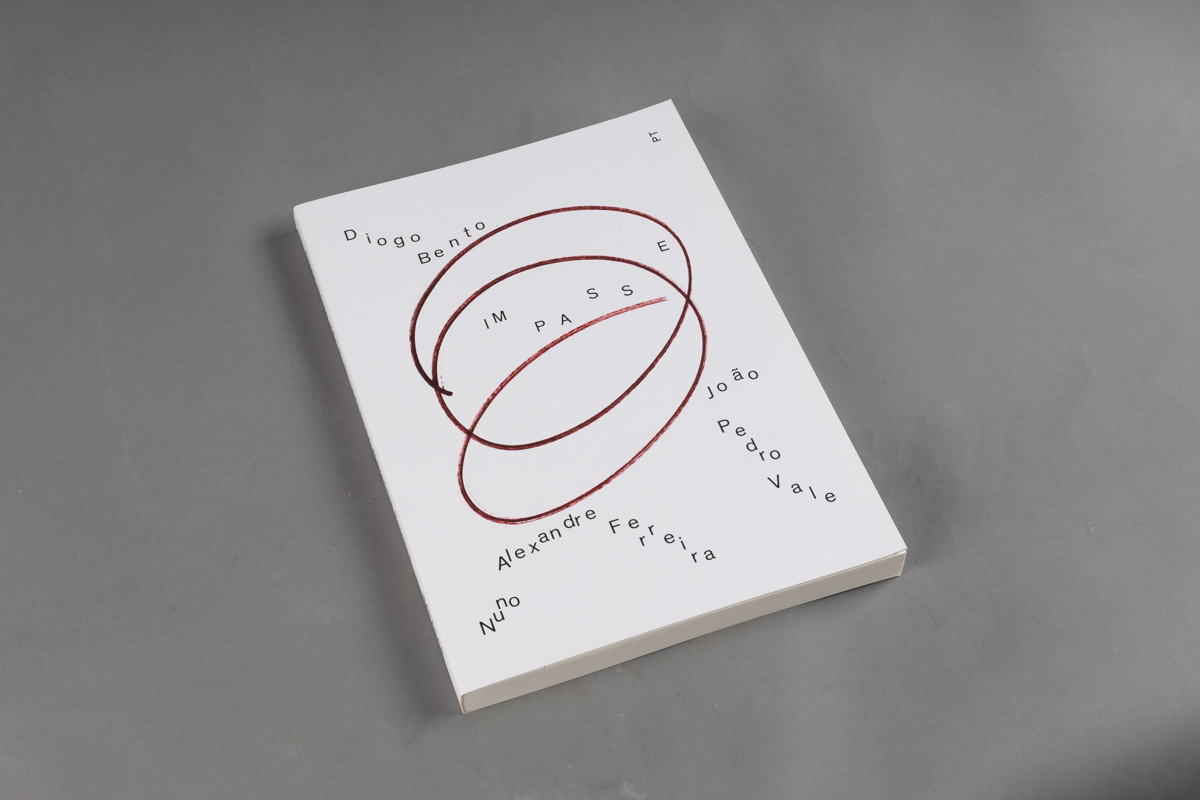
The three texts presented in this book were premiered in Portugal during the public action Impasse, organized by Pedro Gomes and João Pedro Vale & Nuno Alexandre. The performances that Diogo Bento and the duo of artists activated in their studio depart from an encounter/disencounter between the three, during the first demonstrations in Paris of the Yellow Vests, in 2018. Although in the genesis of the performance there was not necessarily the intention of publishing their materials, it seemed fundamental to share them in a bilingual edition (PT | EN). Sometimes there is no other option but to leave the impasse of the infinitely postponable waiting situation.
.
ed.______, a seal which comprises two collections – “Series” and “Sequence” -, results from the collaboration between the Teatro Praga and the publisher Sistema Solar, with the coordination of Rita Natálio and André e. Teodósio.
The “Series” collection discloses the intangible heritage of contemporary performing arts. “Sequence” collection is organised in thematic books from different disciplines, which offer a reflection on systems of power and protest in the present time.
—
Title | IMPASS
Authors | João Pedro Vale, Nuno Alexandre Ferreira e Diogo Bento
Coordination | Rita Natálio e André e. Teodósio
Translation into English | Colin Ginks
Design | Horácio Frutuoso
Photos | Alípio Padilha
—
+ available for purchase here
+For more information contact producao@teatropraga.com
2021 | WALK, DIANA
X
2021 | WALK, DIANA

‘Walk, Diana’ is a fictional diary of Diana Niepce developed from the experience of her quadriplegia caused by an accident. An inner narrative, developed from cruelly real facts, contaminated by the author’s artistic perspective. A fundamental diary where many axes intersect: from the history of dance to the construction of cities, from the physical body to love. An absolutely fundamental book!
.
ed.______, a seal which comprises two collections – “Series” and “Sequence” -, results from the collaboration between the Teatro Praga and the publisher Sistema Solar, with the coordination of Rita Natálio and André e. Teodósio.
The “Series” collection discloses the intangible heritage of contemporary performing arts. “Sequence” collection is organised in thematic books from different disciplines, which offer a reflection on systems of power and protest in the present time.
—
A Teatro Praga / Sistema Solar edition (chancela ed .______), 2021
Title | WALK, DIANA
Author | Diana Niepce
Coordination | Rita Natálio e André e. Teodósio
Design | Horácio Frutuoso
Photos | Alípio Padilha
—
+Available for purchase here
+For more information contact producao@teatropraga.com
2021 | ANDA, DIANA
X
2021 | ANDA, DIANA
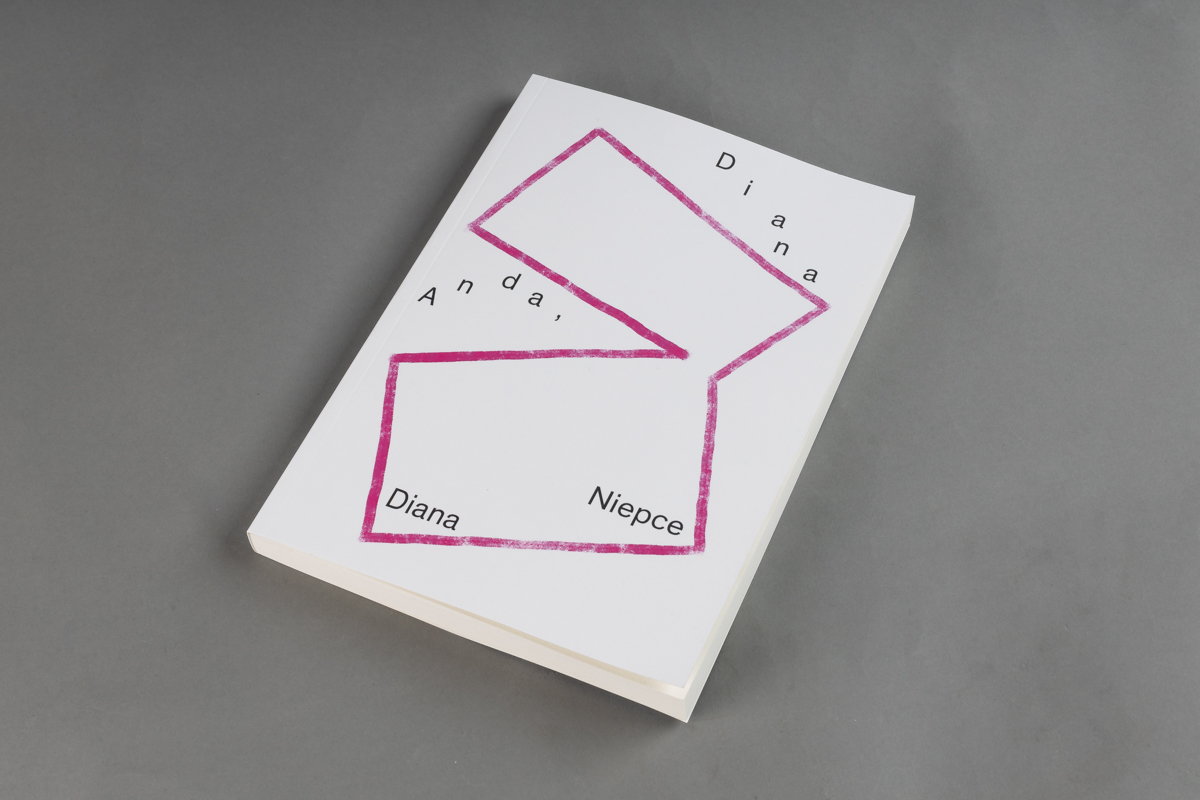
Anda, Diana é um diário ficcional de Diana Niepce desenvolvido a partir da experiência da sua tetraplegia causada por um acidente. Uma narrativa interior, desenvolvida a partir de factos cruelmente reais, contaminados pela perspetiva artística da autora. Um diário fundamental onde se interseccionam muitos eixos: da história da dança à construção das cidades, do corpo físico ao amor. Um livro absolutamente fundamental!
ed._______, uma chancela composta por duas colecções – “Série” e “Sequência” -, resulta da colaboração entre o Teatro Praga e a editora Sistema Solar, com coordenação de Rita Natálio e André e. Teodósio,
A coleção “Série” divulga o património imaterial das artes performativas contemporâneas. A coleção “Sequência” organiza-se em livros temáticos oriundos de diversas disciplinas, que ofereçam uma reflexão sobre sistemas de poder e protesto na atualidade.
.
—
Título | ANDA, DIANA
Autora | Diana Niepce
Uma edição | Teatro Praga / Sistema Solar (chancela ed._______, 2020)
Direcção da colecção | Rita Natálio e André e. Teodósio
Design | Horácio Frutuoso
Fotografia | Alípio Padilha
—
+Disponível para aquisição aqui
+Para mais informações sobre a sua compra contactar producao@teatropraga.com
2020 | IMPASSE
X
2020 | IMPASSE
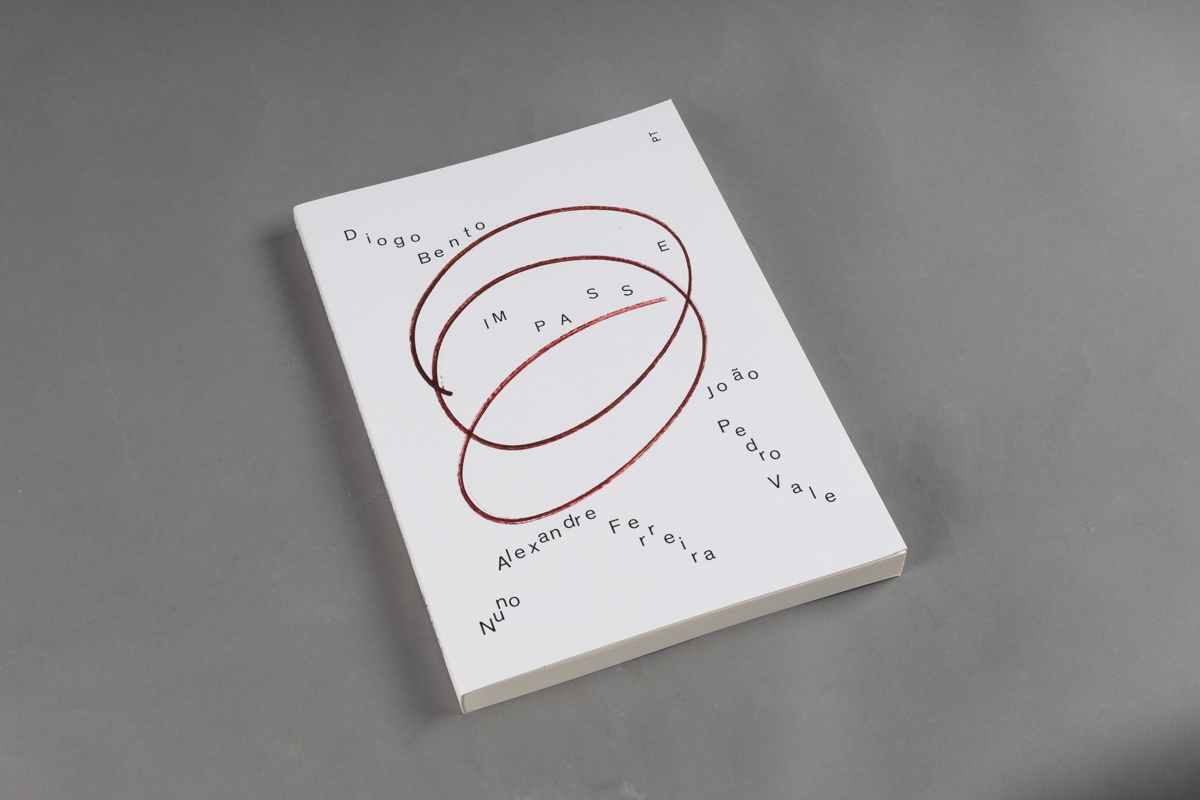
Os três textos apresentados neste livro foram estreados em Portugal durante a ação pública Impasse, organizado por Pedro Gomes e João Pedro Vale & Nuno Alexandre. As performances que Diogo Bento e a dupla de artistas activaram no seu atelier partem de um encontro/desencontro entre os três, durante as primeiras manifestações em Paris dos Coletes Amarelos, em 2018. Ainda que na génese da performance não tenha havido necessariamente a intenção de publicação dos seus materiais, pareceu-nos fundamental partilhá-los numa edição bilingue (PT | EN). Por vezes não resta outra opção senão sair do impasse da infinitamente adiável situação de espera.
.
ed._______, uma chancela composta por duas colecções – “Série” e “Sequência” -, resulta da colaboração entre o Teatro Praga e a editora Sistema Solar, com coordenação de Rita Natálio e André e. Teodósio,
A coleção “Série” divulga o património imaterial das artes performativas contemporâneas. A coleção “Sequência” organiza-se em livros temáticos oriundos de diversas disciplinas, que ofereçam uma reflexão sobre sistemas de poder e protesto na atualidade.
—
Título | IMPASSE
Autores | João Pedro Vale, Nuno Alexandre Ferreira e Diogo Bento
Uma edição | Teatro Praga / Sistema Solar (chancela ed._______, 2020)
Direcção da colecção | Rita Natálio e André e. Teodósio
Tradução | Colin Ginks
Design | Horácio Frutuoso
Fotografia | Alípio Padilha
—
+ Disponível para aquisição aqui
+Para mais informações sobre a sua compra contactar producao@teatropraga.com
2020 | Spheres of Insurrection
X
2020 | Spheres of Insurrection
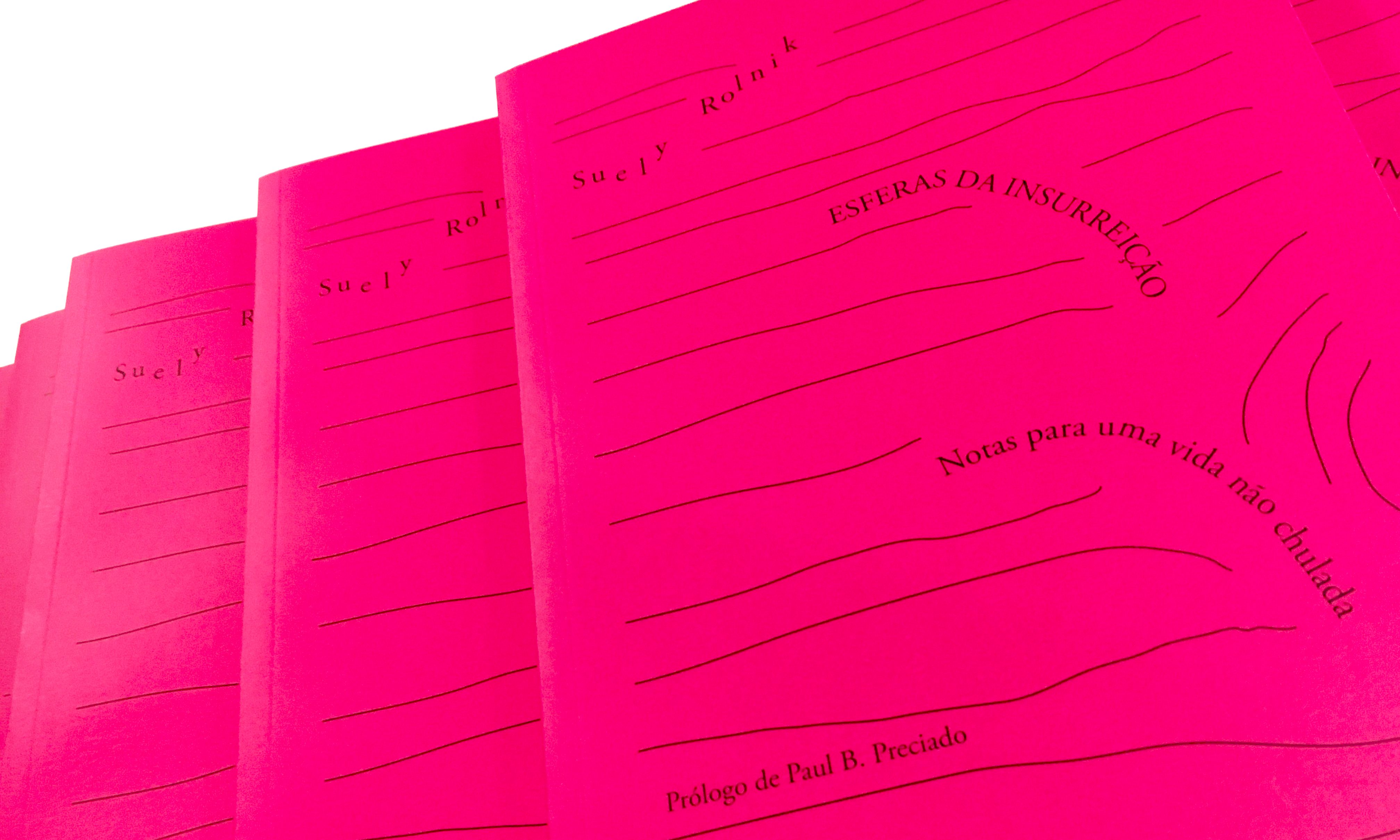
These essays by Suely Rolnik come to us in the midst of a toxic haze that our collective ways of life produce on the planet. We live in a counterrevolutionary moment.
(Paul B. Preciado)
ed.______, a seal which comprises two collections – “Series” and “Sequence” -, results from the collaboration between the Teatro Praga and the publisher Sistema Solar, with the coordination of Rita Natálio and André e. Teodósio.
The “Series” collection discloses the intangible heritage of contemporary performing arts. “Sequence” collection is organised in thematic books from different disciplines, which offer a reflection on systems of power and protest in the present time.
—
A Teatro Praga / Sistema Solar edition (chancela ed .______), 2020
Title | SPHERES OF INSURRECTION – Notes for a non life chulada
Author | Suely Rolnik
Coordination | Rita Natálio e André e. Teodósio
Foreword | Paul B. Preciado
Design | Horácio Frutuoso
—
+Available for purchase here
+For more information contact producao@teatropraga.com
2020 | Esferas da Insurreição
X
2020 | Esferas da Insurreição

Estes ensaios de Suely Rolnik chegam-nos em plena névoa tóxica que os nossos modos colectivos de vida produzem sobre o planeta. Vivemos um momento contrarrevolucionário.
(Paul B. Preciado).
ed._______, uma chancela composta por duas colecções – “Série” e “Sequência” -, resulta da colaboração entre o Teatro Praga e a editora Sistema Solar, com coordenação de Rita Natálio e André e. Teodósio,
A coleção “Série” divulga o património imaterial das artes performativas contemporâneas. A coleção “Sequência” organiza-se em livros temáticos oriundos de diversas disciplinas, que ofereçam uma reflexão sobre sistemas de poder e protesto na atualidade.
—
Título | ESFERAS DA INSURREIÇÃO – Notas para uma vida não chulada
Autora | Suely Rolnik
Uma edição | Teatro Praga / Sistema Solar (chancela ed._______, 2020)
Direcção da colecção | Rita Natálio e André e. Teodósio
Prefácio | Paul B. Preciado
Design | Horácio Frutuoso
—
+Disponível para aquisição aqui
+Para mais informações sobre a sua compra contactar producao@teatropraga.com
2020 | Matchundadi: Género, Performance e Violência Política na Guiné-Bissau
X
2020 | Matchundadi: Género, Performance e Violência Política na Guiné-Bissau
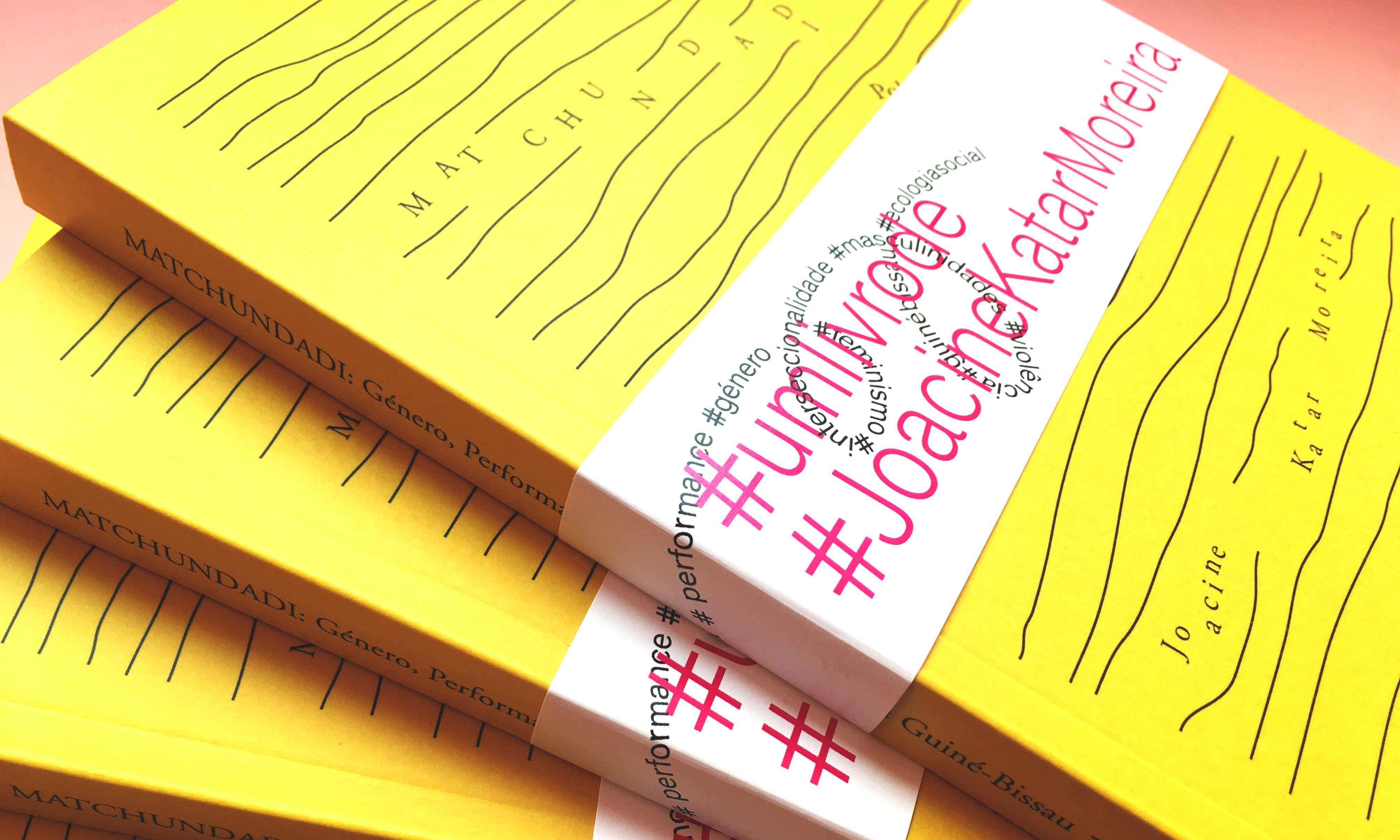
“Matchundadi: Género, Performance e Violência Política na Guiné-Bissau” é um livro de Joacine Katar Moreira que coloca em fricção o conceito de “matchundadi” e a política e o Estado guineenses. A cultura da “matchundadi” contribui para a consolidação rígida de estruturas políticas hipermasculinizadas com um forte impacto na vida das pessoas e da participação política contemporâneas.
Passando pelas representações tradicionais da masculinidade (“matchu-étnico”), da sociedade colonial (“matchu-urbano”) e da luta de libertação nacional (“matchu-combatente”), a autora propõe uma órbita singular para pensar as dimensões da guerra, da colonialidade, da festa e do protesto na Guiné-Bissau.
Um convite para “estar em” política com toda a complexidade das relações e das escalas que a produzem e que muitas vezes são colocadas fora de uma política “a sério”.
.
ed._______, uma chancela composta por duas colecções – “Série” e “Sequência” -, resulta da colaboração entre o Teatro Praga e a editora Sistema Solar, com coordenação de Rita Natálio e André e. Teodósio,
A coleção “Série” divulga o património imaterial das artes performativas contemporâneas. A coleção “Sequência” organiza-se em livros temáticos oriundos de diversas disciplinas, que ofereçam uma reflexão sobre sistemas de poder e protesto na atualidade.
—
Uma edição | Teatro Praga / Sistema Solar (chancela ed._______, 2020)
Direcção da colecção | Rita Natálio e André e. Teodósio
Prefácio | Pedro Vasconcelos
Design | Horácio Frutuoso
Revisão | Helena Roldão
.
Lançamento do livro, dia 24 de Setembro às 18h30 no LuxFrágil.
c/ a presença de Pedro Vasconcelos e Daniel Neto
Concerto Braima Galissá
—
+Disponível para aquisição aqui
+Para mais informações sobre a sua compra contactar producao@teatropraga.com
2020 | Matchundadi: Gender, Performance and Political Violence in Guinea-Bissau
X
2020 | Matchundadi: Gender, Performance and Political Violence in Guinea-Bissau

“Matchundadi: Gender, Performance and Political Violence in Guinea-Bissau” is a book by Joacine Katar Moreira that puts the concept of “matchundadi” and Guinean politics and state in friction. The culture of the “matchundadi” contributes to the rigid consolidation of hypermasculinized political structures with a strong impact on people’s lives and contemporary political participation.
Going through the traditional representations of masculinity (“matchu-ethnic”), colonial society (“matchu-urban”) and the national liberation struggle (“matchu-combatant”), the author proposes a unique orbit to think about the dimensions of war, colonialism, celebration and protest in Guinea-Bissau.
An invitation to “be in” politics with all the complexity of the relationships and the scales that produce it and that are often placed outside a “real” policy.
.
ed.______, a seal which comprises two collections – “Series” and “Sequence” -, results from the collaboration between the Teatro Praga and the publisher Sistema Solar, with the coordination of Rita Natálio and André e. Teodósio.
The “Series” collection discloses the intangible heritage of contemporary performing arts. “Sequence” collection is organised in thematic books from different disciplines, which offer a reflection on systems of power and protest in the present time.
—
A Teatro Praga / Sistema Solar edition (chancela ed .______), 2020
Coordination | André e. Teodósio e Rita Natálio
Foreword | Pedro Vasconcelos
Design | Horácio Frutuoso
Revision | Helena Roldão
.
Book presentation on the 14th September at 6.30pm, LuxFrágil
with Pedro Vasconcelos and Daniel Neto
Concert by Braima Galissá
–
+Available for purchase here
+For more information contact producao@teatropraga.com
2020 | Short introduction to a catalogue without an author
X
2020 | Short introduction to a catalogue without an author
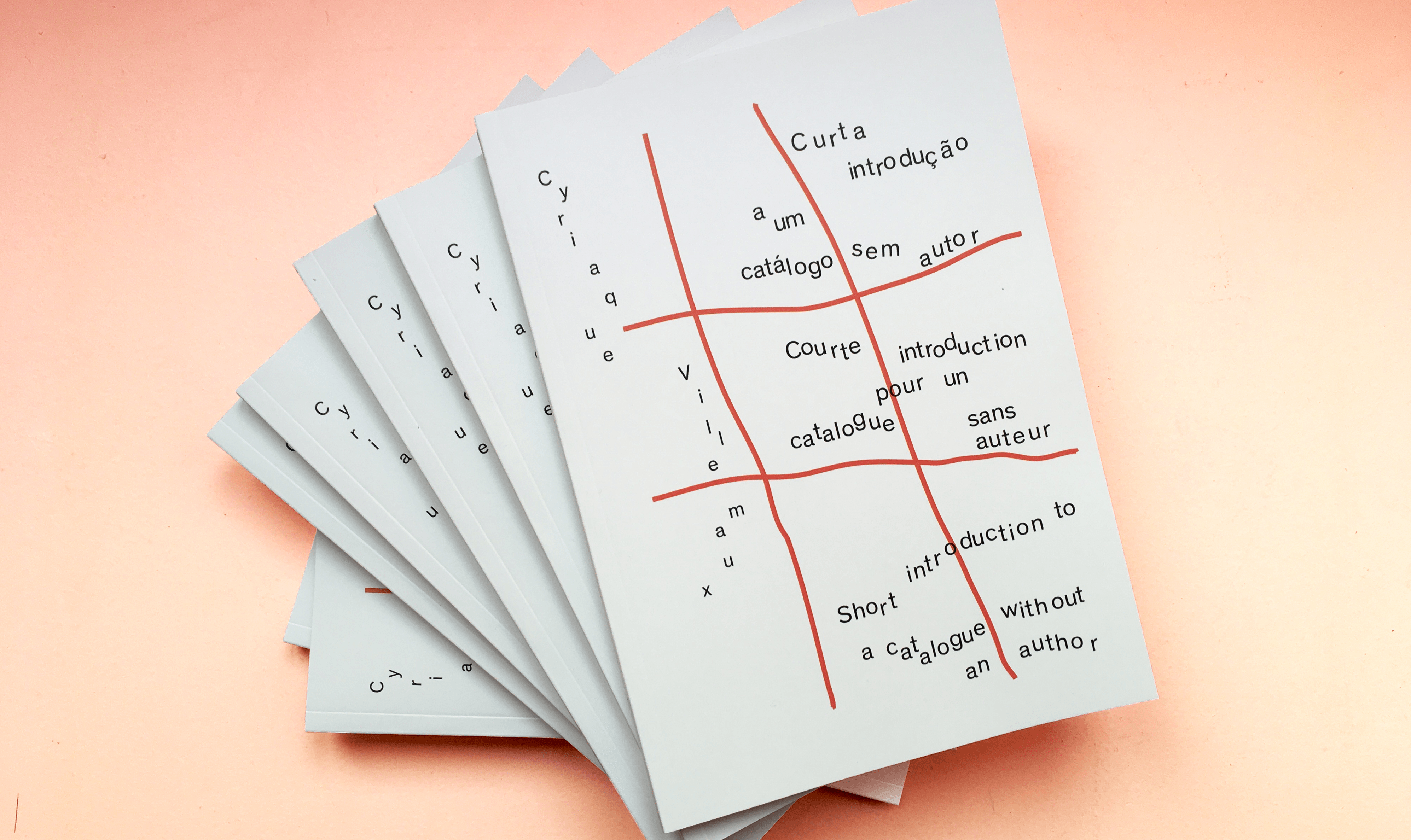
ed.______, a seal which comprises two collections – “Series” and “Sequence” -, results from the collaboration between the Teatro Praga and the publisher Sistema Solar.
The “Series” collection discloses the intangible heritage of contemporary performing arts. “Sequence” collection is organised in thematic books from different disciplines, which offer a reflection on systems of power and protest in the present time.
Under the coordination of Rita Natálio and André e. Teodósio,“Short introduction to a catalog without an author” is the first book in the “Séries” collection, a catalog without an author and prefaced by choreographer Cyriaque Villemaux.
In 2011 the choreographer met, at a dance school, the author of this catalog. The author, who wants to remain anonymous, is interested in sharing a series of choreographic, literary, culinary, social, etc. proposals, sufficiently open to be carried out by others … “or not”. Written in globish English, the book is an unpublished book that contributes to the dissemination, thought and even practice in the performing arts.
—
A Teatro Praga / Sistema Solar edition (chancela ed .______), 2020
Coordination | André e. Teodósio e Rita Natálio
Design | Horácio Frutuoso
–
+Available for purchase here.
+For more information contact producao@teatropraga.com
–
—
2020 | Curta introdução a um catálogo sem autor
X
2020 | Curta introdução a um catálogo sem autor
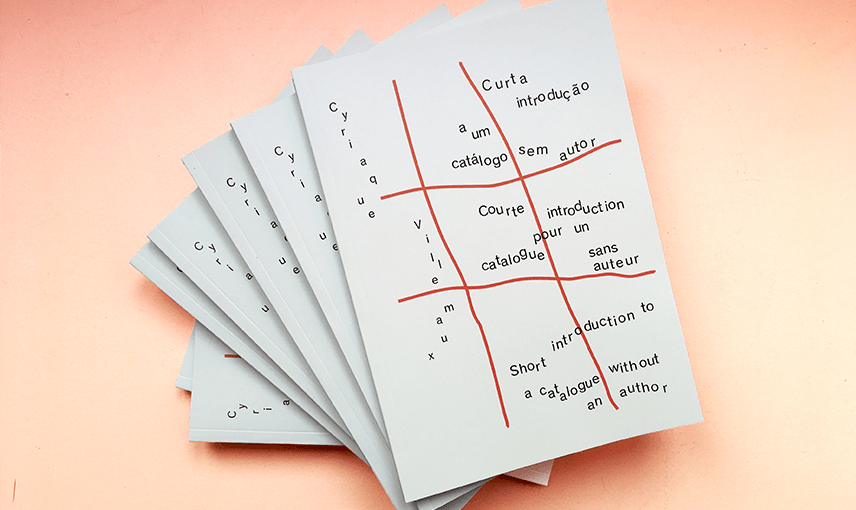
ed.______, uma chancela composta por duas colecções – “Série” e “Sequência” -, resulta da colaboração entre o Teatro Praga e a editora Sistema Solar.
A coleção “Série” divulga o património imaterial das artes performativas contemporâneas. A coleção “Sequência” organiza-se em livros temáticos oriundos de diversas disciplinas, que ofereçam uma reflexão sobre sistemas de poder e protesto na atualidade.
Sob a coordenação de Rita Natálio e André e. Teodósio, “Curta introdução a um catálogo sem autor” é o primeiro livro da coleção “Série”, um catálogo sem autor encontrado e prefaciado pelo coreógrafo francês Cyriaque Villemaux.
Foi no ano de 2011 que o coreógrafo conheceu, numa escola de dança, o autor deste catálogo. Ao autor, que se quer manter anónimo, interessa partilhar uma série de propostas coreográficas, literárias, culinárias, sociais, etc., suficientemente abertas para ser realizadas pelos outros… “ou não”. Escrito em inglês globish, o livro é um inédito que contribui para pensar, divulgar e até praticar artes performativas.
—
Uma edição | Teatro Praga / Sistema Solar (chancela ed._______, 2020)
Direcção da colecção | Rita Natálio e André e. Teodósio
Design | Horário Frutuoso
—
+Disponível para aquisição aqui.
+Para mais informações sobre a sua compra contactar producao@teatropraga.com
2019 | AMERÍNDIAS: PERFORMANCES OF INDIGENOUS CINEMA IN BRAZIL
X
2019 | AMERÍNDIAS: PERFORMANCES OF INDIGENOUS CINEMA IN BRAZIL
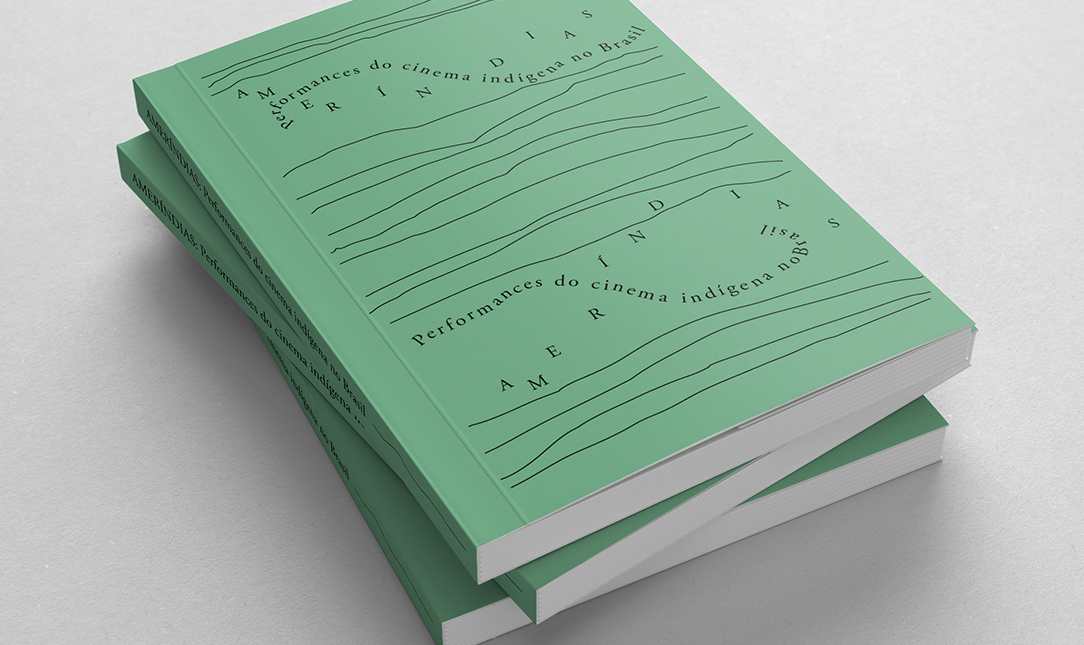
ed.______, a seal which comprises two collections – “Series” and “Sequence” -, results from the collaboration between the Teatro Praga and the publisher Sistema Solar.
The “Series” collection discloses the intangible heritage of contemporary performing arts. “Sequence” collection is organised in thematic books from different disciplines, which offer a reflection on systems of power and protest in the present time.
Under the coordination of Rita Natálio and André e. Teodósio, “Amerindias: Performances of Indigenous Cinema in Brazil” followed “Amerindian Film Show: Indigenous Film Paths in Brazil”, an apordoc – association for the documentary initiative, which took place between March 13 and 17, 2019 , at the Calouste Gulbenkian Museum – Modern Collection.
—
Texts | Isael e Sueli Maxakali, Manuela Carneiro da Cunha, Estela Vara, Els Lagrou, Eduardo Viveiros de Castro, Dominique Tilkin Gallois and Vincent Carelli, Alberto Alvares, André Brasil, Gilmar Galache, Marco Antonio Gonçalves, Aparecida Vilaça, Ailton Krenak, Rita Natálio, Rodrigo Lacerda, Pedro Cardim, Susana de Matos Viegas, Miguel Ribeiro
Design | Horário Frutuoso
—
Sold out.
2019 | AMERÍNDIAS: PERFORMANCES DO CINEMA INDÍGENA NO BRASIL
X
2019 | AMERÍNDIAS: PERFORMANCES DO CINEMA INDÍGENA NO BRASIL

ed.______, uma chancela composta por duas colecções – “Série” e “Sequência” -, resulta da colaboração entre o Teatro Praga e a editora Sistema Solar.
A coleção “Série” divulga o património imaterial das artes performativas contemporâneas. A coleção “Sequência” organiza-se em livros temáticos oriundos de diversas disciplinas, que ofereçam uma reflexão sobre sistemas de poder e protesto na atualidade.
Sob a coordenação de Rita Natálio e André e. Teodósio, “Ameríndias: Performances do cinema indígena no Brasil” foi publicado na sequência da “Mostra Ameríndias: Percursos do cinema indígena no Brasil“, uma iniciativa da apordoc – associação pelo documentário, que teve lugar entre dia 13 e 17 de Março de 2019, no Museu Calouste Gulbenkian – Colecção Moderna.
—
Textos | Isael e Sueli Maxakali, Manuela Carneiro da Cunha, Estela Vara, Els Lagrou, Eduardo Viveiros de Castro, Dominique Tilkin Gallois e Vincent Carelli, Alberto Alvares, André Brasil, Gilmar Galache, Marco Antonio Gonçalves, Aparecida Vilaça, Ailton Krenak, Rita Natálio, Rodrigo Lacerda, Pedro Cardim, Susana de Matos Viegas, Miguel Ribeiro
Design | Horário Frutuoso
—
Esgotado.
2017 | SPRING AWAKENING Publication
X
2017 | SPRING AWAKENING Publication
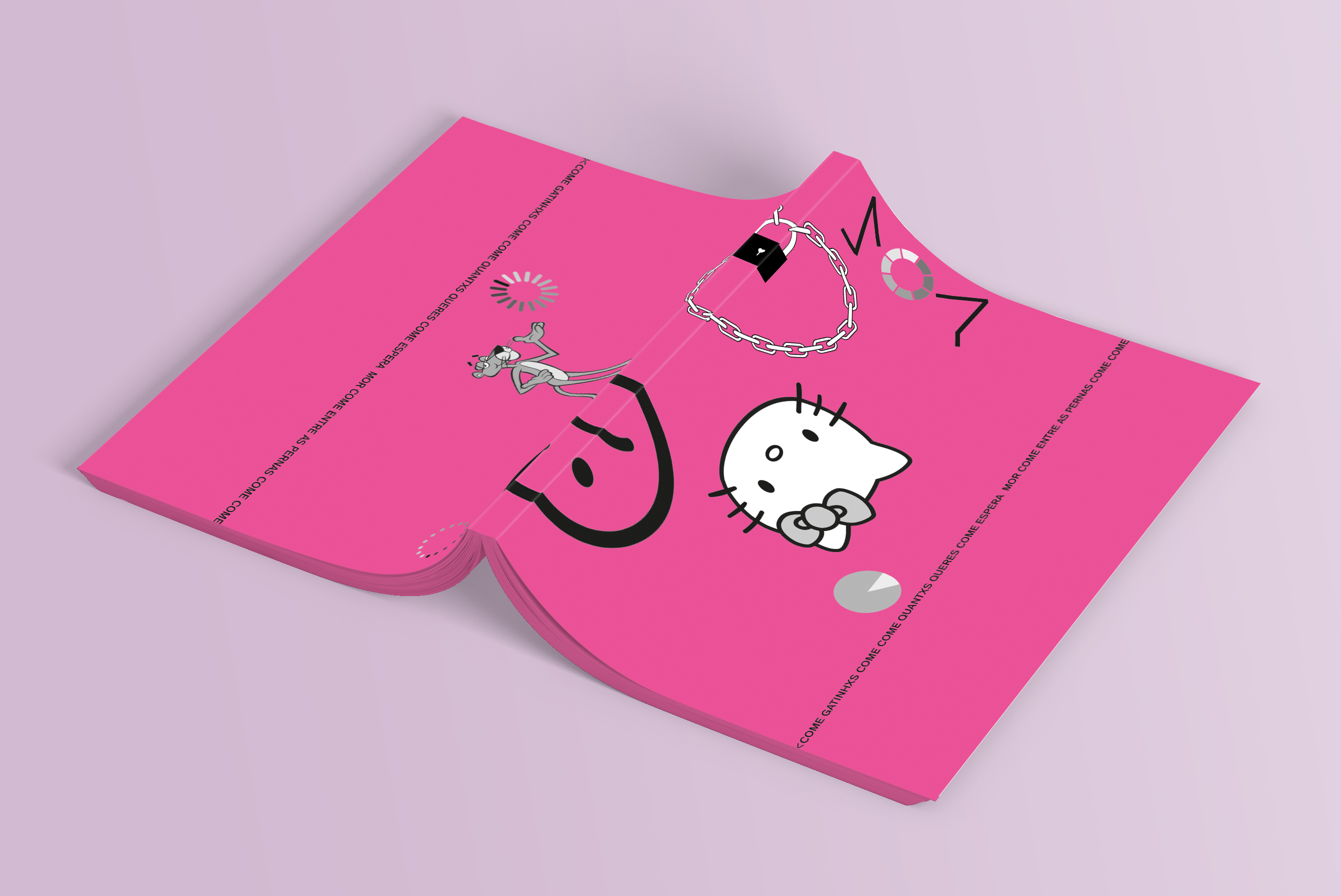
—
Text | Frank Wedekind with translation by José Maria Vieira Mendes
Design | Horário Frutuoso
—
5€
For more informations about its purchase,
please contact producao@teatropraga.com.
2017 | Publicação DESPERTAR DA PRIMAVERA
X
2017 | Publicação DESPERTAR DA PRIMAVERA
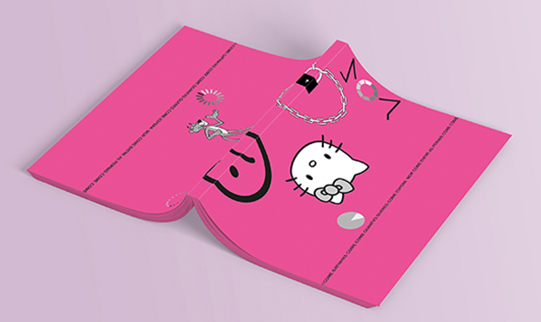
—
Texto | Frank Wedekind
Tradução | José Maria Vieira Mendes
Design | Horário Frutuoso
—
5€
Para mais informações sobre a sua compra
contactar producao@teatropraga.com.
2016 | ZULULUZU newspaper
2016 | Jornal ZULULUZU
2014 | PROPS #7
X
2014 | PROPS #7

PROPS is the new publication by Teatro Praga. “Props” from theater prop, advertisement or slang to show respect. PROPS has no answers or genders, even less a subject of comfort. It addresses a parallel object, because we felt the need of exploring other ways of recording our work and because ours is a shares and collective identity and because we are hyperbolic and megalopsychic. PROPS is the quarterly publication where we publish small essays, texts or images that we are going through in our creation processes.
PROPS #7
TROPA-FANDANGA HANDKERCHIEF
—
5€
For more information regarding its purchase please contact producao@teatropraga.com.
2014 | PROPS #7
X
2014 | PROPS #7

PROPS é a nova publicação do Teatro Praga. “Props” de adereço, propaganda ou slang para mostrar respect. PROPS não tem respostas nem géneros, muito menos tema geral que nos conforte. Trata-se de um objecto paralelo, porque são necessárias outras formas de registar e porque a nossa identidade é uma identidade partilhada e colectiva e porque somos hiperbólicos e megalopsíquicos.
PROPS #7
LENÇO TROPA-FANDANGA
—
5€
Para mais informações sobre a sua compra contactar producao@teatropraga.com.
2009 | LP Demo
X
2009 | LP Demo

O LP Demo, Um Musical, de Kevin Blechdom, Christopher Fleeger e Andres Lõo, foi lançado em 2010 na sequência do espetáculo homónimo apresentado no Teatro São Luiz Theater entre Julho e Agosto de 2009, ainda está à venda na sede do Teatro Praga, a Rua das Gaivotas6.
—
Gravação original de “Demo – A Praga Musical”, apresentado em Julho – Agosto de 2009 no Teatro São Luiz em Lisboa. Um espetáculo do Teatro Praga com a música original de Kevin Blechdom, Christopher Fleeger and Andres Lõo
Colaboração | Vasco Araújo
Desenho de luz | Daniel Worm d’Assumpção
Apoio vocal | Luís Madureira
Choreographical Support | João Galante
Convidado especial | Rão Kyao
Produção | Cristina Correia, Joana Gusmão and Pedro Pires (Teatro Praga)
Co-produção | São Luiz Teatro Municipal / Teatro Praga
com o apoio de O Espaço do Tempo / DeVIR / Goethe Institute / O Rumo do Fumo
Gravação | Joaquim Monte at Namouche Studios in Lisbon, Portugal
Edição / pós-produção | Kristin Erickson, Christopher Fleeger, and Andres Lõo
Mixed by Cristian Vogel at Station 55, Barcelona, Spain
Mastered by LUPO at Dubplates & Mastering in Berlin, Germany
Desenhos para a capa | Pedro Lourenço
Coordenação de artwork | Susana Pomba aka Miss Dove
Fotografia | Tatiana Macedo and Susana Pomba
Design Gráfico | Barbara Says…
—
15€
Para mais informações sobre a sua compra
contactar producao@teatropraga.com.
2009 | LP Demo
X
2009 | LP Demo

O LP Demo, Um Musical, by Kevin Blechdom, Christopher Fleeger and Andres Lõo, launched in 2010 after the homonimous show presented at São Luiz Theater between July and August 2009, is still for sale at Teatro Praga headquarters, Rua das Gaivotas6.
—
Original Cast Recording of “Demo – A Praga Musical”, performed in July – August 2009 at Teatro São Luiz in Lisbon, Portugal. A Show by Teatro Praga with original music by Kevin Blechdom, Christopher Fleeger and Andres Lõo
Collaboration | Vasco Araújo
Light Design | Daniel Worm d’Assumpção
Vocal Support | Luís Madureira
Choreographical Support | João Galante
Special Guest | Rão Kyao
Production | Cristina Correia, Joana Gusmão and Pedro Pires (Teatro Praga)
Co-production | São Luiz Teatro Municipal / Teatro Praga
with the help of O Espaço do Tempo / DeVIR / Goethe Institute / O Rumo do Fumo
Recording | Joaquim Monte at Namouche Studios in Lisbon, Portugal
Editing/Post-production | Kristin Erickson, Christopher Fleeger, and Andres Lõo
Mixed by Cristian Vogel at Station 55, Barcelona, Spain
Mastered by LUPO at Dubplates & Mastering in Berlin, Germany
Cover Artwork and Drawings | Pedro Lourenço
Cover Artwork Coordenation and Editing | Susana Pomba aka Miss Dove
Photography | Tatiana Macedo and Susana Pomba
Graphic Design | Barbara Says…
—
15€
for more informations about its purchase,
please contact producao@teatropraga.com.
2010 | PROPS #5
X
2010 | PROPS #5

PROPS é a nova publicação do Teatro Praga. “Props” de adereço, propaganda ou slang para mostrar respect. PROPS não tem respostas nem géneros, muito menos tema geral que nos conforte. Trata-se de um objecto paralelo, porque são necessárias outras formas de registar e porque a nossa identidade é uma identidade partilhada e colectiva e porque somos hiperbólicos e megalopsíquicos. PROPS é a publicação trimestral onde publicamos pequenos ensaios, textos ou imagens pelos quais vamos passando nos nossos processos de criação.
PROPS #5
THE PRAGA FILES
Esta é a PROPS nº5, a primeira edição de 2010. Desta vez a PROPS é um conjunto de 12 fichas que contêm informação aleatória, ou não tão aleatória, chamada THE PRAGA FILES (Os Ficheiros Praga). Concebida para ser agarrada com as duas mãos e ao estalar de um dedo. A PROPS já foi um saco, uma revista desastre, um livro de desenhos, um cartaz com espaço para spam. Nesta publicação, a familiaridade pode ser apenas obtida na diversidade e surpresa de cada edição. Uma PROPS nunca será igual à outra.
—
Design | Barbara Says…
Uma colaboração entre o Teatro Praga e Susana Pomba.
2010 | PROPS #5
X
2010 | PROPS #5

PROPS is the new publication by Teatro Praga. “Props” from theater prop, advertisement or slang to show respect. PROPS has no answers or genders, even less a subject of comfort. It addresses a parallel object, because we felt the need of exploring other ways of recording our work and because ours is a shares and collective identity and because we are hyperbolic and megalopsychic. PROPS is the quarterly publication where we publish small essays, texts or images that we are going through in our creation processes.
PROPS #5
THE PRAGA FILES
This is PROPS º5, the first issue of 2010. This time, PROPS is a set os 12 index cards with random information, or not so random, called THE PRAGA FILES. Made to be held with your hands and not always on the click of one finge. PROPS has been a bag, a disaster magazine, a book of drawings, a poster with a spam insert. Familiarity in this publication can only be obtained in the diversity and surprise of every issue. Props will never be the same.
—
Design | Barbara Says…
PROPS is a collaboration between Teatro Praga & Miss Dove.
2009 | PROPS #4
X
2009 | PROPS #4

PROPS is the new publication by Teatro Praga. “Props” from theater prop, advertisement or slang to show respect. PROPS has no answers or genders, even less a subject of comfort. It addresses a parallel object, because we felt the need of exploring other ways of recording our work and because ours is a shares and collective identity and because we are hyperbolic and megalopsychic. PROPS is the quarterly publication where we publish small essays, texts or images that we are going through in our creation processes.
PROPS #4
BAG-A-PROPS
—
Design | Barbara Says…
2009 | PROPS #4
X
2009 | PROPS #4

PROPS é a nova publicação do Teatro Praga. “Props” de adereço, propaganda ou slang para mostrar respect. PROPS não tem respostas nem géneros, muito menos tema geral que nos conforte. Trata-se de um objecto paralelo, porque são necessárias outras formas de registar e porque a nossa identidade é uma identidade partilhada e colectiva e porque somos hiperbólicos e megalopsíquicos. PROPS é a publicação trimestral onde publicamos pequenos ensaios, textos ou imagens pelos quais vamos passando nos nossos processos de criação.
PROPS #4
BAG-A-PROPS
—
Design | Barbara Says…
2009 | PROPS #3
X
2009 | PROPS #3

PROPS is the new publication by Teatro Praga. “Props” from theater prop, advertisement or slang to show respect. PROPS has no answers or genders, even less a subject of comfort. It addresses a parallel object, because we felt the need of exploring other ways of recording our work and because ours is a shares and collective identity and because we are hyperbolic and megalopsychic. PROPS is the quarterly publication where we publish small essays, texts or images that we are going through in our creation processes.
PROPS #3
IS A PROP IN PADAM PADAM
This is PROPS º3, an issue entirely dedicated to Padam Padam, a catastrophe performance by Teatro Praga. Padam Padam is the first Portuguese creation integrated within PROSPERO – European Project of Theatrical Collaboration. It opened in Lisbon, Protugal at CCB (Centro Cultural de Belém, September 30th – October 5th 2009) and will travel to Viseu, Portugal (Teatro Viriato), Italy (Modena – Ponte Alto) and France (L’Aire Libre – Saint Jacques de Lande) during 2009 and 2010.
—
Texts | André E. Teodósio, Cláudia Jardim, José Maria Vieira Mendes, Patrícia da Silva, Pedro Penim, Susana Pomba
Design | Barbara Says… with Alexandre Castro
PROPS is a collaboration between Teatro Praga & Miss Dove.
2009 | PROPS #3
X
2009 | PROPS #3

PROPS é a nova publicação do Teatro Praga. “Props” de adereço, propaganda ou slang para mostrar respect. PROPS não tem respostas nem géneros, muito menos tema geral que nos conforte. Trata-se de um objecto paralelo, porque são necessárias outras formas de registar e porque a nossa identidade é uma identidade partilhada e colectiva e porque somos hiperbólicos e megalopsíquicos. PROPS é a publicação trimestral onde publicamos pequenos ensaios, textos ou imagens pelos quais vamos passando nos nossos processos de criação.
PROPS #3
IS A PROP IN PADAM PADAM
Esta é a PROPS nº3, uma edição inteiramente dedicada ao Padam Padam, uma performance catástrofe do Teatro Praga. Padam Padam é a primeira criação Portuguesa integrada no PROPERO – European Project of Theatrical Collaboration. Estreou em Lisboa, no CCB (Centro Cultural de Belém, 30 de Setembro – 5 de Outubro 2009) e irá viajar por Viseu (Teatro Viriato), Itália (Modena – Ponte Alto) e França (L’Aire Libre – Saint Jacques de Lande) entre 2009 e 2010.
—
Textos | André E. Teodósio, Cláudia Jardim, José Maria Vieira Mendes, Patrícia da Silva, Pedro Penim, Susana Pomba
Design | Barbara Says… com Alexandre Castro
Uma colaboração entre o Teatro Praga e Susana Pomba.
2009 | PROPS #2
X
2009 | PROPS #2

PROPS is the new publication by Teatro Praga. “Props” from theater prop, advertisement or slang to show respect. PROPS has no answers or genders, even less a subject of comfort. It addresses a parallel object, because we felt the need of exploring other ways of recording our work and because ours is a shares and collective identity and because we are hyperbolic and megalopsychic. PROPS is the quarterly publication where we publish small essays, texts or images that we are going through in our creation processes.
PROPS #2
DEMO SPECIAL
PROPS is Teatro Praga’s publication. This is the second issue, a DEMO special, a performance premiered at Teatro São Luiz in July 2009. For this special PROPS two creators were invited. Two outsiders and two insiders. Kevin Blechdom and Vasco Araújo participated on DEMO’s creation, Gabriel Abrantes and Pedro Lourenço were only given some hints…
—
Artwork | Pedro Lourenço, Gabriel Abrantes, Vasco Araújo and Kevin Blechdom
Design | Barbara Says… in collaboration with Patrícia Maya
2009 | PROPS #2
X
2009 | PROPS #2

PROPS é a nova publicação do Teatro Praga. “Props” de adereço, propaganda ou slang para mostrar respect. PROPS não tem respostas nem géneros, muito menos tema geral que nos conforte. Trata-se de um objecto paralelo, porque são necessárias outras formas de registar e porque a nossa identidade é uma identidade partilhada e colectiva e porque somos hiperbólicos e megalopsíquicos. PROPS é a publicação trimestral onde publicamos pequenos ensaios, textos ou imagens pelos quais vamos passando nos nossos processos de criação.
PROPS #2
DEMO SPECIAL
PROPS é a publicação do Teatro Praga. Este é o número 2, um especial DEMO, espetáculo estreado no Teatro São Luiz em Julho de 2009. Para esta PROPS especial foram convidados quatro criadores. Dois exteriores, dois insiders. Kevin Blechdom e Vasco Araújo participaram na realização do espetáculo DEMO, Gabriel Abrantes e Pedro Lourenço receberam apenas algumas pistas…
—
Desenhos | Pedro Lourenço, Gabriel Abrantes, Vasco Araújo e Kevin Blechdom
Design | Barbara Says.. com colaboração de Patrícia Maya
2009 | PROPS #1
X
2009 | PROPS #1

PROPS é a nova publicação do Teatro Praga. “Props” de adereço, propaganda ou slang para mostrar respect. PROPS não tem respostas nem géneros, muito menos tema geral que nos conforte. Trata-se de um objecto paralelo, porque são necessárias outras formas de registar e porque a nossa identidade é uma identidade partilhada e colectiva e porque somos hiperbólicos e megalopsíquicos. PROPS é a publicação trimestral onde publicamos pequenos ensaios, textos ou imagens pelos quais vamos passando nos nossos processos de criação.
PROPS #1
DEMO PROPS
—
Textos | José Maria Vieira Mendes, Pedro Gomes–Filho Único, Nelson Guerreiro, Andres Lõo, Susana Pomba
Design | Barbara Says
2009 | PROPS #1
X
2009 | PROPS #1

PROPS is the new publication by Teatro Praga. “Props” from theater prop, advertisement or slang to show respect. PROPS has no answers or genders, even less a subject of comfort. It addresses a parallel object, because we felt the need of exploring other ways of recording our work and because ours is a shares and collective identity and because we are hyperbolic and megalopsychic. PROPS is the quarterly publication where we publish small essays, texts or images that we are going through in our creation processes.
PROPS #1
DEMO PROPS
—
Texts | José Maria Vieira Mendes, Pedro Gomes–Filho Único, Nelson Guerreiro, Andres Lõo, Susana Pomba
Design | Barbara Says
2023 | To be Shakespeare or not to be Shakespeare – that’s the question…
X
2023 | To be Shakespeare or not to be Shakespeare – that’s the question…
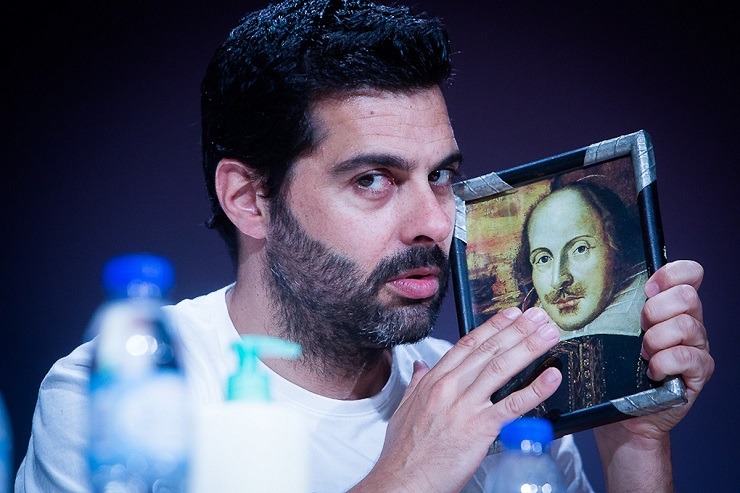
Cláudia Jardim and Diogo Bento are two of the artists responsible for creating Hamlet Sou Eu (2007), Romeo and Juliet (2017) and Macbad (2021), a trilogy dedicated to three Shakespearean tragedies full of death, murder, blood and revenge, which bring together a universe of bloodthirsty fatality that is usually far removed from younger audiences. They are also three works built on three classics of Western dramaturgy considered untouchable and calcified by academic studies and by the scenic approaches that have been presented over time.
One of the main challenges that has always guided them has been to make these texts accessible to young audiences. How do you arouse interest in works that are over 400 years old? Are the so-called classics timeless? What to do with the divergence of the zeitgeist? Do these narratives still make sense today? These were some of the questions they faced and tried to answer with the creation of the three shows.
It is precisely on the basis of these questions and the confrontation between the shows and the public that they propose to talk about, problematise and structure some conclusions based on their experience. For lovers of the classics, for sceptics steeped in post-modernity, but above all, for anyone who swings between the two extremes and who is interested in new approaches to the canon, wants to share doubts, develop theses, come up with some ideas and refute them in order to start everything all over again.
—
For more info and bookings, contact producao@teatropraga.com
2022 | 20 000 MINUTES
X
2022 | 20 000 MINUTES
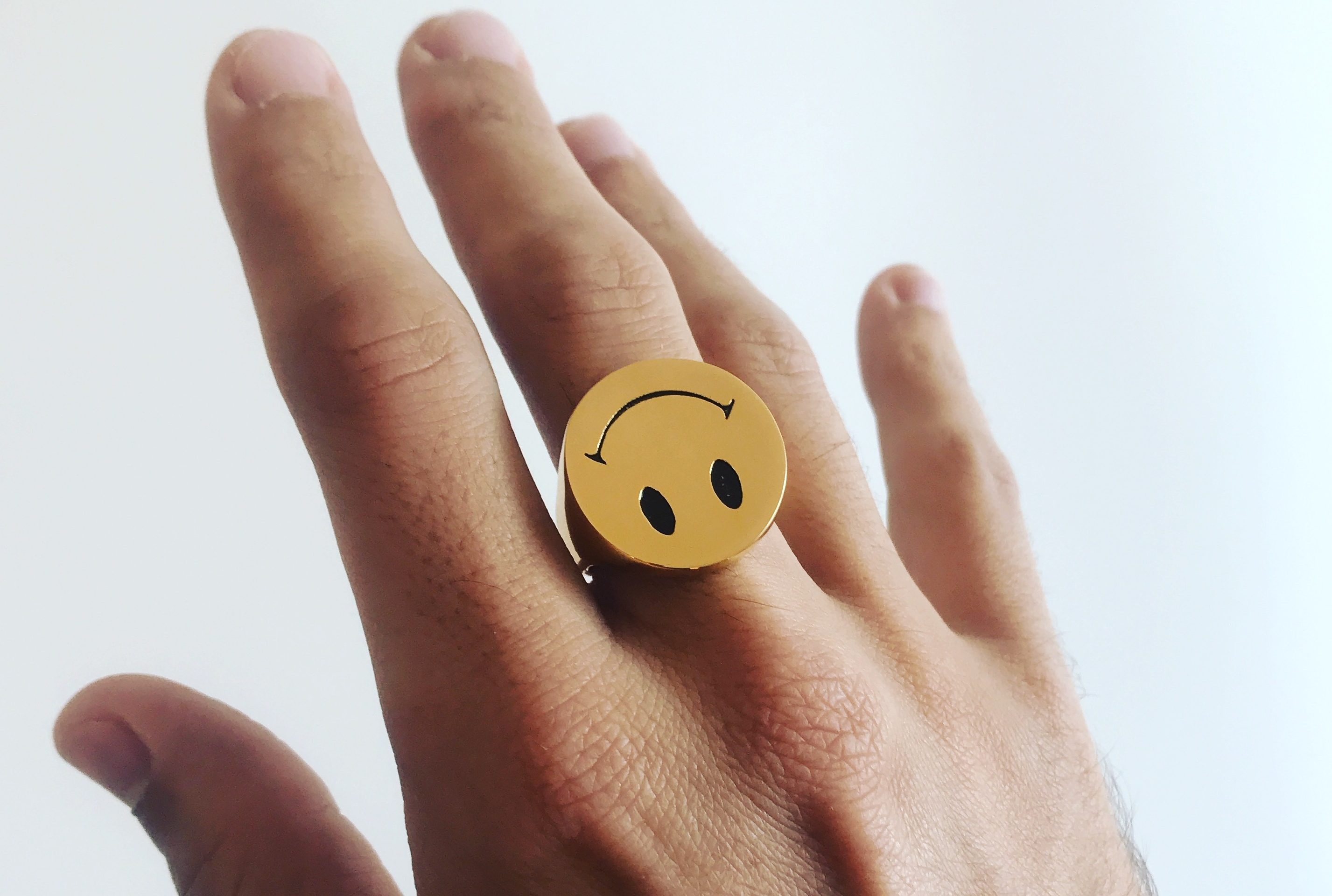
What is the relationship between lectures on performance history, collective processes, identity politics and film screenings, meditation, trips to the gym and sauna? 20.000 MINUTES of f(l)ama!
20.000 MINUTES comes from an invitation by Teatro Municipal do Porto Rivoli to André e. Teodósio/Teatro Praga for the elaboration of an experimental educational laboratory which aims at thought and creation of experiences in the performatic field. The program, consisting of two weeks, is composed of training modules and moments for development of work.
The training modules will consist of content around performativity and will be the responsibility of historians Joacine Katar Moreira, Pedro Faro and Ana Bigotte Vieira, artist Diana Niepce, programmer Francisco Frazão, and “haptic” content, which follow the teaching “healthy head in a healthy body”, which includes everything from the viewing of performances to meditation practice. During these two weeks, the participants will develop parallel works whose creation will be tutored by André e. Teodósio. These works will be presented to the public. Or not!
20.000 MINUTES is a kind of house of secrets without secrets, where information will short-circuit both heads and bodies. 20.000 MINUTES today can change eternity.
.
Tutor: André e. Teodósio
Guest professors: Ana Bigotte Vieira, Diana Niepce, Francisco Frazão, Joacine Katar Moreira e Pedro Faro
Production: Teatro Municipal do Porto e Teatro Praga
. (c
Laboratory between 10 to 24 September 2022
Aimed at finalist students of Porto artistic schools: ACE – Escola de Artes; Balleteatro; ESMAE – Escola Superior de Música e Artes do Espectáculo; ESAP – Escola Superior Artística do Porto
.
.
2019 | WHAT IS CULTURE FOR?
X
2019 | WHAT IS CULTURE FOR?
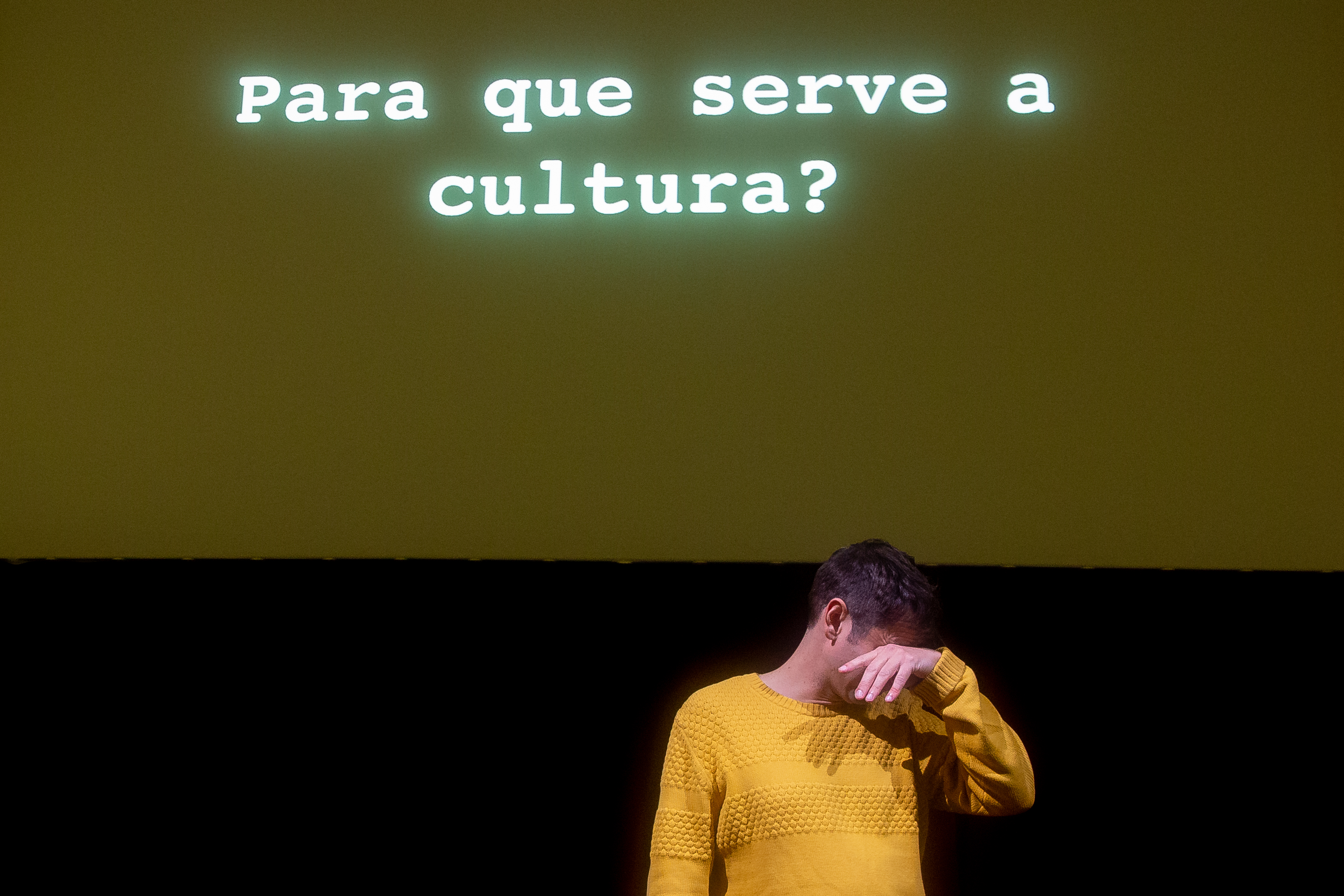
In 2019, José Maria Vieira Mendes was invited by Teatro LUCA in Lisbon to give a conference for children dealing with the question “What is culture for?”. From this conference came later a book published by Planeta Tangerina, with illustrations by Madalena Matoso and with the title ‘Para que serve?’, a book that has since been translated in different countries and recently selected by the prestigious White Raven 2021 catalog, of the International Youth Library of Munich, the world’s largest international library of books for children.
This conference can be experienced with different alignments and in different formats. Either trying to deal with the broader question (“What is it for?”) or asking about the usefulness of “culture” (“What is culture for?”). Sometimes using the “conference” format, sometimes using the “conversation” format, in an informal dialogue model.
Whatever the format or the alignment, its interest will always be to introduce thought, philosophy and the idea of questioning to the younger generations, in a playful and uncomplicated way. One tries to understand where the questions come from, and for that one questions the questions. Does it make sense to ask culture what it is for? There are questions that don’t make sense. For example: How many arms does a table have? It doesn’t make sense. If we ask questions to the questions we can better understand if they make sense and it becomes easier to imagine their answers.
:
Age group +9
Approximate length 40 minutes
(c) Alípio Padilha
2019 | DICTIONARY
X
2019 | DICTIONARY

From the dramatic text DICIONÁRIO, José Maria Vieira Mendes guides a workshop in which the participants read the piece together and discuss it, taking advantage of the conversation to think about the way we read dramatic literature and how we relate to the themes suggested by the text.
DICIONÁRIO, by José Maria Vieira Mendes, intends to reproduce the experience that is not only that of a growing young person, but that lasts for life. It is about the experience of having to deal with opinions about our being, and wanting to give an opinion about the others’ being. Max, the silent protagonist of this play, will meet people who will propose other ways of “entering”, “leaving”, “dancing”, “telling”, “doing” or “living”, as if life was a dictionary and being in it was an attempt to match the definitions. But if the goal is to try to tame and grab Max, the result will be to lose him.
.
Audience
School audience: 13-18 years
General public: Reading groups, amateur theatre groups
(c) Mário Negrão
.
2018 | ASSISTED DIRECTION 0.2
X
2018 | ASSISTED DIRECTION 0.2
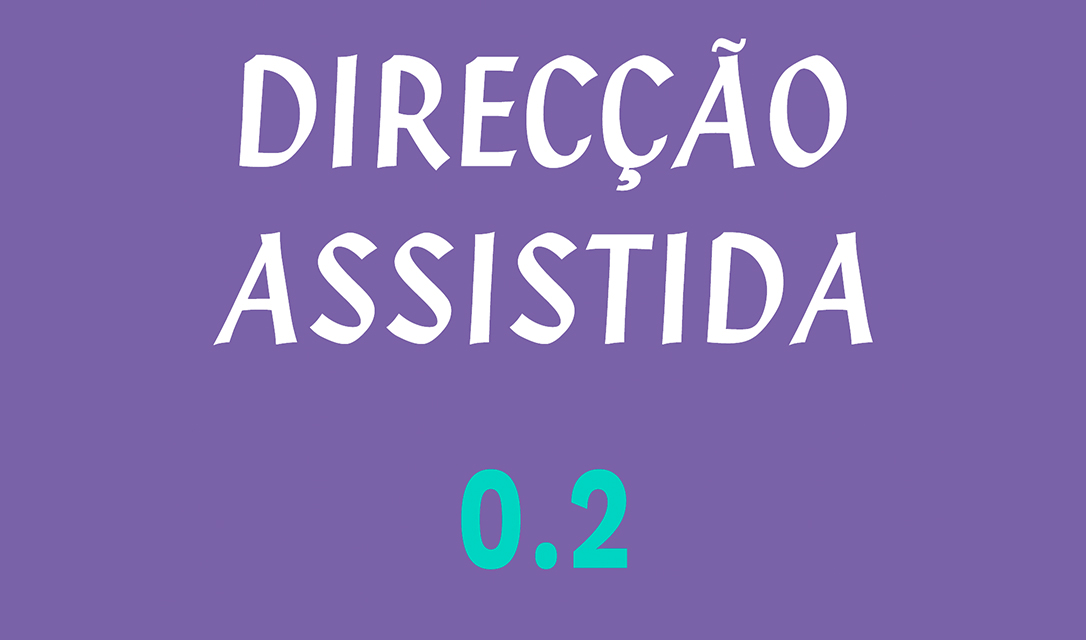
It is relatively common for venues to offer moments of gathering between artists and spectators, creating the right environment for a dialogue between who sees and who creates and makes. Rua das Gaivotas 6 and Teatro Praga’s proposal is a cousin of the first, but it intends to shield the artists from the audience and the other way around, making room for a continuity of the performance, which is not limited to the act of seeing and feeling.
That’s why we invite the viewers to form an “Assisted Direction” for 3 shows, between May 11 and June 2. After attending the shows (May 11 and 18 and June 2), the participants gather in a room and talk, under the guidance of José Maria Vieira Mendes, without secrets and in secrecy.
These posthumous moments allow confessions, exposure of affections, statements of taste, baring in mind that the intended goal would be to contribute to the awareness or the understanding of the choices, the interests, and the wishes of those who watch. The point should be that, during the talk about a performance, one may enrich the speech, thought and reasoning of our interests.
—
May 11
AURORA NA AREIA | Aurora Pinho
May 18
ENTREVISTAS | Tiago Cadete
June 2
LUMI | Marko Milić
2018 | TODAY’S THE DAY
X
2018 | TODAY’S THE DAY

On World Theatre Day in 2017, Teatro Maria Matos issued the challenge: to create a theatrical laboratory at a secondary school in the city of Lisbon. Almost a year later, a group of students from the Escola Secundária Dona Filipa de Lencastre have been working under the artistic direction of Pedro Penim on the project entitled Today’s the Day.
Throughout the academic year 2017/2018, Pedro Penim directed the artistic and pedagogical project, which objective was the practical experimentation of the artistic areas that work in the current context of performative and theatrical creation. The final exercise will be presented on June 5 at the school.
“A group of adolescents meet every week to engage in theatre.
Today (Monday) is the day.
It’s the day when we talk about plurality and the day when we create identities and various chronologies of various lives (of human beings? of characters? of unicorns?).
Today’s the day when we enter into a kind of confused post-historical time, filled with various “nows”, but always passionate, because today we are passionate.
Today’s the day when we talk about “invisible dictatorships”, which are basically all the (theatrical and artistic) mechanisms that, without our thinking about them (and because they are invisible), cause us to become hidebound by certain concepts that rule and inform theatrical creation, a total act that is at the same time (and simultaneously) so free and so regulated.
Today’s the day when we breathe and vocalise.
Today’s the day when we explore the idea of artistic community and, at the same time, the need to find an individual space, and when we try to create an aesthetic and ethical domain with the aim of looking for theatrical paths that transcend all boundaries and cause myths to be broken.
And we go on searching, confronting ideas and creating both individually and collectively: and on this day one of the participants takes full responsibility for all creative acts. Because what we want is for this personal involvement and dedication to be reflected in the process and in the result, which we will present “one day”…”
Pedro Penim
—
Training and direction | Pedro Penim
Guest trainers | André e. Teodósio, João Pedro Vale & Nuno Alexandre Ferreira and Vera Marmelo
Participants | Carlota Fialho Tojo, Helena Mascarenhas Santos, Francisco Oliveira, Marta Figueira, Maria Andrade, Nina Matos, Madalena Carvalho, William Greer, Mariana de Pratt Maques, Maria Inês Louro Rodrigues, Inês Otero Rondão, Hugo Jorge, Lucas Fróis
Associated professor | Teresa Barros
2017 | ACCRETION
X
2017 | ACCRETION

ACCRETION, Teatro Praga’s first cycle of performances, tries to do justice to the artistic and cognitive processes that were fundamental to the group’s development both on an affective scale and on a spatial scale, ecologically and without hierarchies. In ACCRETION, Teatro Praga appropriates performances, delegates their work and pays tributes to figures of the performing arts absent in most historical discourses. The truth of having lived side-by-side and at same time with these performances, the desire to inscribe them in themselves and the desire to reactivate them led Teatro Praga to perform for the first time in its space ruadasgaivotas6, reenacting their “favourite things” and appointing their performances to other artists.
This cycle’s programme consists on 4 reenactments and also NEW PORTUGUESE CONVERSATIONS, an archive-debate (with Mónica Calle, Paula Sá Nogueira, Isabel Carlos, Cristina Peres and Mónica Guerreiro) about important Portuguese creators of the so-called “trapped generation” who contributed to the inscription of new performative languages.
CATECHISM
X
CATECHISM
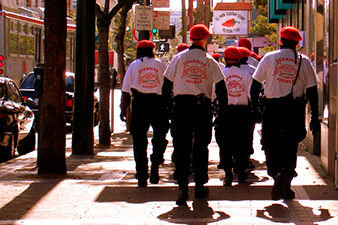
CATECHISM wants to open itself as a moment for thinking, a mixture of doubtful intimacy and intolerant preaching, served by periods of action in the old Greek spirit and artistic jumps. The classes in this course are art full of itself, where we will manage incompatible egos, who are absolutely certain of everything that they violently deny the day after. It’s a prelude of university, inspired by the ignorant master and not by the old wise professor. We will not be together. There is no such thing as sharing a meaning and a generous interactivity. There isn’t even the slightest hope of understanding each other. We are opening a department for comunication with no guarantees. The participants are expected to take the initiative, to read, listen and adore, because without faith you can’t move the sea or conquer the world. The ambition is enormous so that the fall may be more vertiginous.
2014 | MYTHOLOGICAL CONFERENCES
X
2014 | MYTHOLOGICAL CONFERENCES
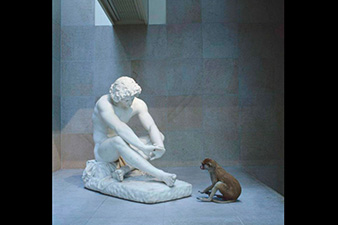
Mythological Conferences is a project by J. M. Vieira Mendes. Based on the form of conference, the author will follow part of the investigation, which he has been developing for the past three years, on the history of theatre and dramatic literature and the sequence of myths or narratives that were built by critical theory and by the artists themselves culminating in a contemporaneity which, in many occasions, reveals little clarification and loses itself in paralizing disputes.
2014 | EURO-NEURO
X
2014 | EURO-NEURO

Every day we have to face our European legacies. In the streets, when we celebrate our birthday, when we watch the Olympics, when we go to an exhibition, when we fight, when we say words of love… George Steiner once wrote that Europe must learn how to deal with the legacies of Greece and Israel (i.e. the inventions of reason and faith) and that being a European is an attempt to negotiate morally, intellectually and existentially with the ideals and the praxis of the cities of Socrates (Athens) and Isaiah (Jerusalem), with the tension between Hellenes and Jews. Europe is a big house, a place of memory and comfort. But it also holds a history of famine, ethnic cleansing, genocide, torture, wars and epidemics. It’s true we feel protected and warm in our homes, under this common roof. However there’s a shadow hanging over this region. There is a dark side to this sovereignty of memories, this self-definition of Europe as “lieu de mémoire”. Together with the participants we will explore these relations between Athens and Jerusalem, past and present, attempting to create texts, scenes, theory and ideas around our own work and universe, and to create a possibility of a performance where Europe’s nerve (neuron/ νεῦρον) will be fought, discussed and negotiated.
2013-2014 | WORKSHOP CYCLE
X
2013-2014 | WORKSHOP CYCLE
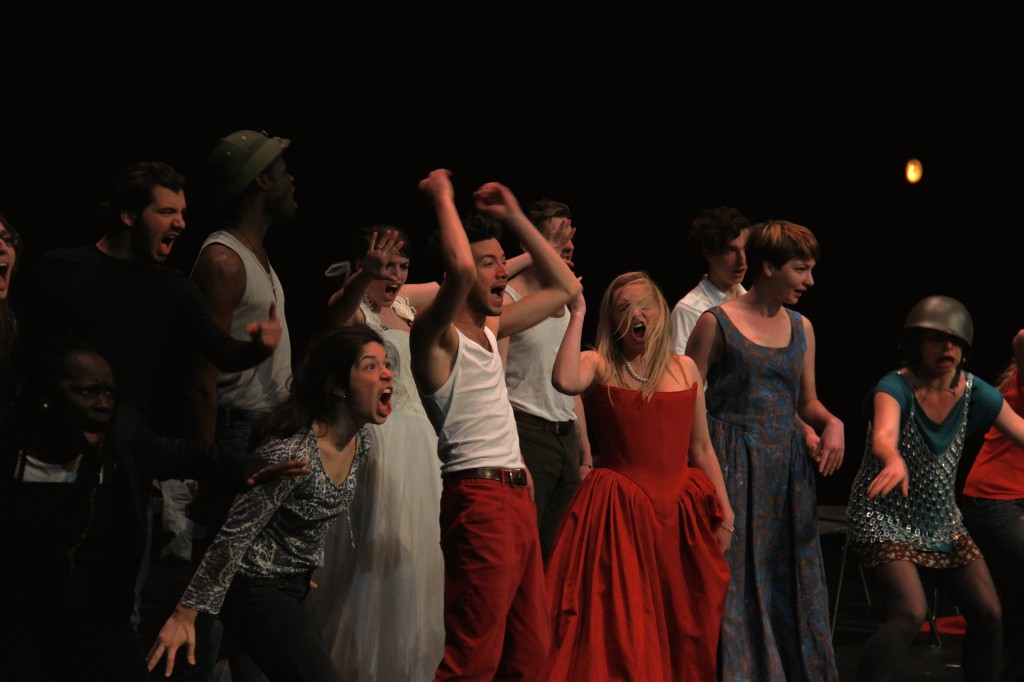
The workshop cycle Chroniques du Bord de Scène, promoted by MC93, provides a space for learning and meetings in which guests from various areas of the performing arts explore a theme with the students of French theater conservatories.
In this sixth season, Pedro Penim and José Maria Vieira Mendes were challenged to direct a masterclass with students from the Conservatoire de Bobigny, Pantin and Aubervilliers / La Courneuve.
After a week of work at the end of 2013, in which we worked around issues such as what an actor, a person, a show and a text, with some practical exercises from the original text of José Maria Vieira Mendes, Seniors, students and members of the Prague Theater met again for another two weeks in April 2014 to prepare a public performance for April 18 and 19, 2014 at the MC93 theater.
The show, the result of this work, was presented again, in an exceptional capacity and by the students’ will, in June 2014 at the Théâtre Fil de L’Eau in Pantin (Paris).
2013 | ONCE UPON A LIE…
X
2013 | ONCE UPON A LIE…

The world is a mess and so are we!
Although undeniable that we all have a sense of identity and are proud of ourselves, it is also true that time and again we leave our comfort zone: no, after all I won’t have chocolate ice-cream; in the end I didn’t get sick after five long hours stuck on traffic, in spite of being dead tired I didn’t sleep a wink. We are many things, we are made of many desires and wishes, we are of many colours, in short: we are peculiar.
But what comforts us in the middle of all the confusion, is knowing we are not alone. Rather we are in quite good company. Because even the charming princes and beautiful princesses have their own problems and quirkiness, the things that stay underneath, that they forget to share with the rest of us. Because they eat, make love, cut classes just like we do, they too have problems in expressing themselves or are as awkward as the rest of us, they too can’t reach the ATM machine, are sick from time to time, take pills, get motion sick in cars, quarrel with their siblings, fight in civil lawsuits, our knights in shining armour, our Cinderellas, Snow Whites, Little Mermaids, Thumbelinas and Red Riding Hoods have so much to tell, so much more we don’t know.
And that is the reason we need a show about all this. And the show is called… Once Upon a Lie
Following an invitation from the Pavilion of Knowledge in the context of its new exhibition Once Upon a Time… we decided to expose the other side of the characters. To see Alice and all our other fantastic friends on the other side of the mirror, revealing their intimacy.
Once Upon a Lie… will help us replying to those who repeat the usual spiel all the time: everything you say to me is fabulous, but it is just not right. I’ll tell you how it is!
—
A show from Teatro Praga
Concept | André e. Teodósio, J.M. Vieira Mendes, Pedro Penim
Cast | Cláudia Jardim, Diogo Bento, Diogo Lopes, Patrícia da Silva, Pedro Penim, Joana Barrios
Light design | Daniel Worm d’ Assumpção
Scenography and props | Bárbara Falcão Fernandes
Production | Elisabete Fragoso, Catarina Mendes
Running time | 20 minutes
2013 | OLD AGE . WORKSHOP
X
2013 | OLD AGE . WORKSHOP

Along with the show Old Age, José Maria Vieira Mendes offers to discuss the play he wrote under the same name, as a pretext for a conversation on the relation between text and show or theatre and literature, and also of actors and writers, of prejudice and hegemonies, of freedoms and warranties, of feeling with money, of dictionaries and grammar, or births and deaths, or books and videoclips, of pencils and pens, of dichotomies and parataxis and so on.
This workshop follows the model of the series of workshops and activities Teatro Praga develops under the name Catechism.
2013 | ISAAC
X
2013 | ISAAC
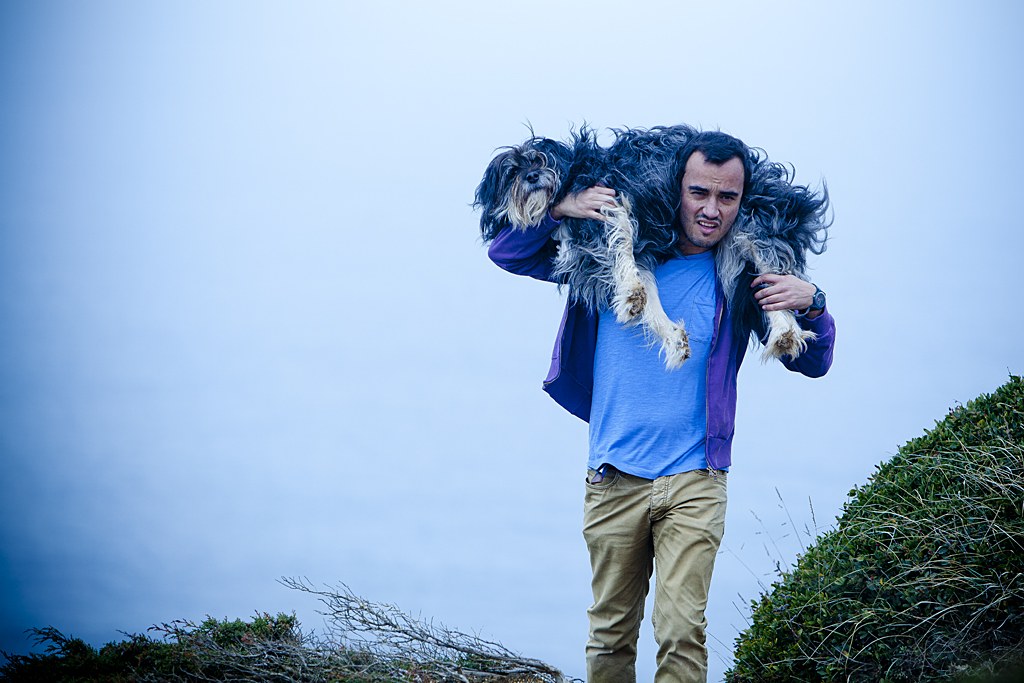
God said to Abraham Kill me a son…
Abe said: where you want this killing done?
Bob Dylan, Highway 61 Revisited
How can we perform a show about “animal rights” without being fondly paternalistic? How can we tell a story as ancient as the world, as essential as oxygen, without being boring? How can we talk about our civilizational inheritance, a legacy that passes on from parents to children and leads us to assume responsibilities about the world’s future? ISAAC’s plot aims to answer these questions, taking the form of one of Walt Disney’s older movies. It is a show that uses the classical to try and take a step forward. The story counts on three crucial contributions: each spectator will assume the role of Isaac. Pedro Penim will play the father. And Rita, our dog, will take the unexpected role of the sheep.
—
Text | Pedro Penim, André e.Teodósio
Direction | Pedro Penim
Performance | Pedro Penim and Rita
Voice | Eduardo Gaspar
Set Design | Bárbara Falcão Fernandes, Joana Mendo
Set Design Assistant | Ricardo Santanna
Light Design | Daniel Worm d’Assumpção
Sound Assistant | Miguel Mendes
Handler | João Vasconcelos (Bocalán)
Photography | Alípio Padilha
Production | Filipa Rolaça, Cristina Correia, Francisca Rodrigues, Elisabete Fragoso
Co-production | CCB, Fábrica das Artes, Teatro Praga
2012 | KINGS’ TALES
X
2012 | KINGS’ TALES
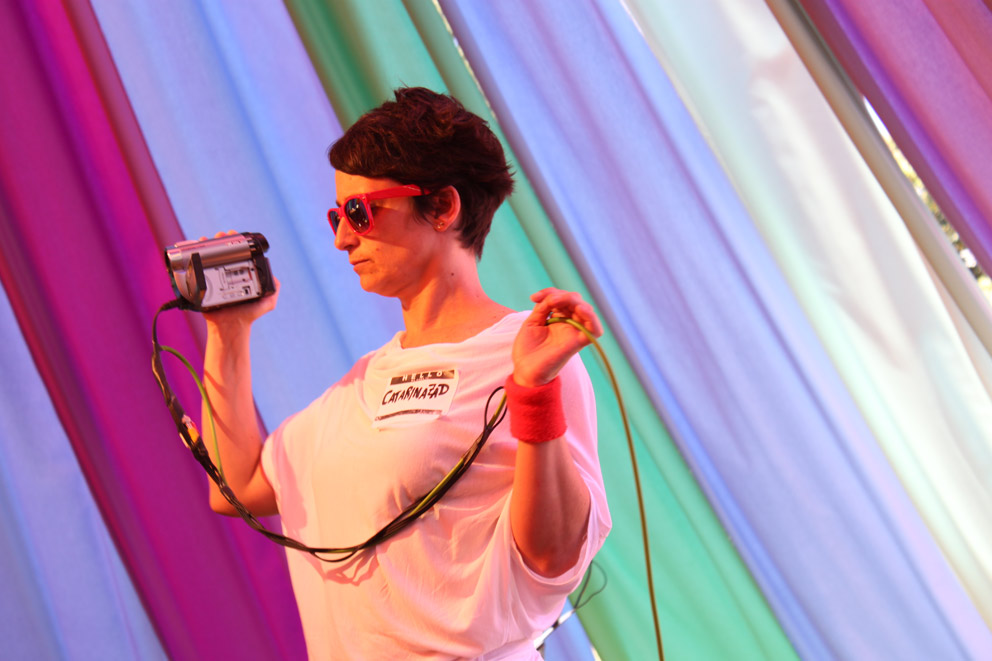
In this proposal of the Teatro Praga, the Arabian “OneThousand and One Nights” are Tales of Kings which are worth gold but are exchanged ‘for nickels’.
Right in the middle of the Gulbenkian Gardens, four stories, told by two pairs of actors, guide the spectators by the narrative suggesting them and encouraging them to participate actively. After having formulated the narrative assumptions, having the characters been presented and the plot summarized with speed and simplicity, they transform the imagination into a theater and dress the spectators of heroes, enemies, thieves, princesses and monsters. With only a poster, a rug or a turban, the scenery is done with little, but everyone can get into the story, say the magic words and be Ali Baba, Aladdin and the Prince Bright. The proposal of the Theatre Prague is a game of discovery and representation that approaches the stories of those who hear them, turning the spectators into tellers.
—
Cast | André e. Teodósio, André Godinho, Catarina Campino, Diogo Bento, Joana Barrios, J. M. Vieira Mendes
Production | Cristina Correia
2011 | KILLER GIRLS
X
2011 | KILLER GIRLS
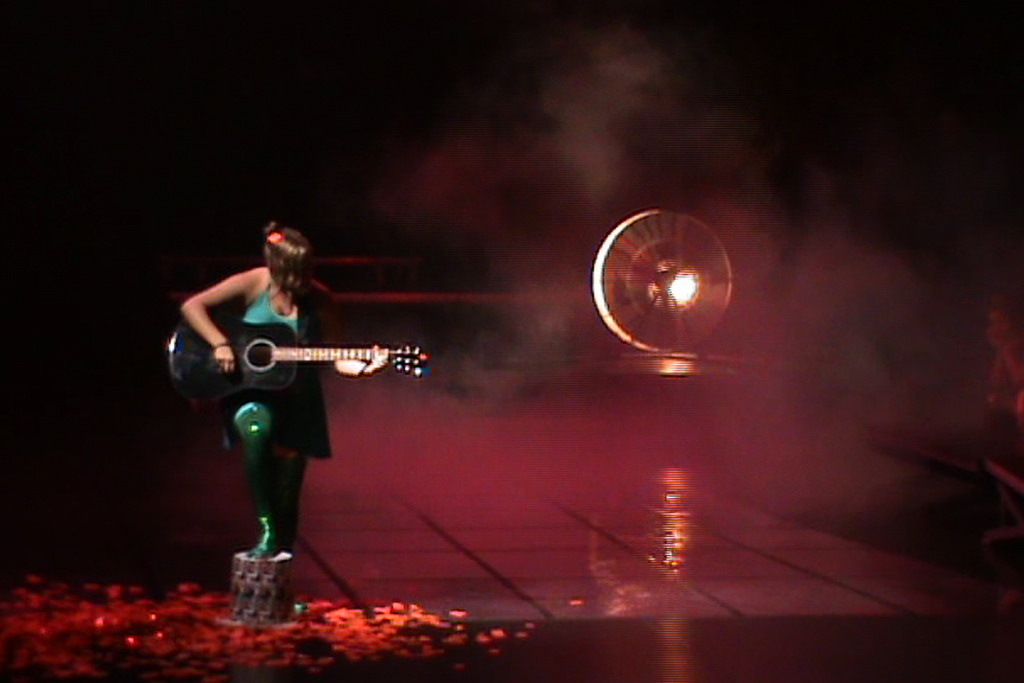
“The true hero is always a hero by mistake; he had the dream of becoming an honest coward like everyone else.” Umberto Eco
We started by choosing super-powers, our suits and new names for super-heroins. We took advantage of our biggest flaws: the invisible woman was the teenager nobody ever noticed and who learned that invisibility could be a super-power. We created our alter-egos and we got back at the times we were told “you are not allowed”, “you can’t do it” and “this is not for you”.
KILLER GIRLS is a Girl Power show, a catsuit party, a time-bomb. The countdown has started… We kill our fears “live”, we fight and run in high heels. We are not going to give up. This time, even if we are told this is not for us, we show you our middle finger, we stick our tongue out and we take it to the end. We are the boss now. Let’s party! KILLER GIRLS is a party and since it’s our party, we cry if we want to!
—
A show by Teatro Praga
With | Andreia, Catarina, Cristina, Joana, Katie, Lena, Marta, Matilde, Raquel, Sara, Sílvia e Vanessa
Created by | André Godinho, Cláudia Jardim
Vídeo | André Godinho
Set Design | Filipe Carneiro
Production | Cristina Correia
Co-Production | Teatro Viriato
2010 | DO YOU GET THE PICTURE ?!
X
2010 | DO YOU GET THE PICTURE ?!
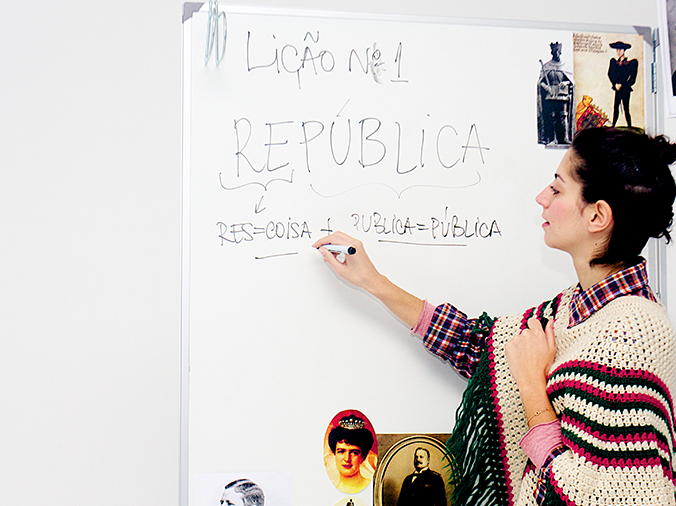
Performance for teenagers (between 10-15)
What was the First Republic? How many where they? Who was it? During 16 years there were 7 Parliaments, 8 Presidents and 45 Governments.
It’s 1000000 years concentrated in 16. Living. Killing. Dynamite. It’s time for the overly. For the excessive. For speed. Stories after stories.
What if we resume the 16 years that seem like 1000000 in 60 minutes? What if we go beyond the speed of the Republic, of the revolution, the horses, the troops, the wars, the governments e parliaments, the birthdays and party rockets, what if we where faster than everyone and shuffle the order around, stop at the accessory and complicate the story?
We’re going to reject the linearity and make drawings, sketches. We’re going to explain the Republic without explain. We’re going to play ignorant teachers and swap the bomb wires. Nothing more to say, because everything will always stay to be told. Two actors, some props, a board to write on, some pictures to illustrate. Music and motion. We’re going to sweat.
—
Co-creation | José Maria Vieira Mendes and Pedro Penim
Cast | Joana Barrios and Luís Filipe Silva
Scenography | Bárbara Falcão Fernandes
Production | Catarina Mendes, Cristina Correia, Pedro Morgado
Co-production | Teatro Praga, Comédias do Minho, Centenary of Portuguese Republic
Running Time | 50 minutes
2009 | JACK THE DRIPPER
X
2009 | JACK THE DRIPPER
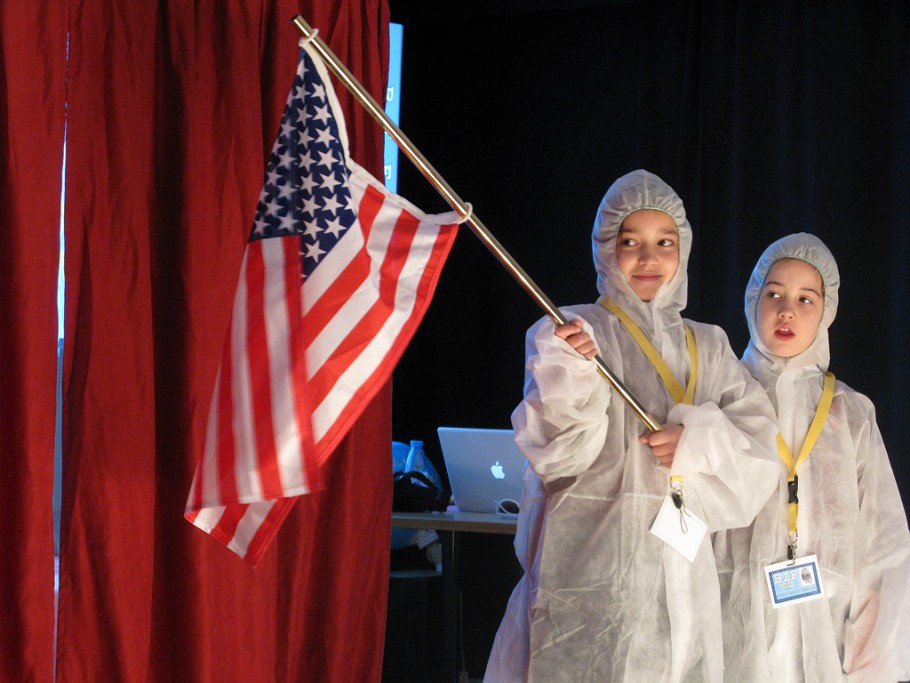
Jackson Pollock, American deep into the world: the ultimate elliptical incursion by the process of meteoric rise, fall and bounce of abstraction from that drunk was probably the greatest American painter of the twentieth century.
What is the importance of the accident in Western art?
What is the importance of the West in accidental art?
In Granda Pinta [Jackson Pollock, (…) probably the greatest American painter of the twentieth century] you, little detective, you’ll be able to investigate the body of the works of the serial painter Jackson Pollock. Following the clues and formulating hypotheses, uncover at autopsy that the abstraction may not be more than a victim of “aesthetics materialization of the accident”…
Enlist yourself on our forces of elite and come to unravel this suspect theory.
Let’s take the Action Man in action!
Who is not with us is against us…
—
A show by Teatro Praga
Cast | Catarina Campino, Cláudia Jardim, Pedro Penim
Production | Joana Gusmão, Pedro Pires (Teatro Praga)
Co-production | Teatro Praga, Teatro Maria Matos (Educational Project)
2008 | ANITA GOES NOTHING
X
2008 | ANITA GOES NOTHING
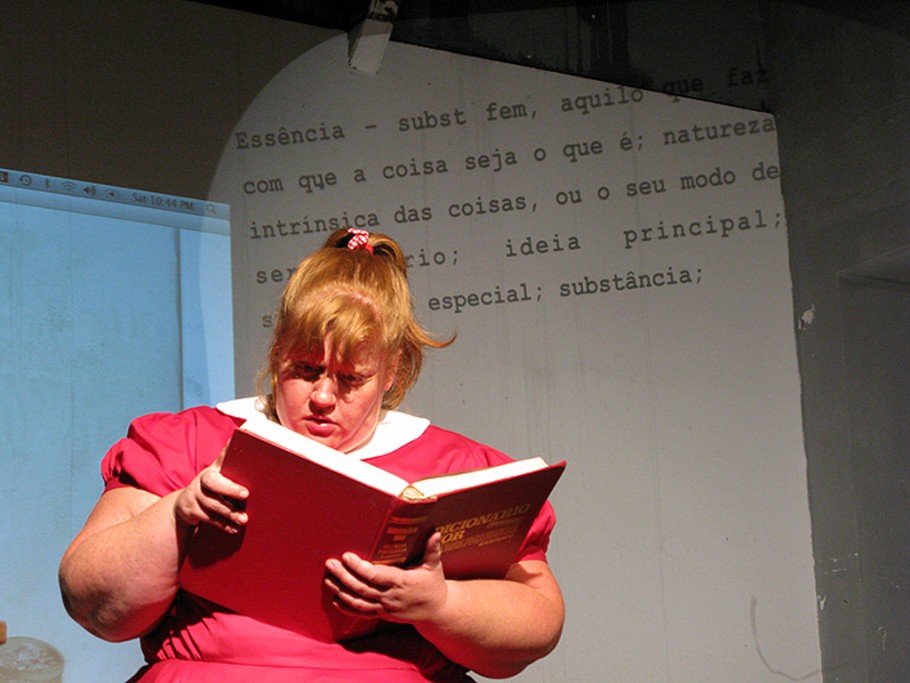
ANITA loves the mountain, the sea, the nature and she also likes to play with dolls. Anita is sociable, a loyal companion, a dynamic person, young and lovely. Anita is perfect.
Anita was born in 1954 but she’ll always be young and pretty and she never needs Botox or Prozac or moral support. ANITA always wears nice lingerie bought at petit bateau. And she has very expensive toys.
Anita is the best at everything, she always knows everything and she’s got the right attitude. Anita can do anything and does everything, because Anita has everything. And if she can do anything, then we can too, because Anita is the hero hidden inside every one of us.
—
A show by | Cláudia Jardim, Patrícia Portela
Lighting | Teatro Praga
Production | Joana Gusmão, Pedro Pires
Costume Designer | Mestra Teresa Louro
Photos | Susana Pomba
Running time | 50 minutos
Co-production | Teatro Viriato, Teatro Praga
Collaboration | Galeria Zé dos Bois, Serviço Educativo
2008 | SUPERNOVA
X
2008 | SUPERNOVA
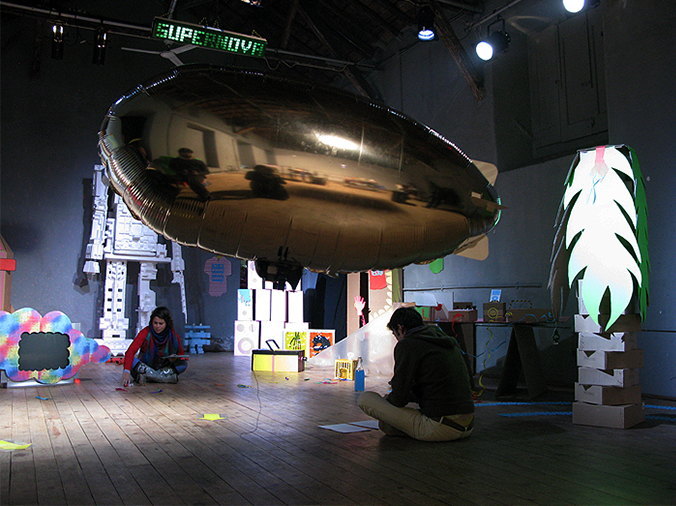
They live in the kingdom of Megalopsychia and they have different shapes. Their life as competitive spatial gladiators la a target: F (for Future). To get there, the Supernovas are always trying to bring down the monster/master… and frequently burning themselves. Although lay said they’re an endangered species, we hope they won’t give up. For further information lay MegalopsychoLandia™ and introduce the code L (Life) = 365 in your consoles.
—
Created by | André Godinho and André e. Teodósio
With | Patrícia da Silva
Lighting | Teatro Praga
Production | Joana Gusmão, Pedro Pires
Photos | Susana Pomba
Co-production | Teatro Viriato, Teatro Praga
Collaboration | Galeria Zé dos Bois, Serviço Educativo
